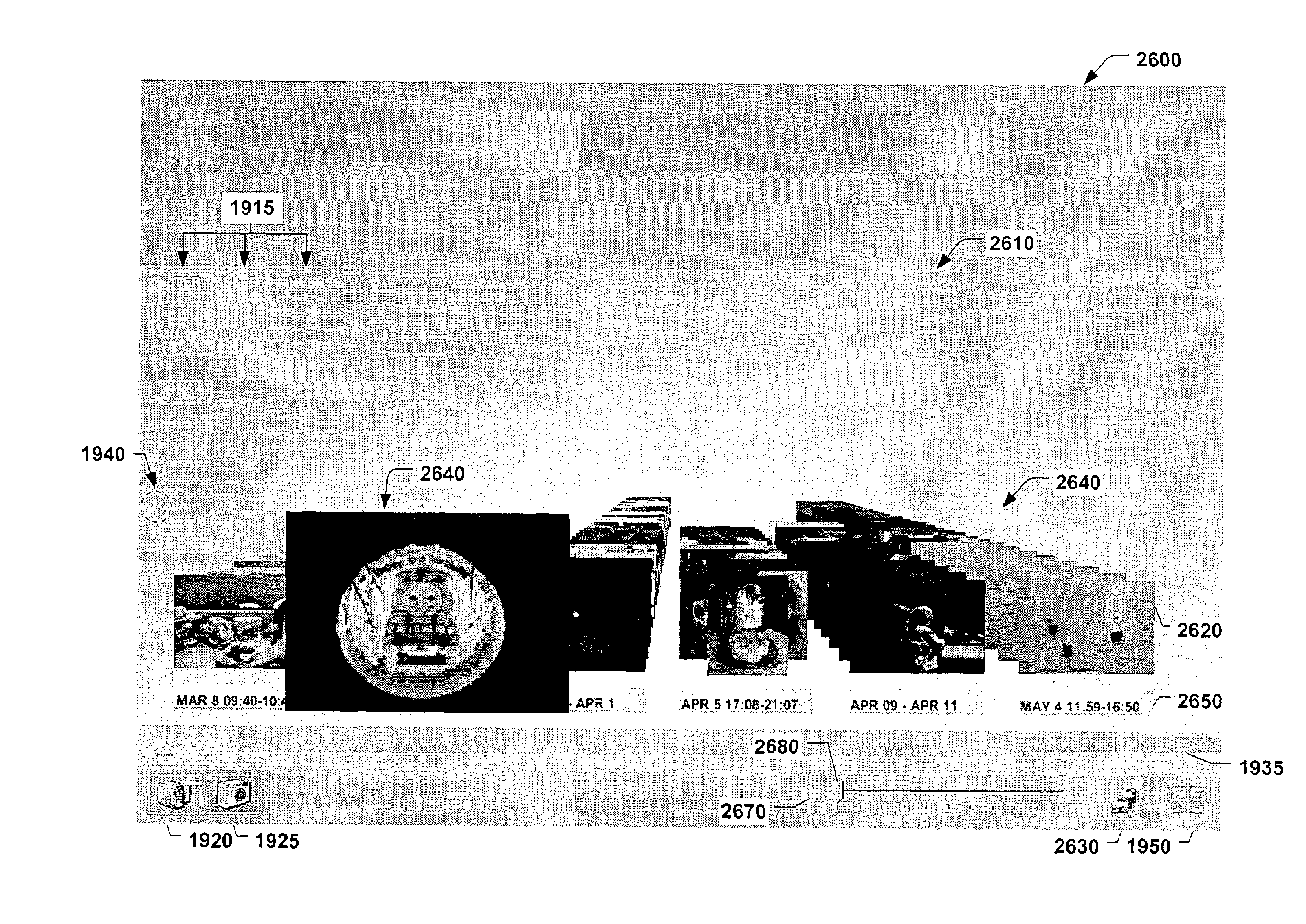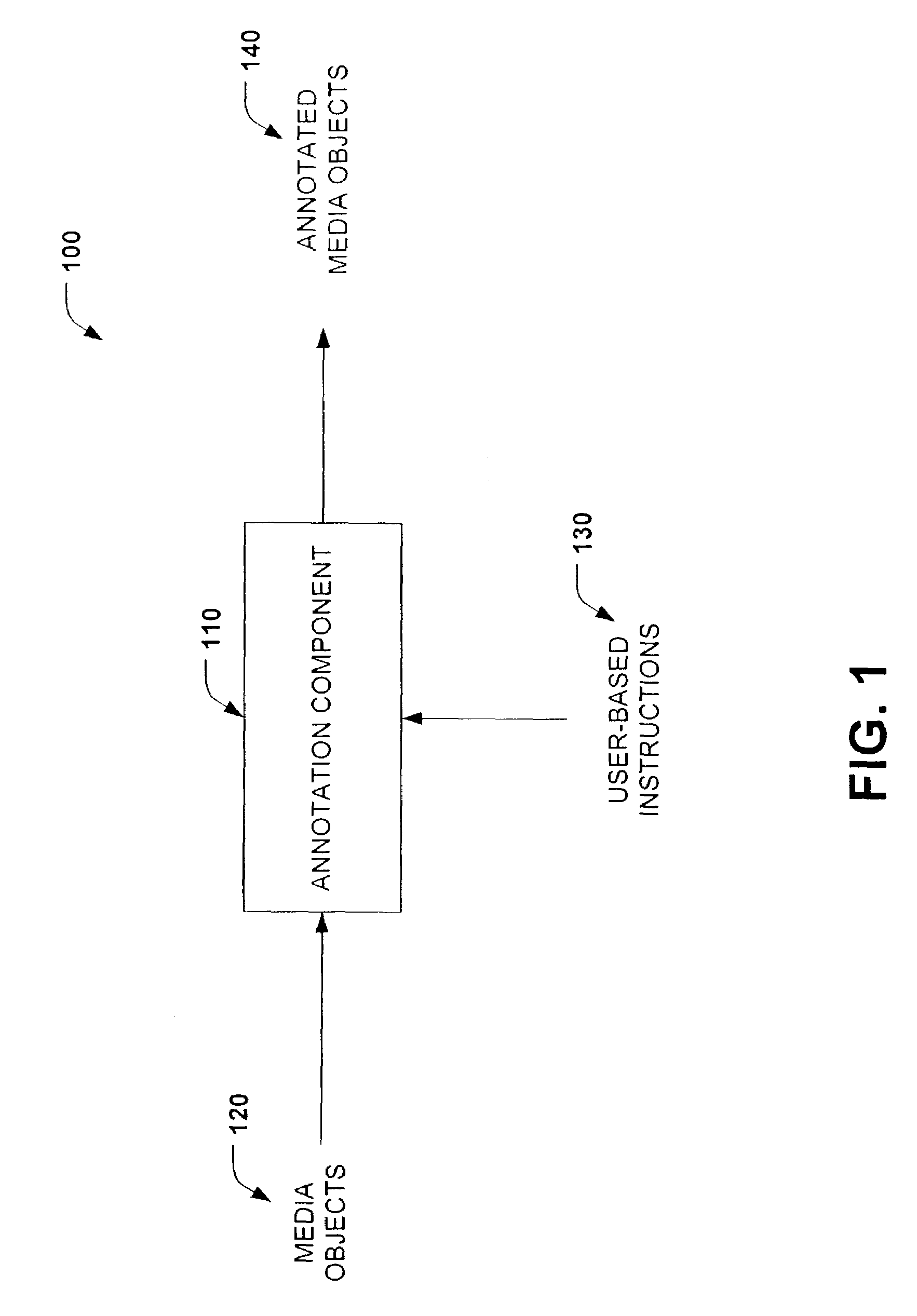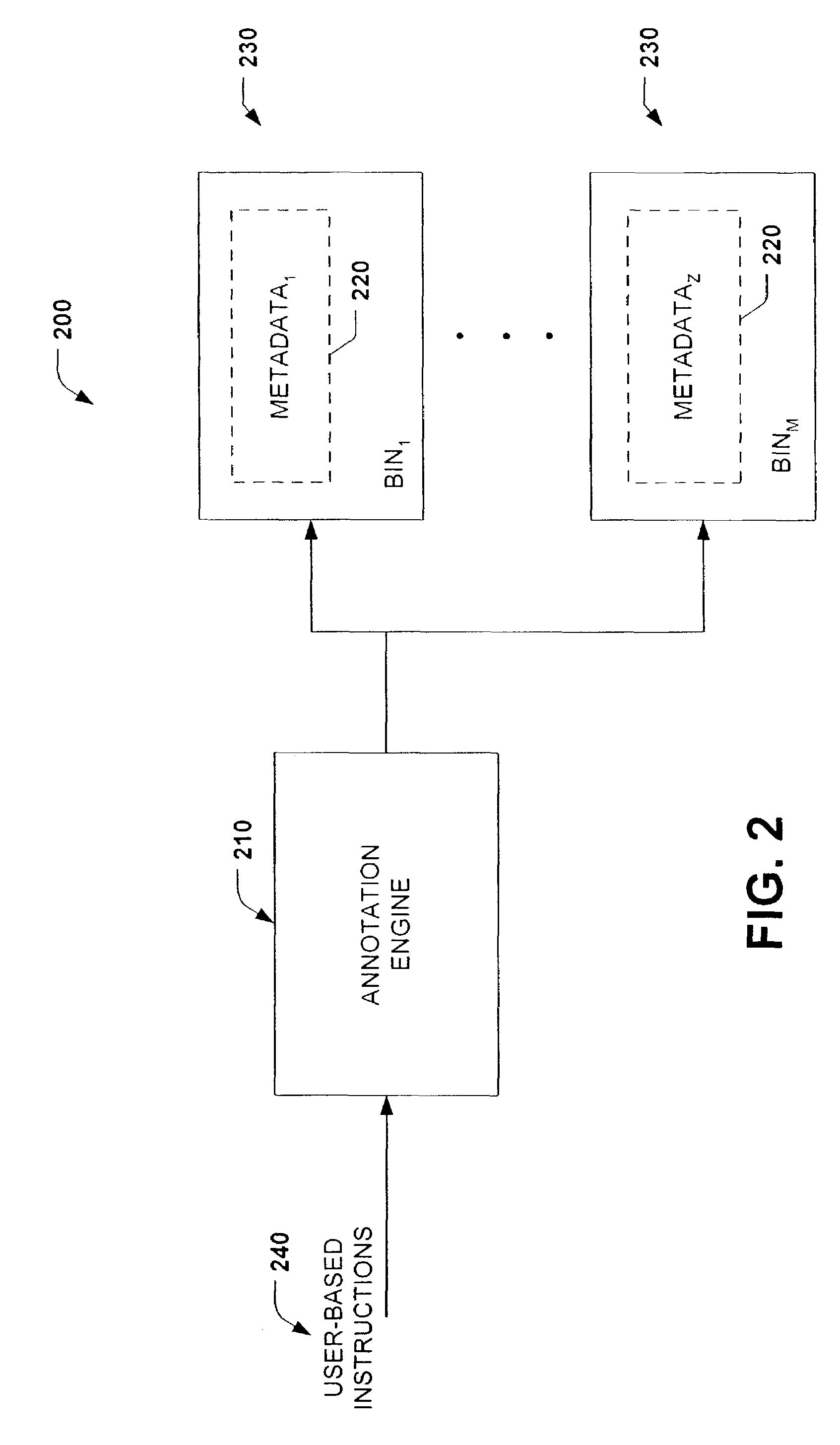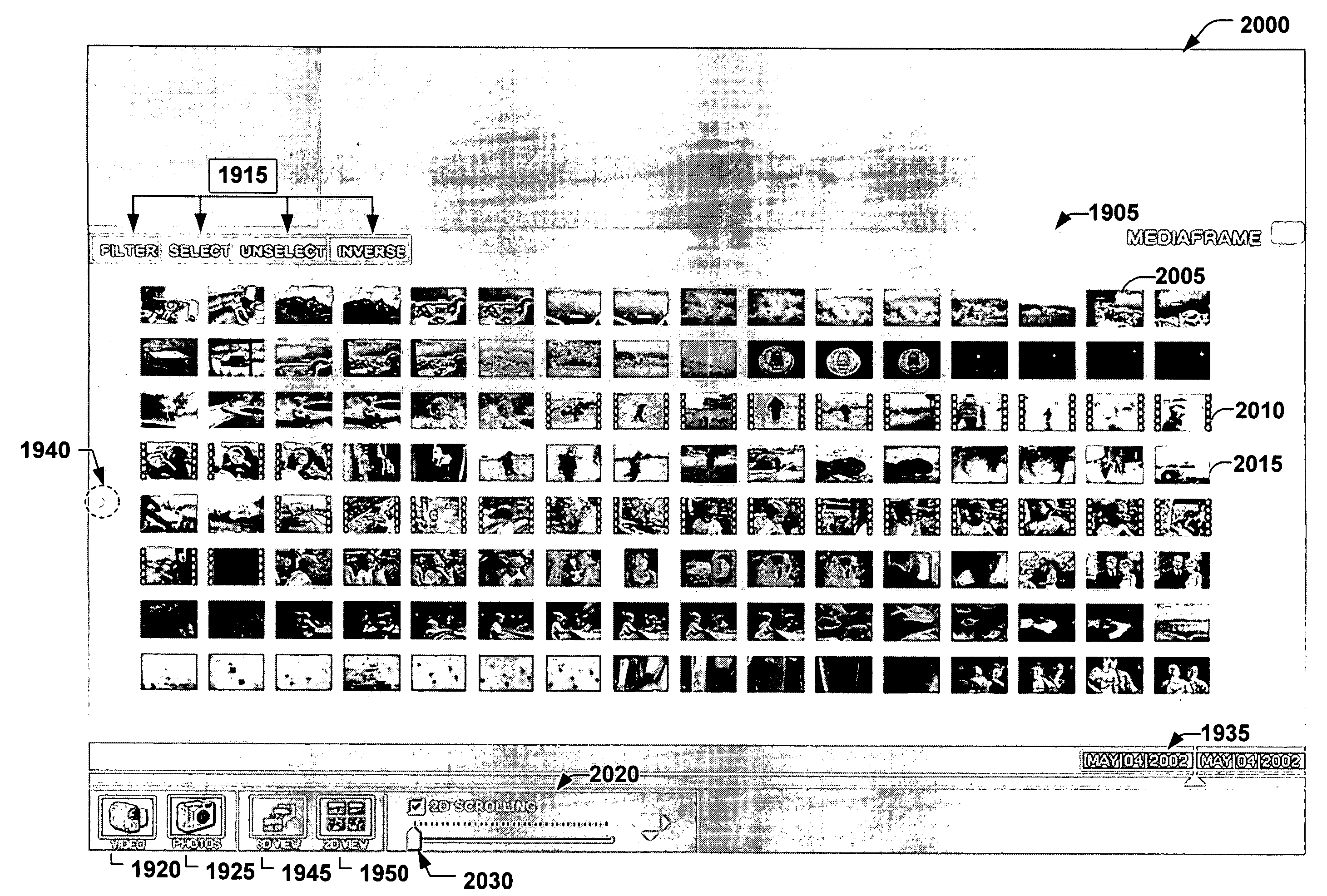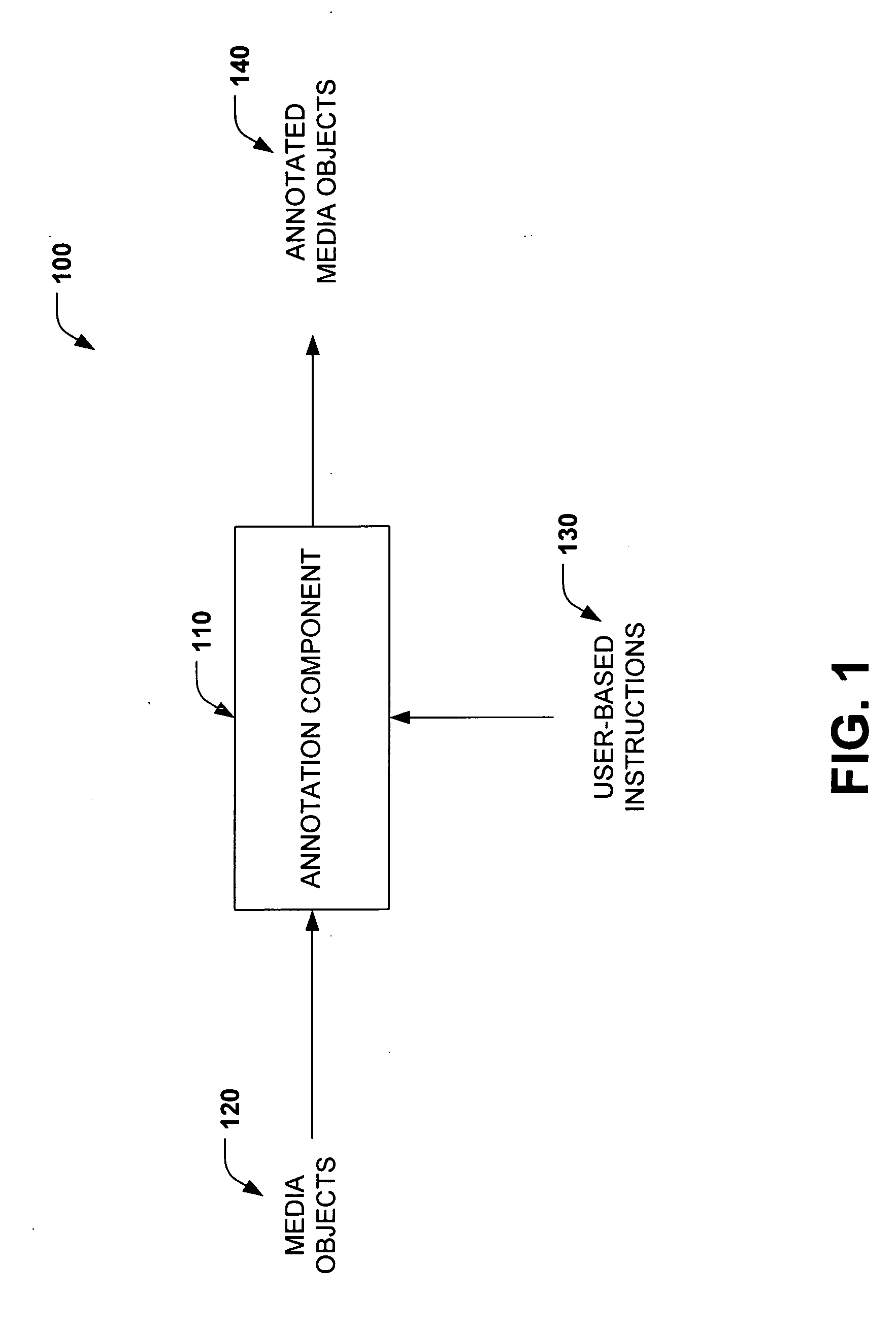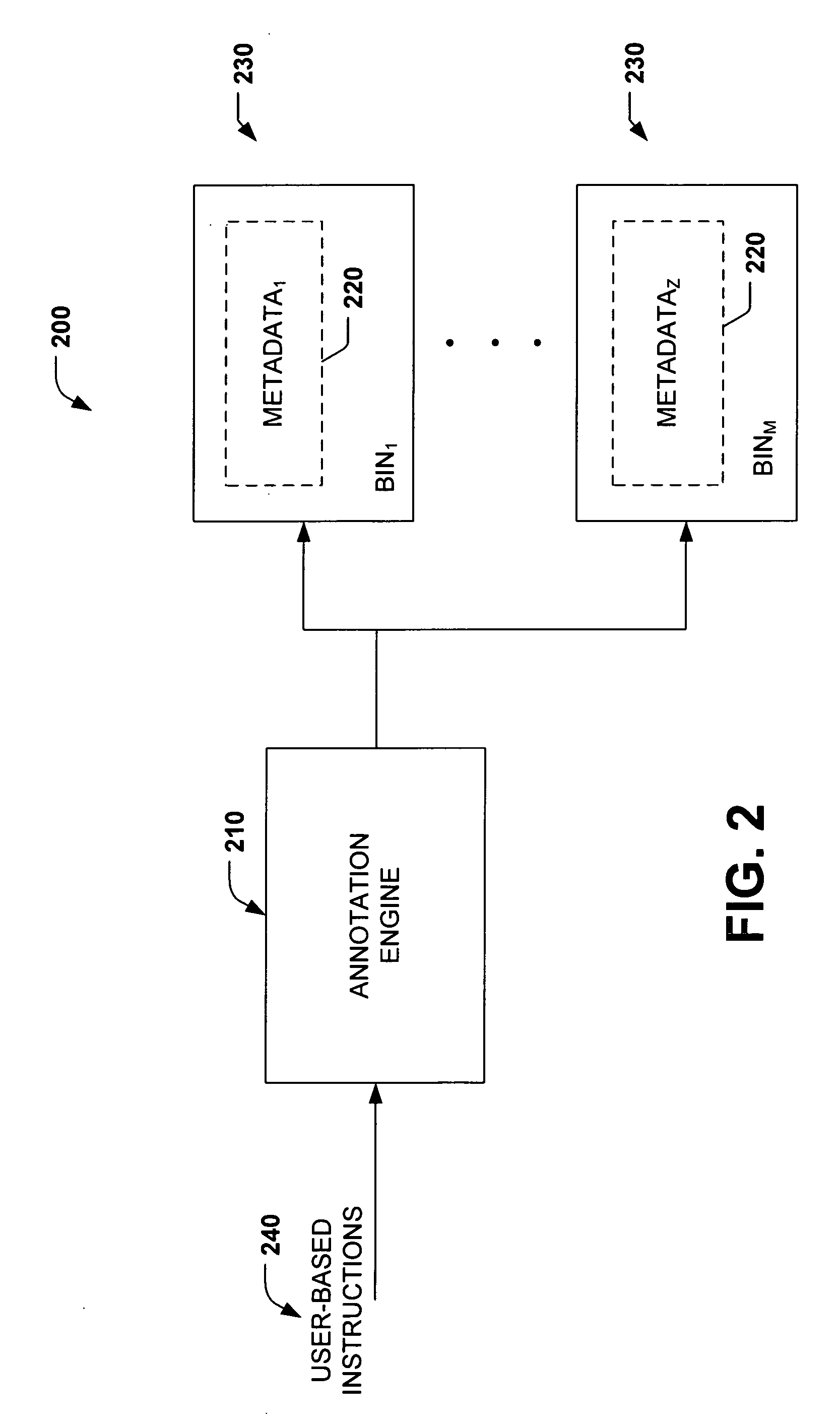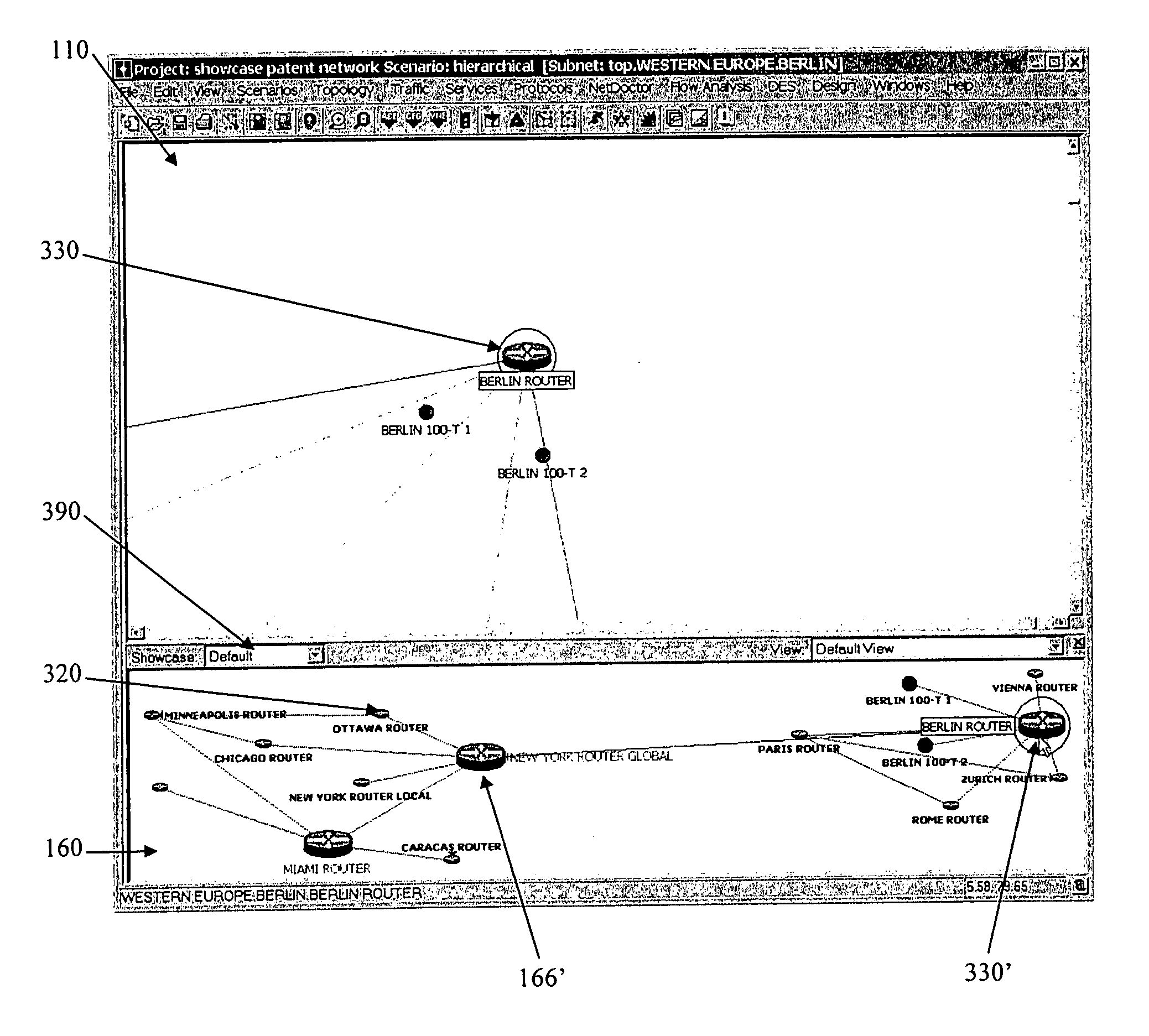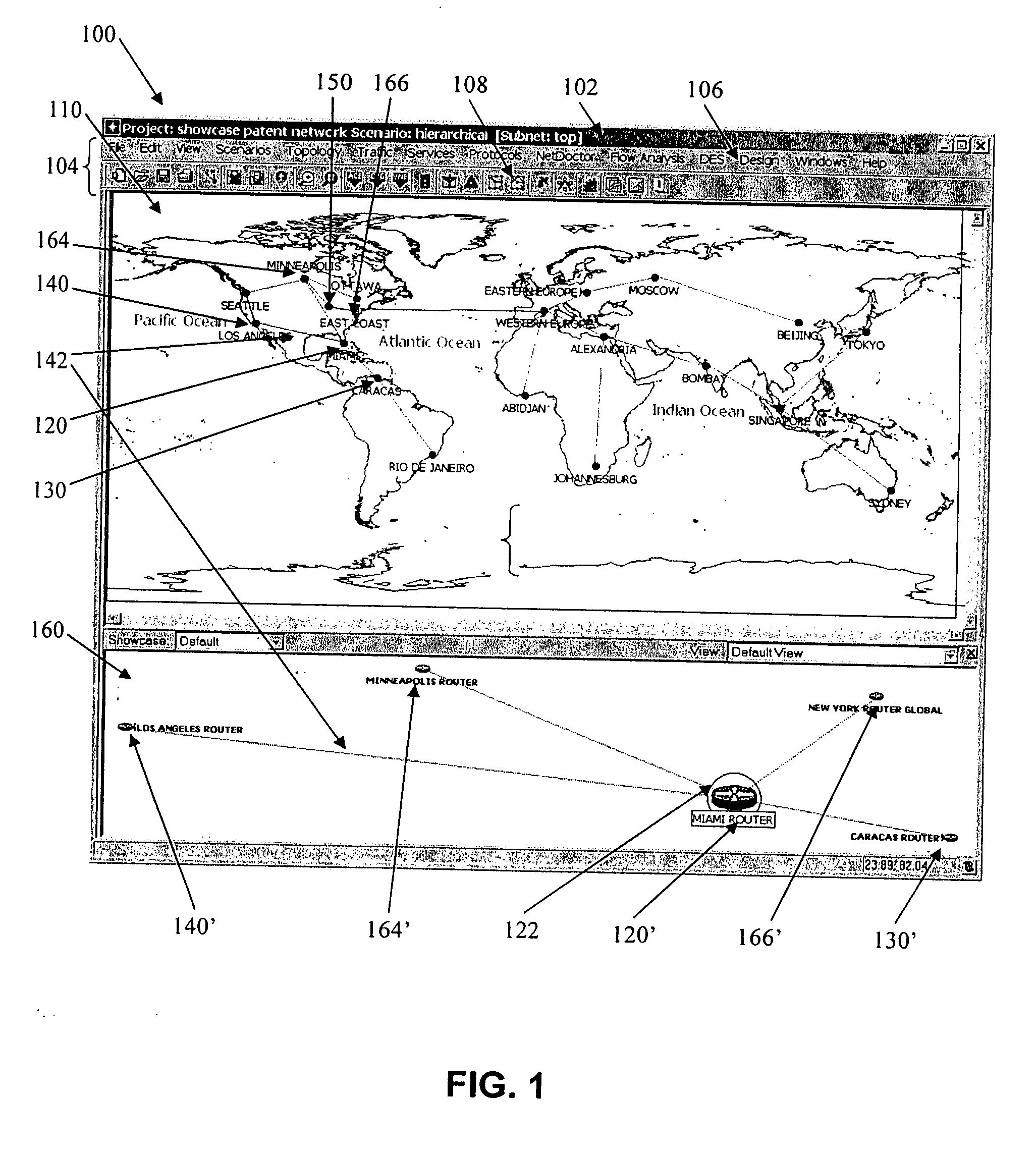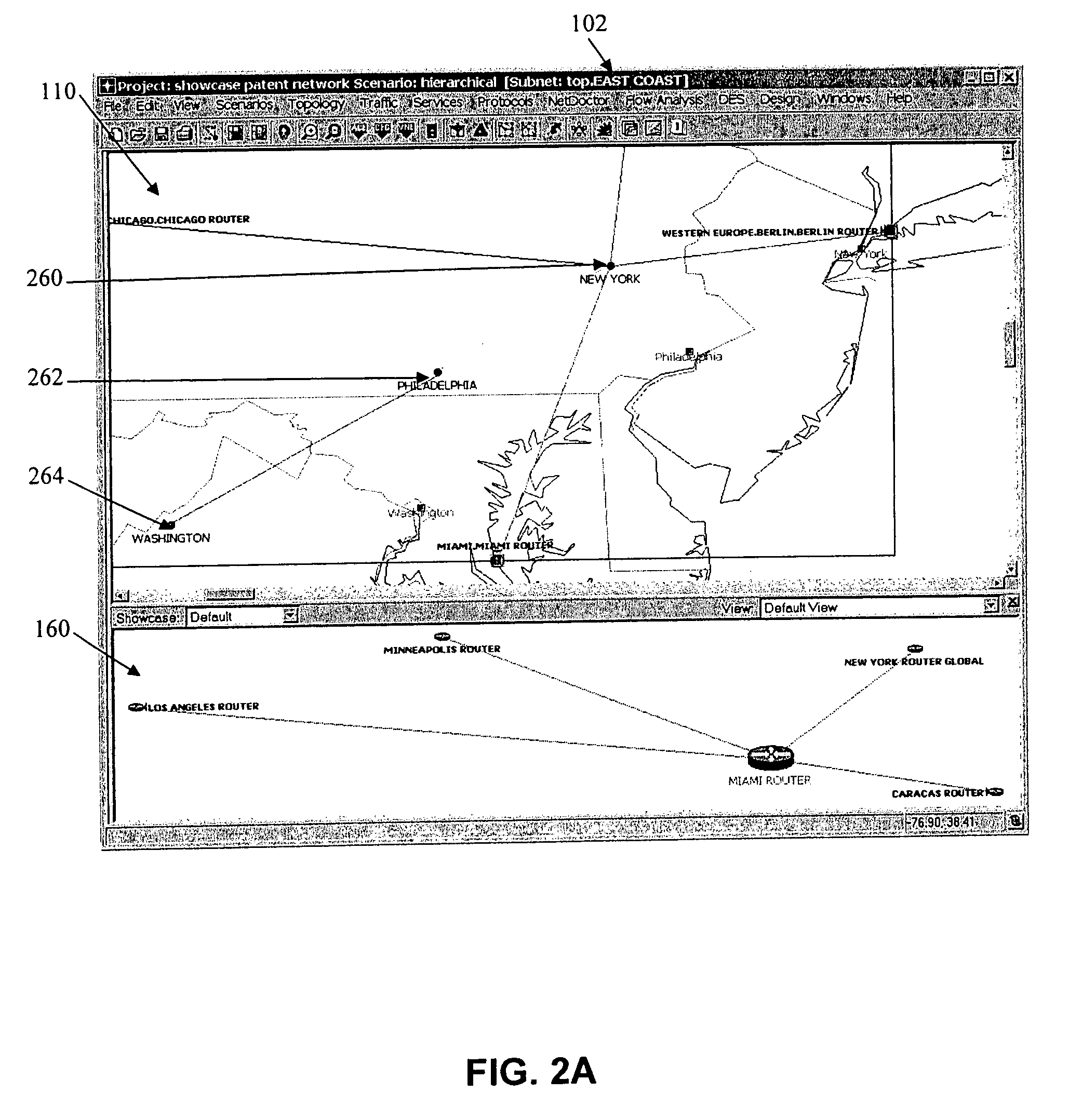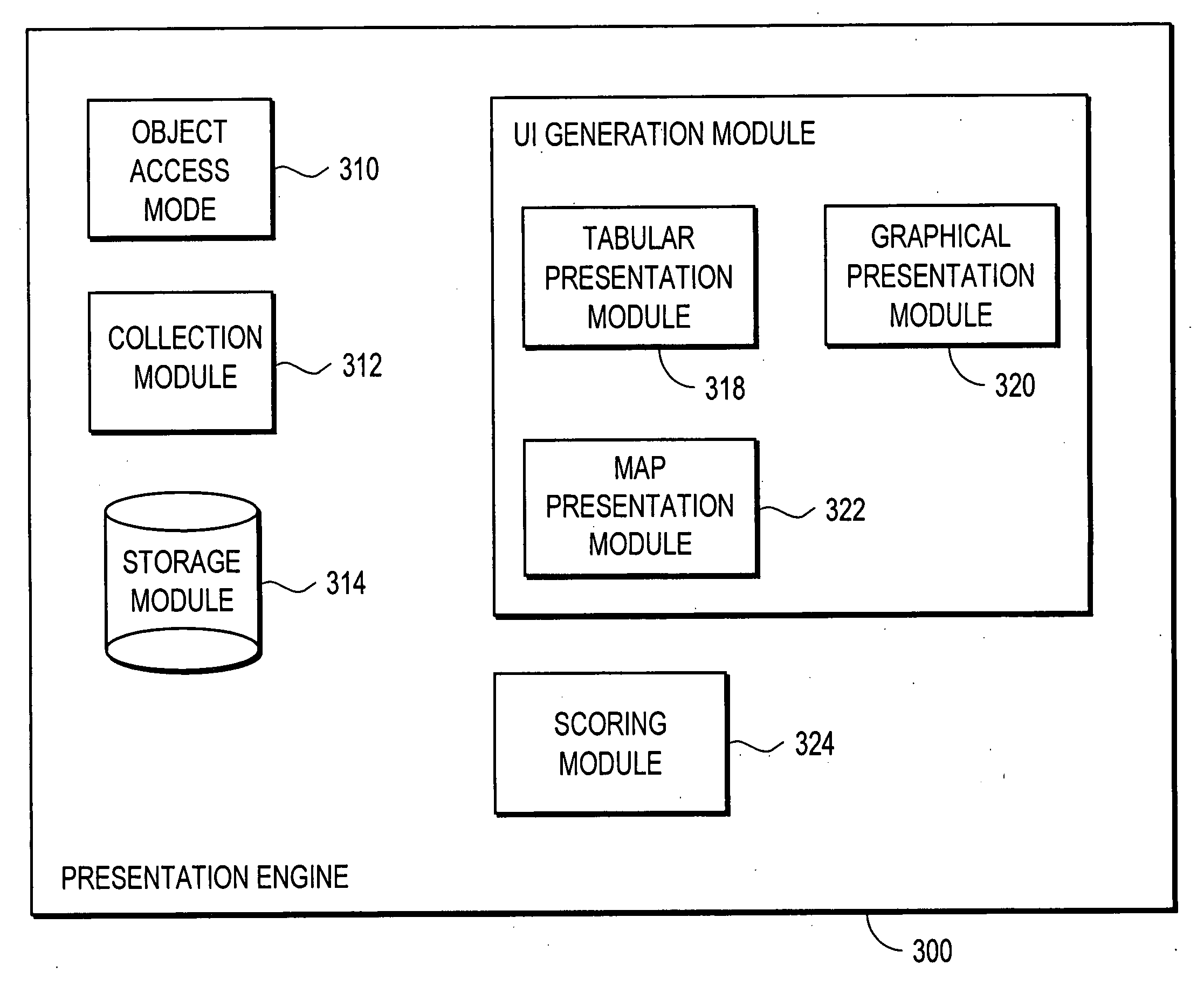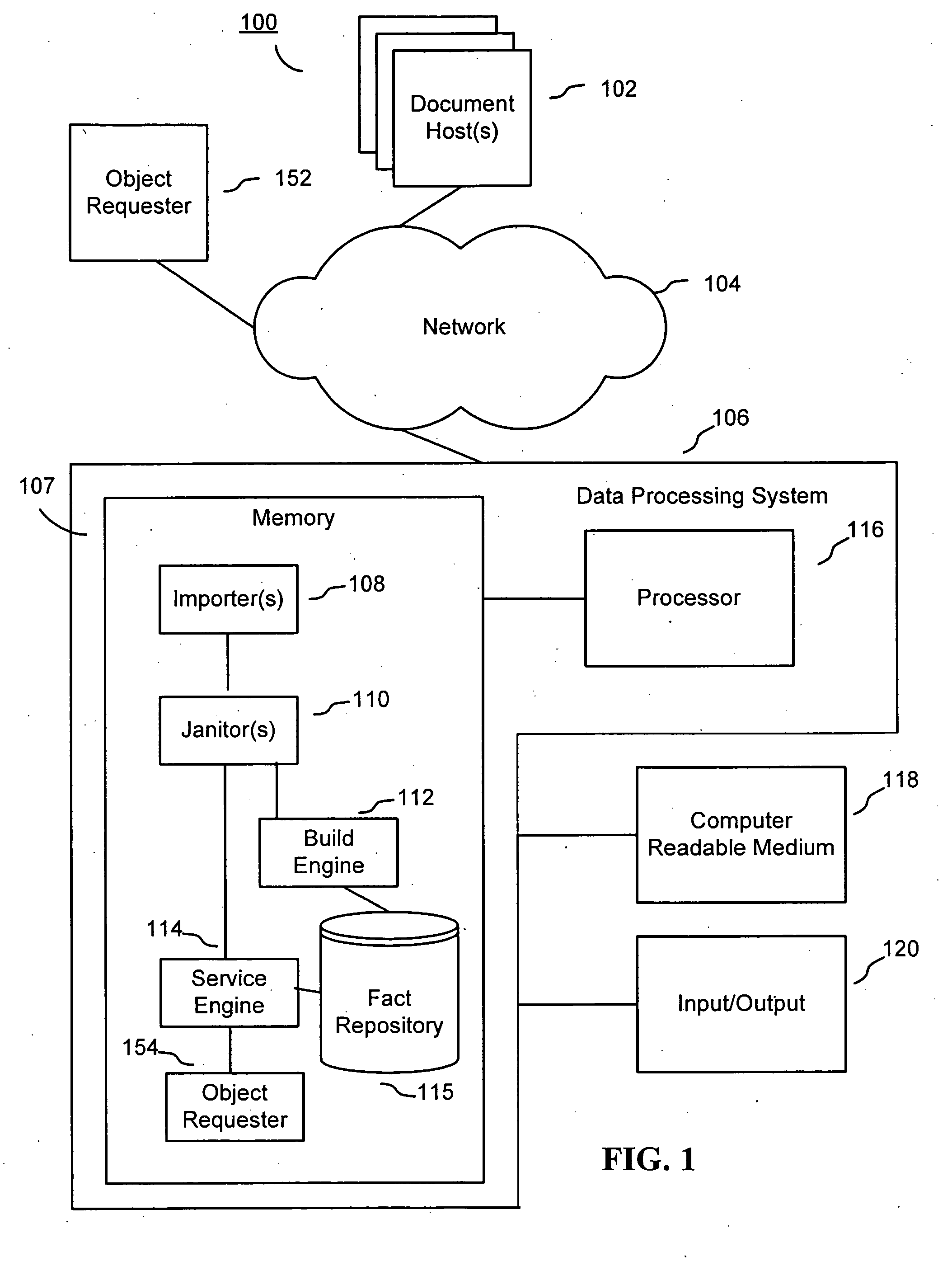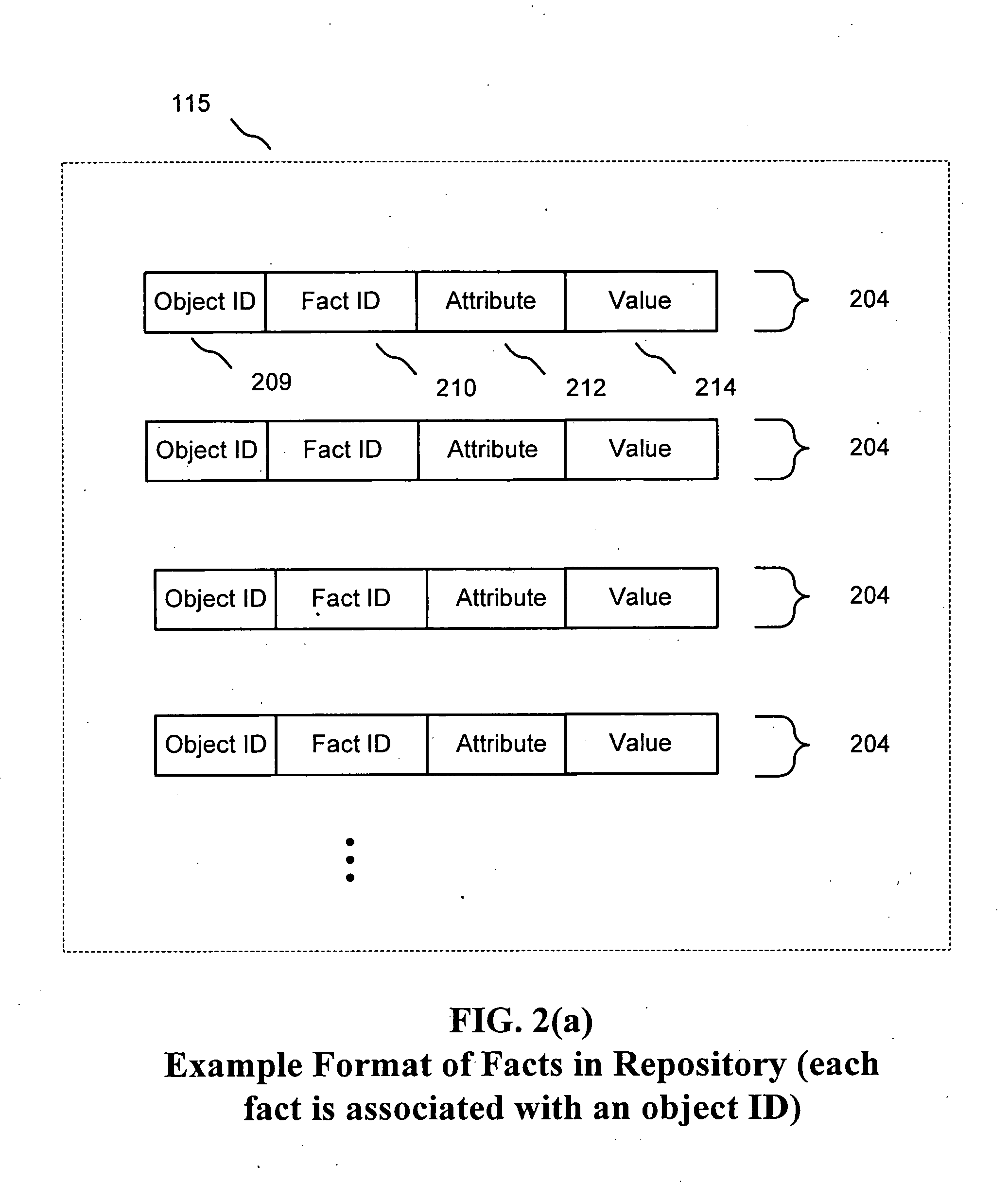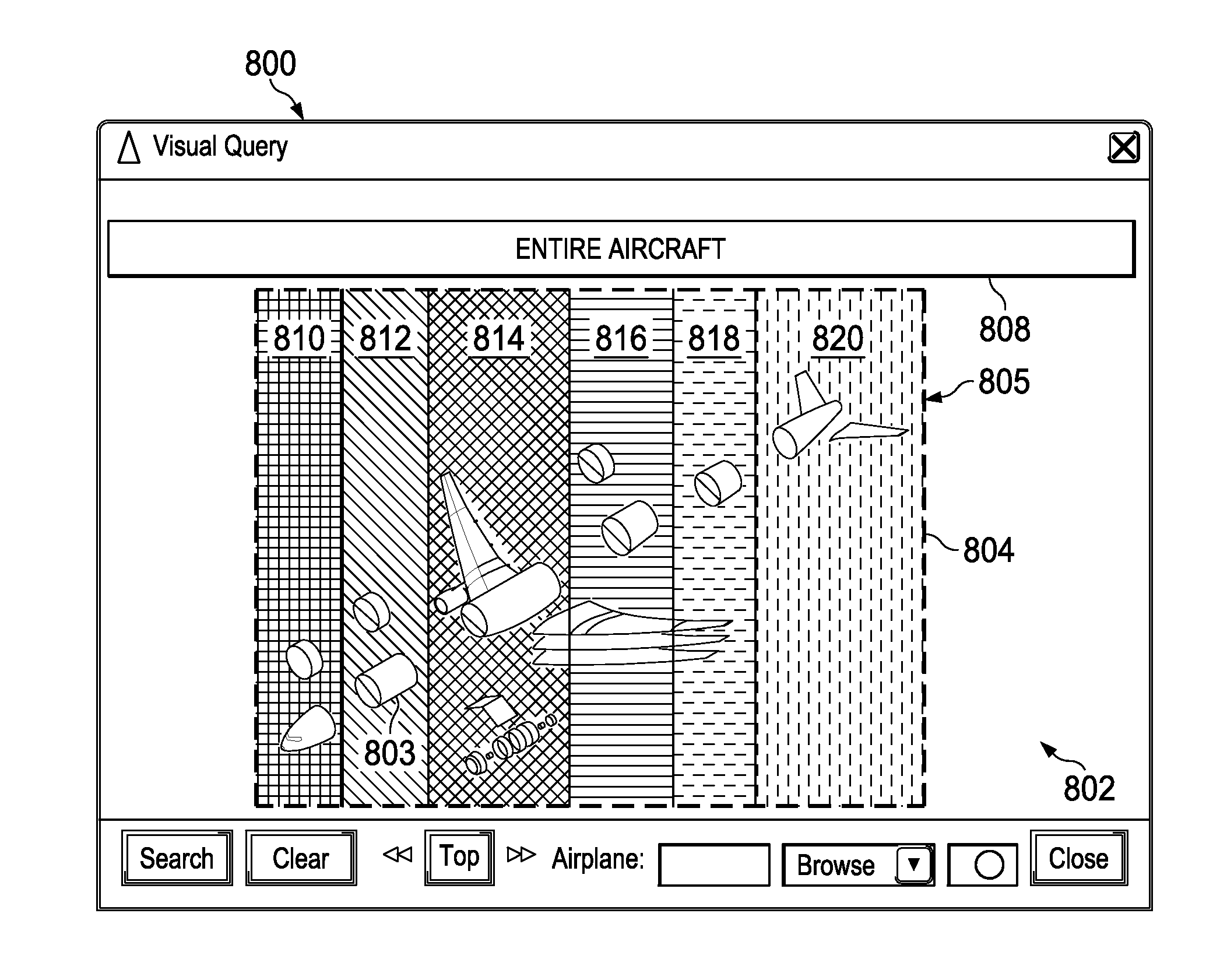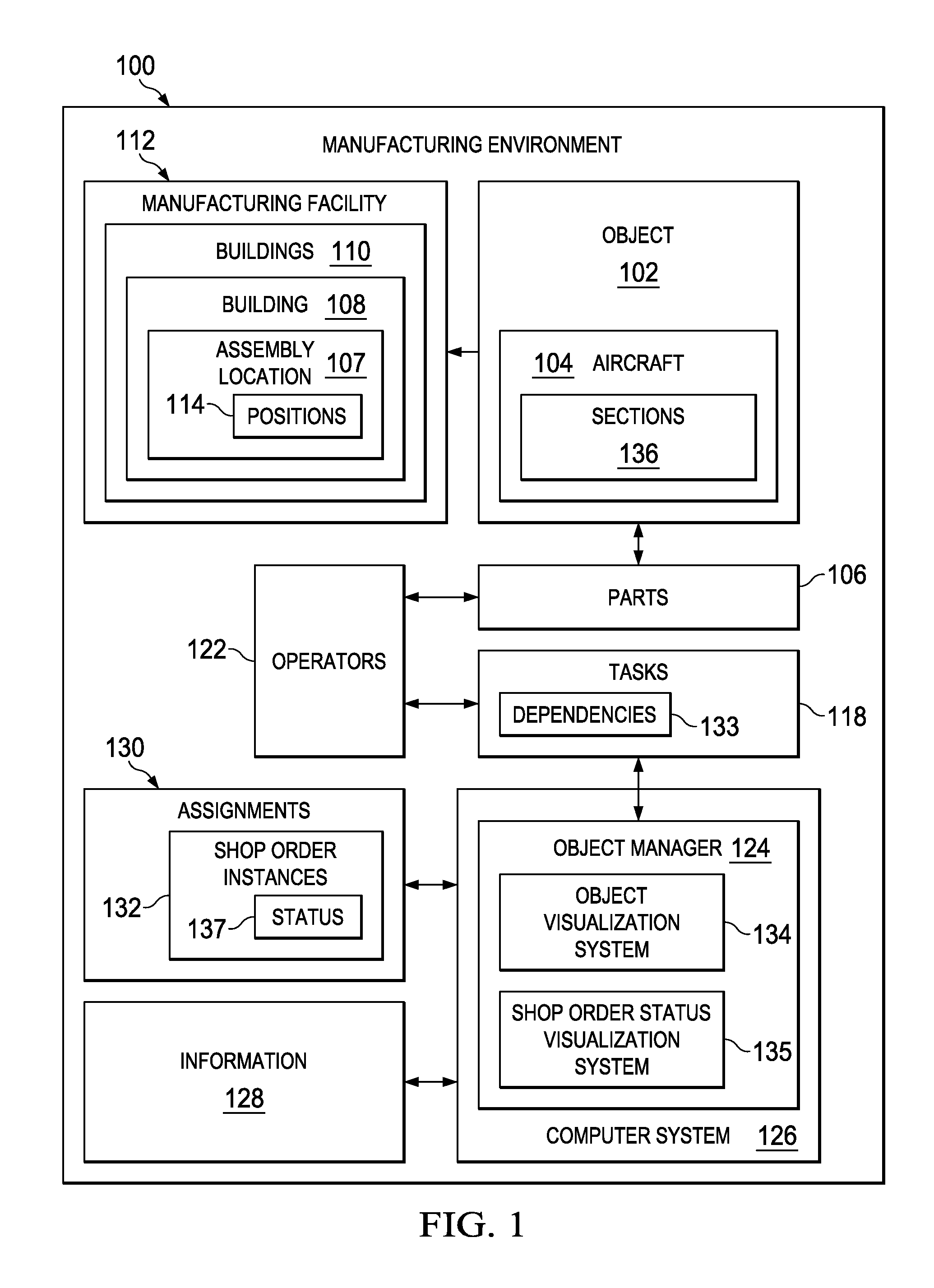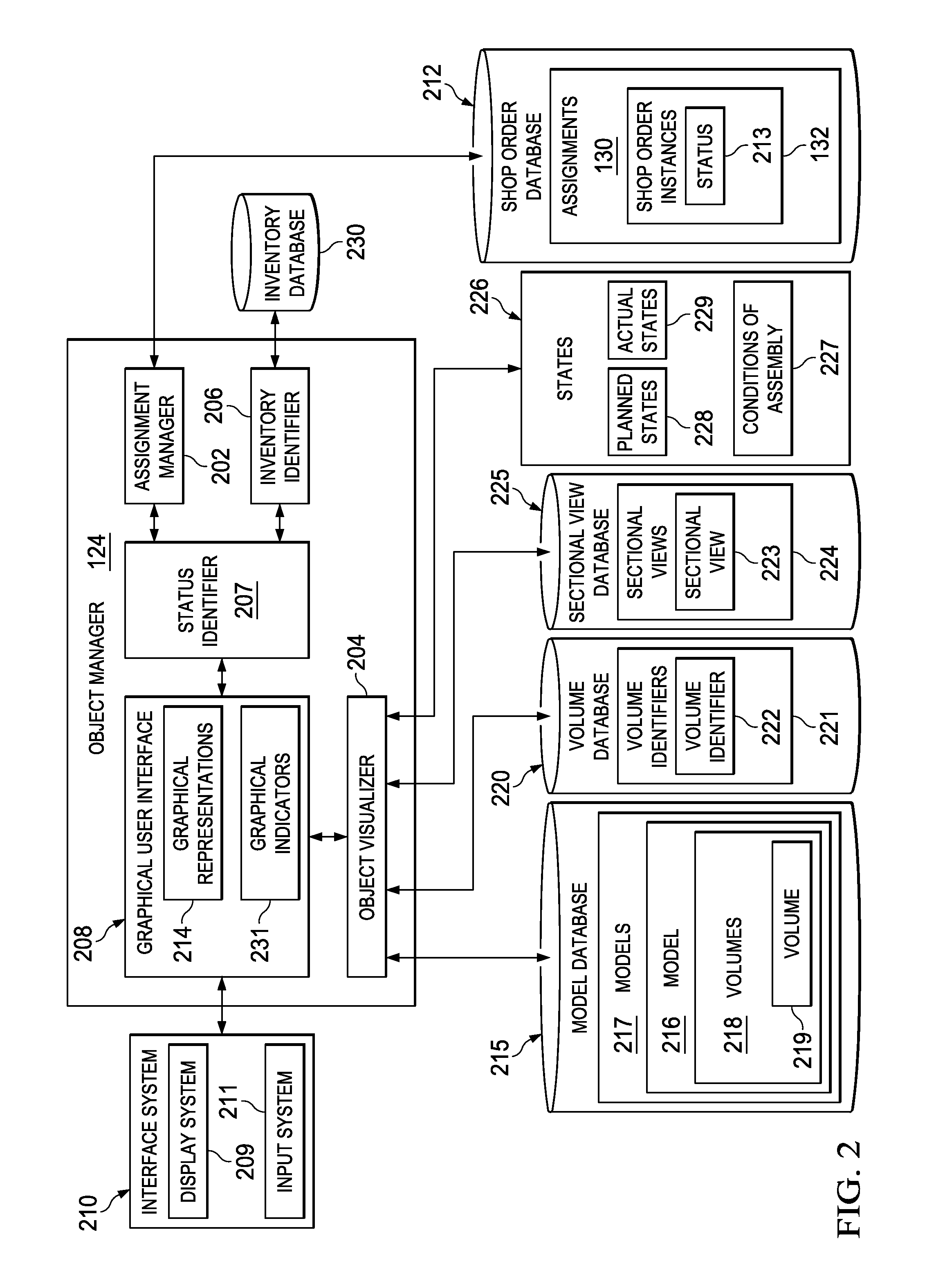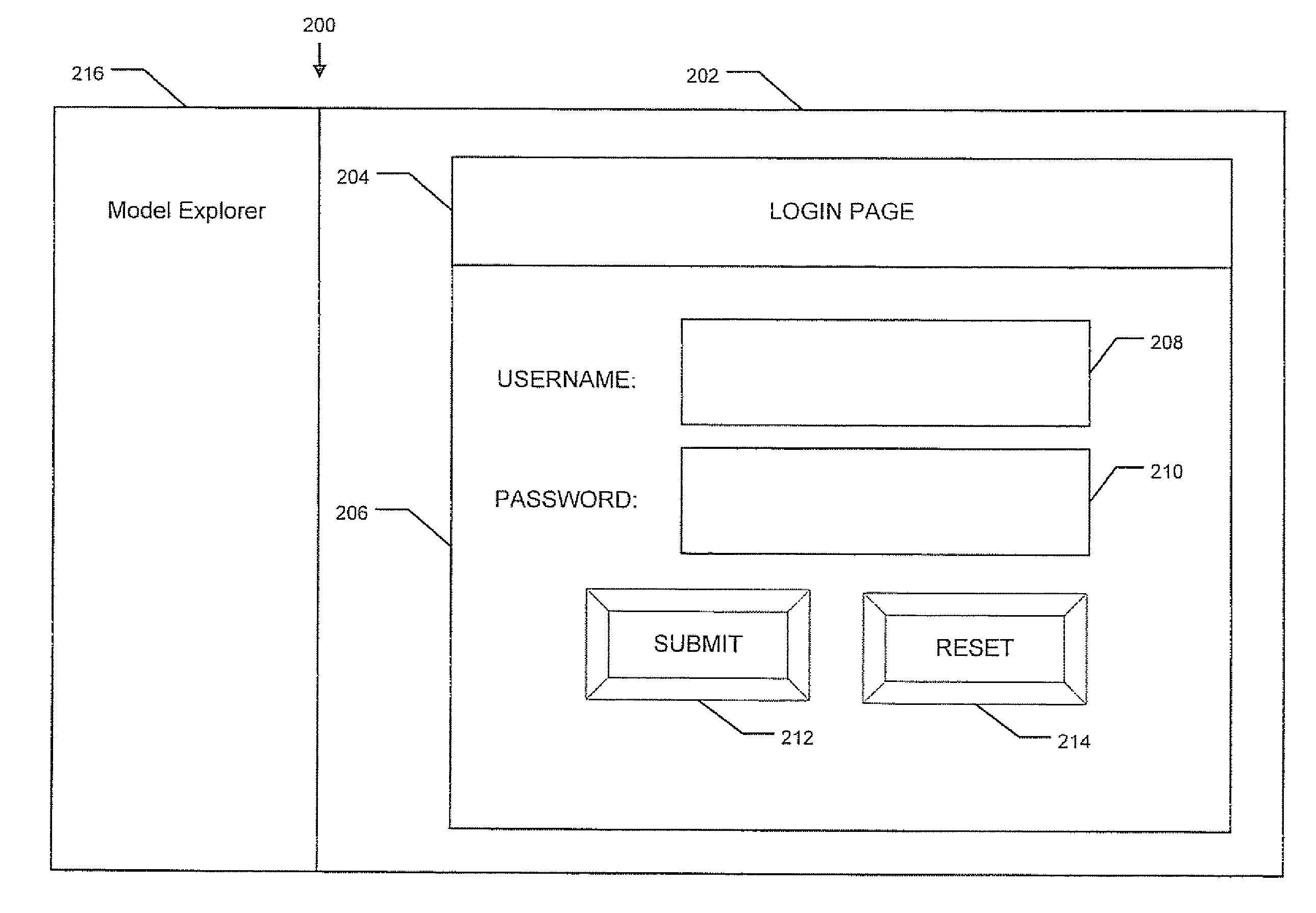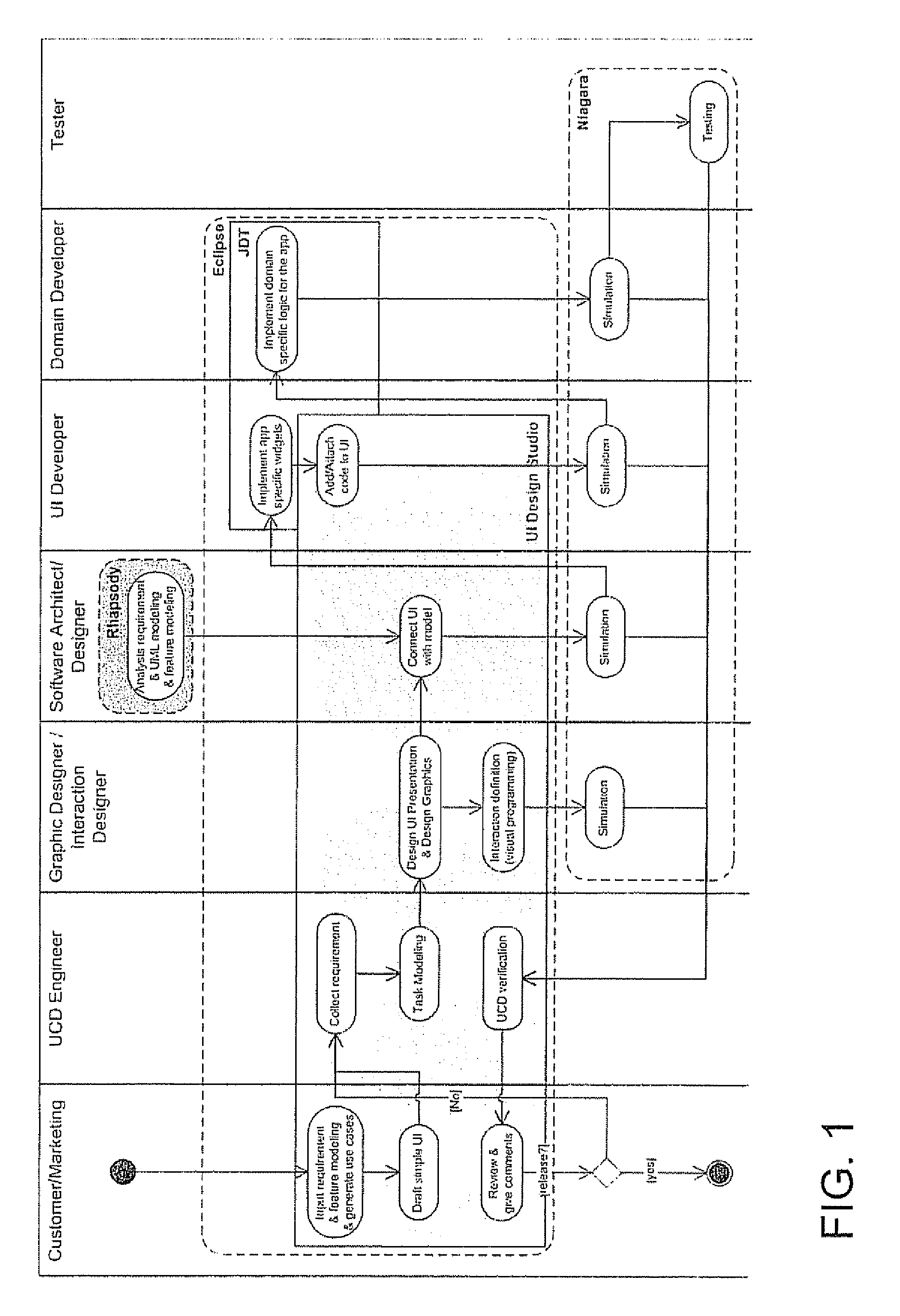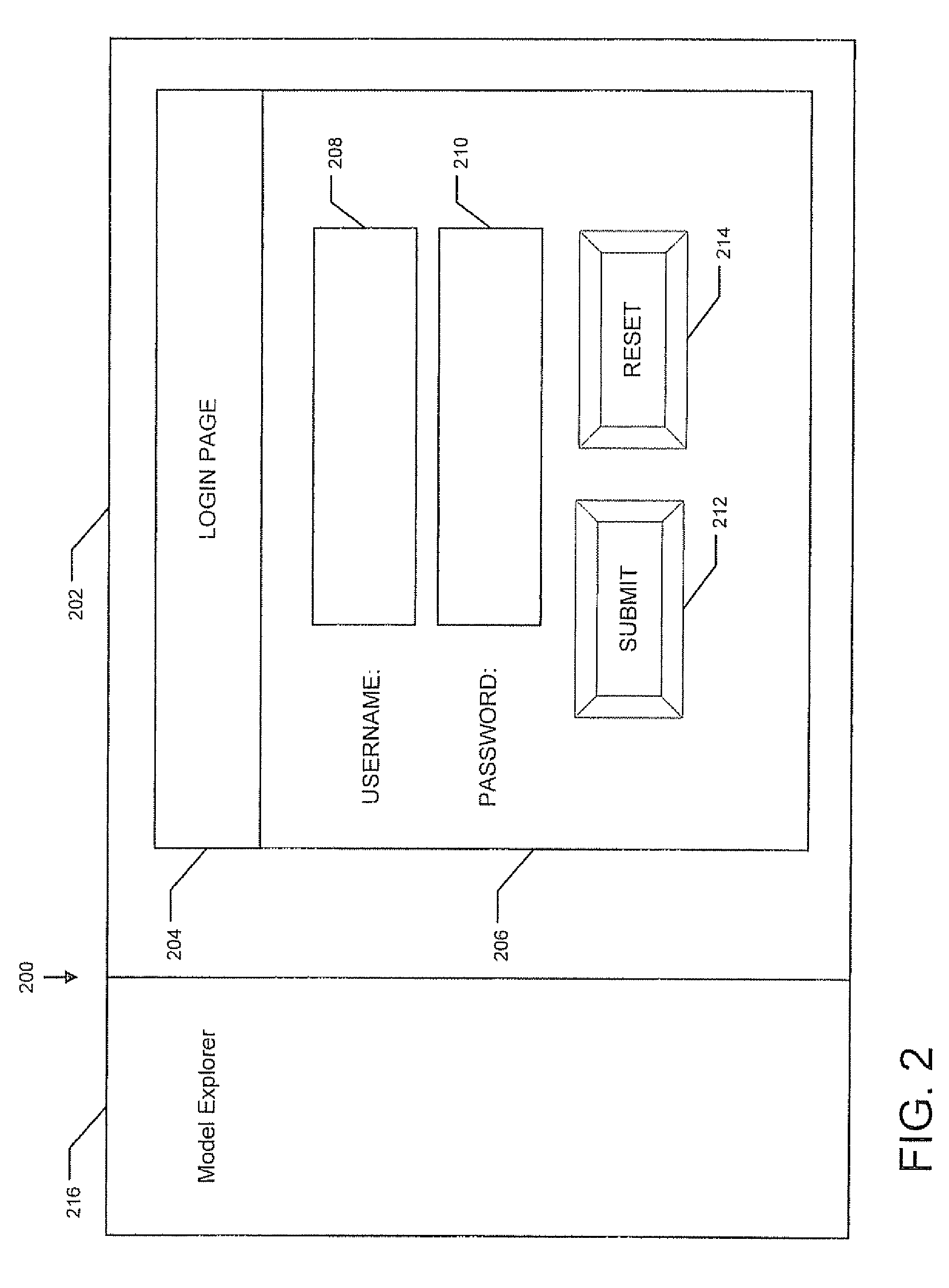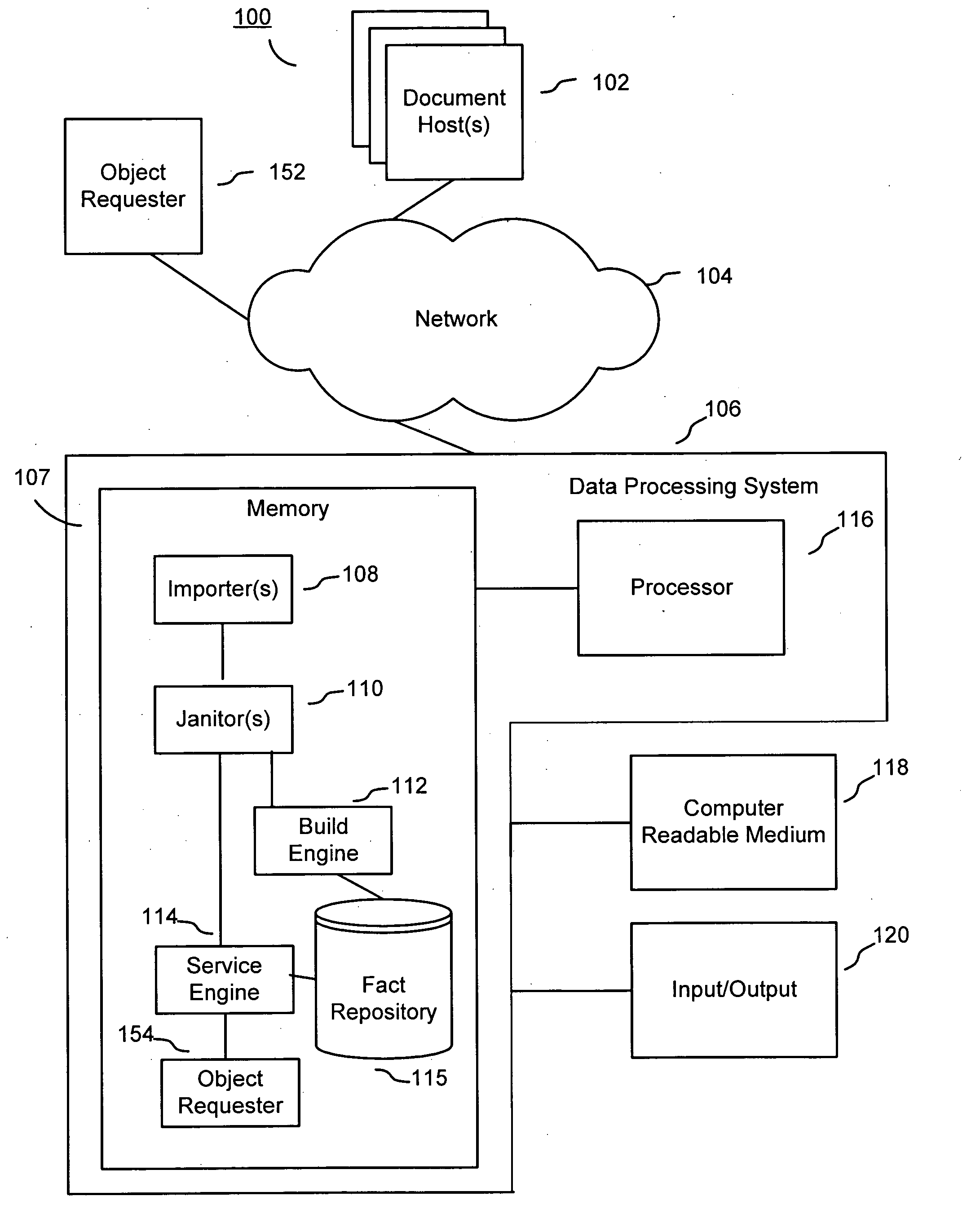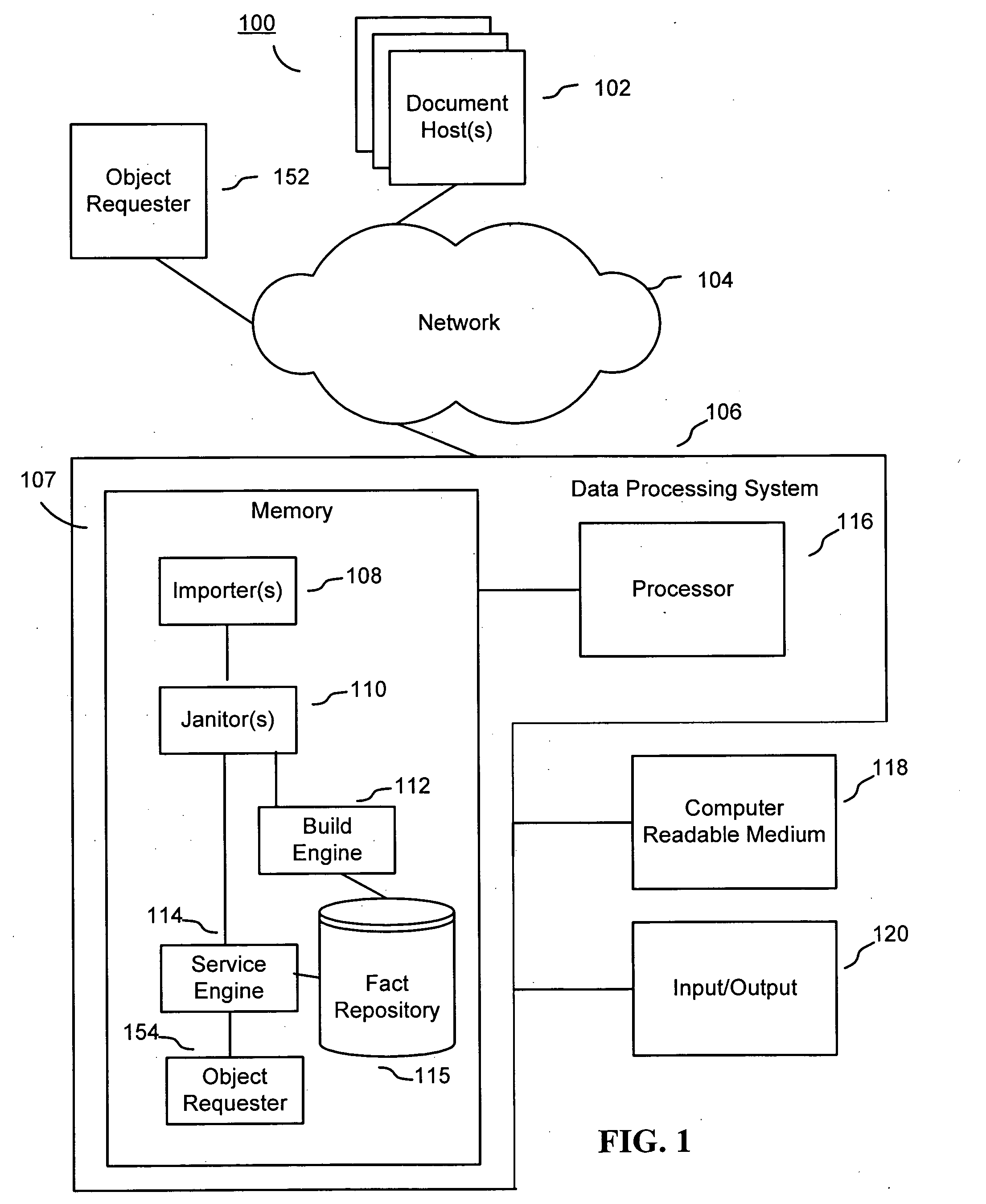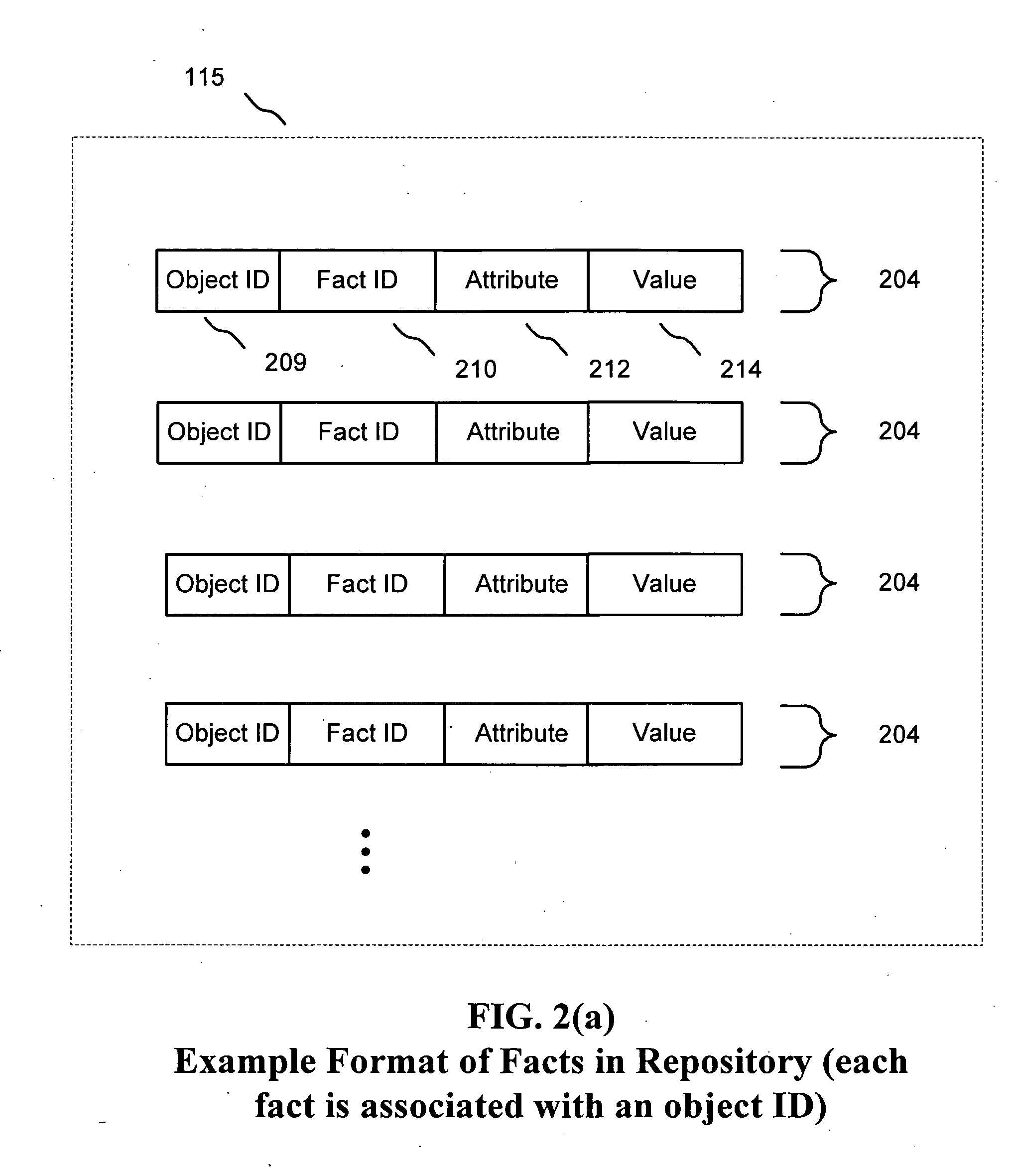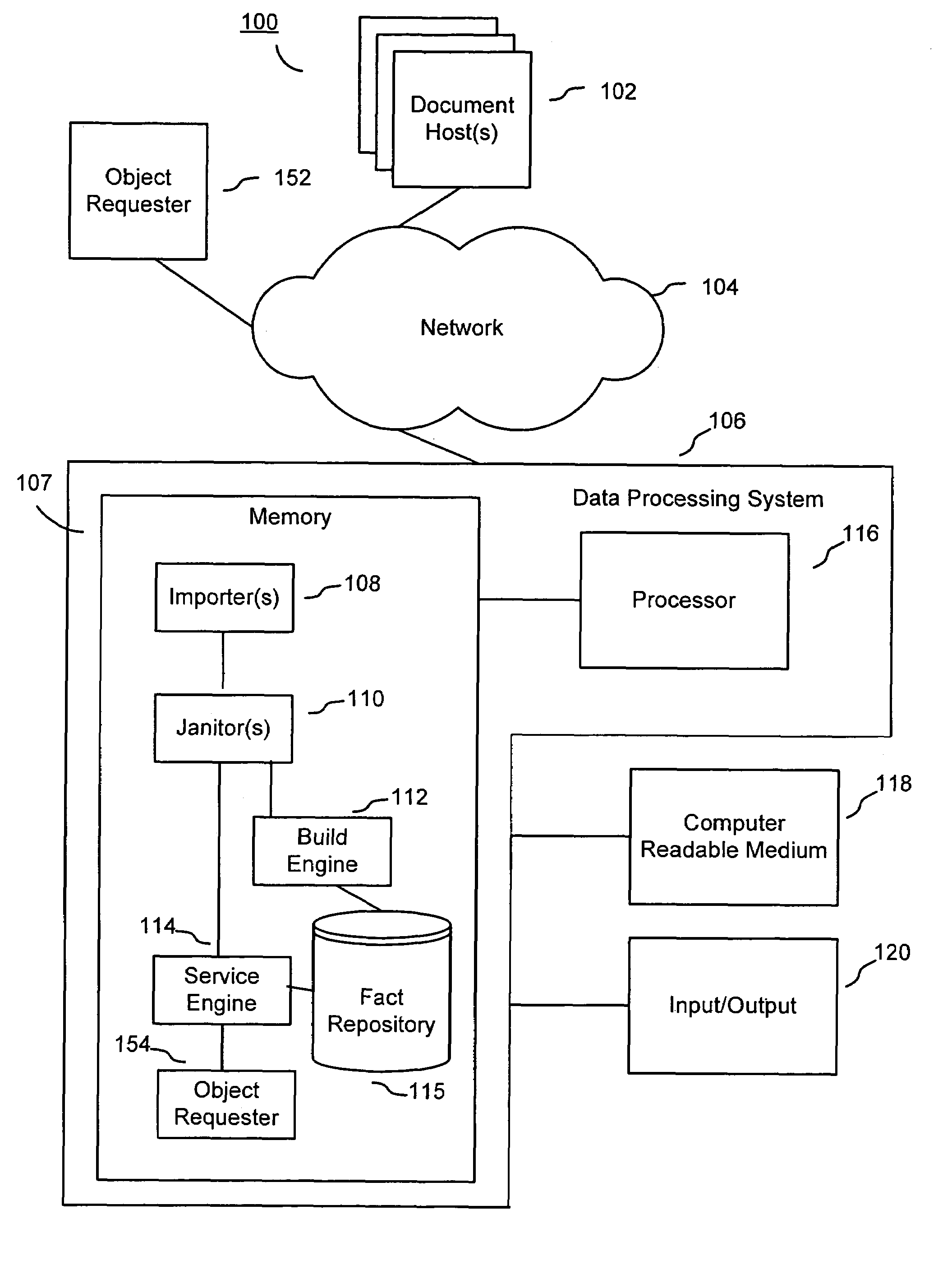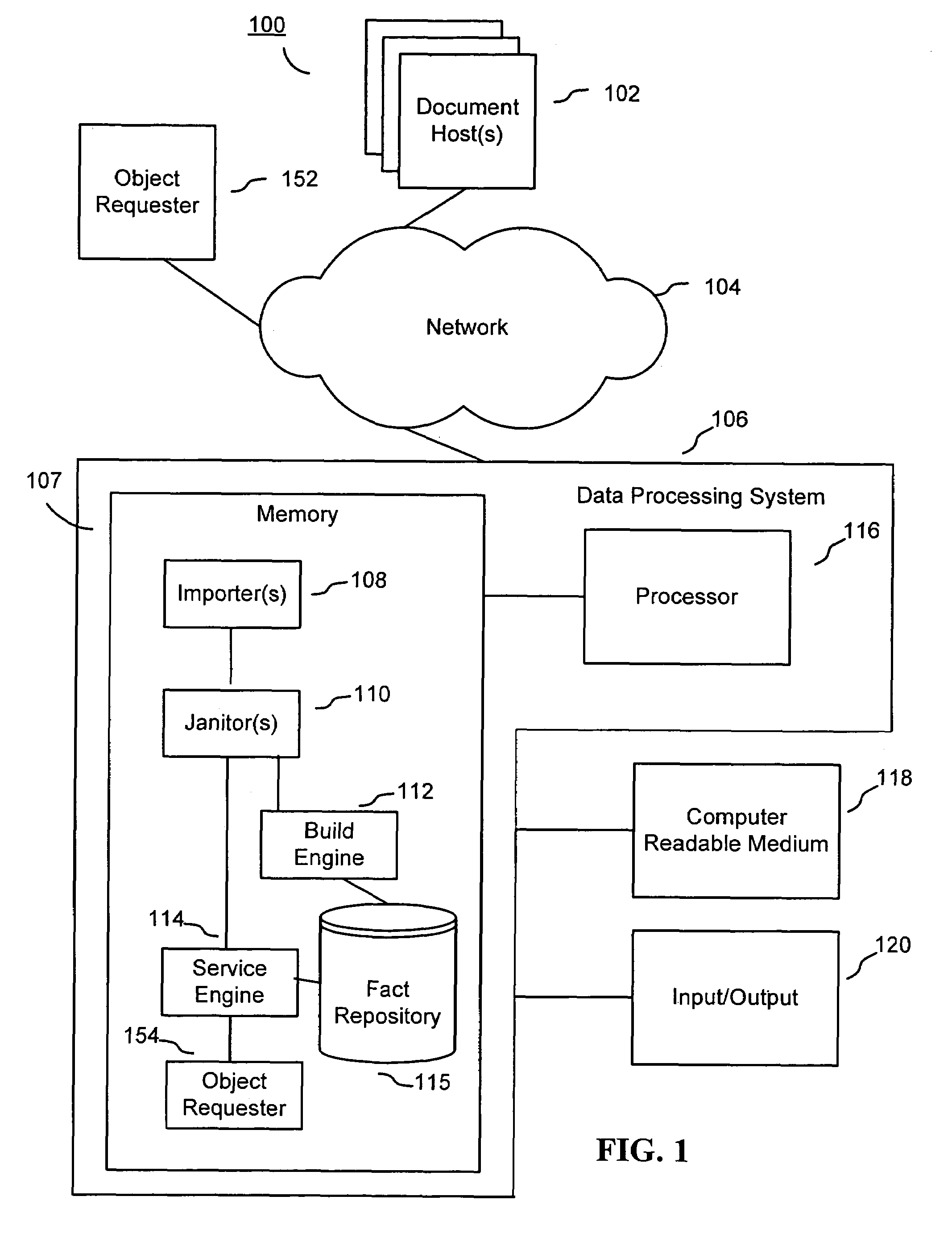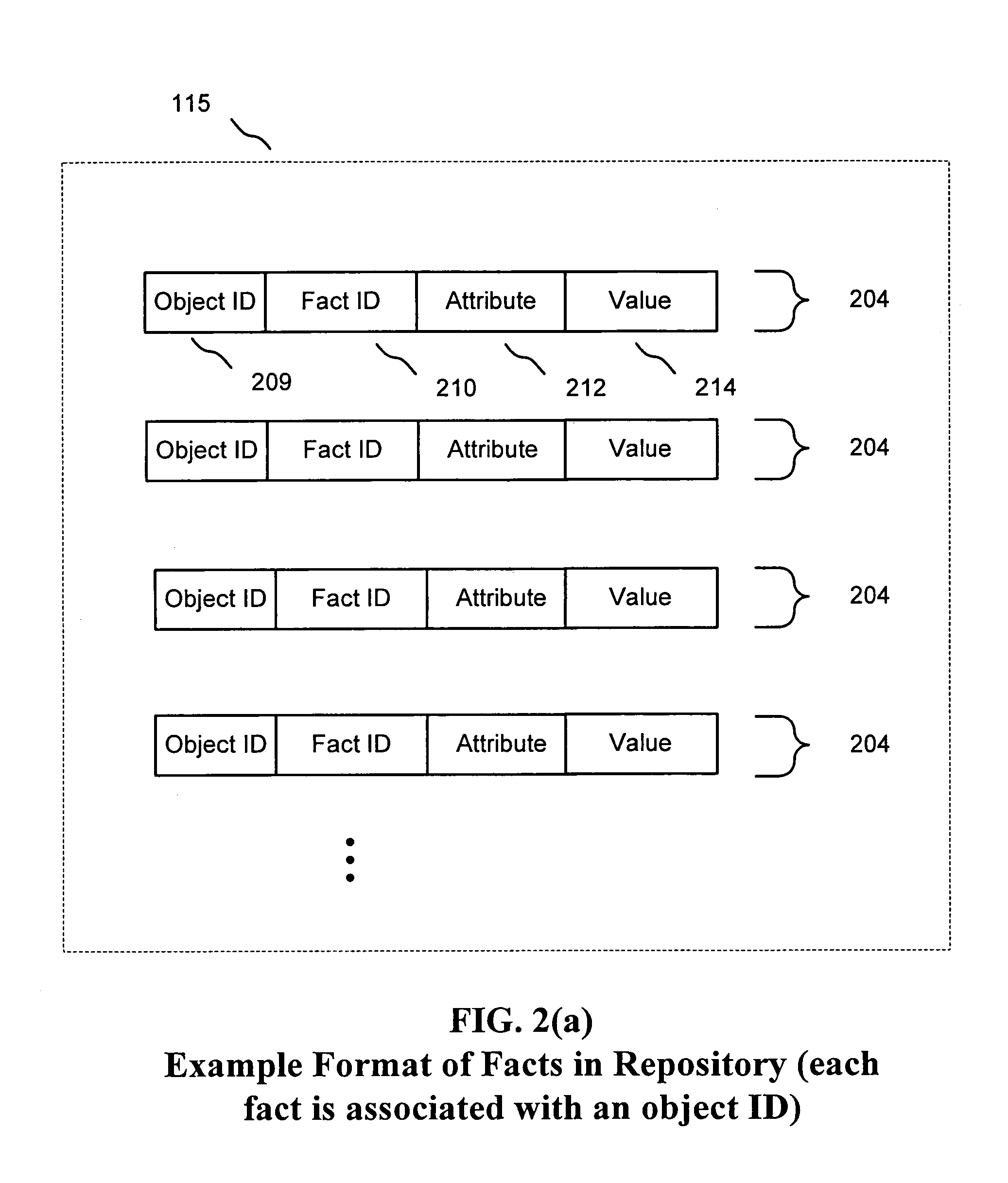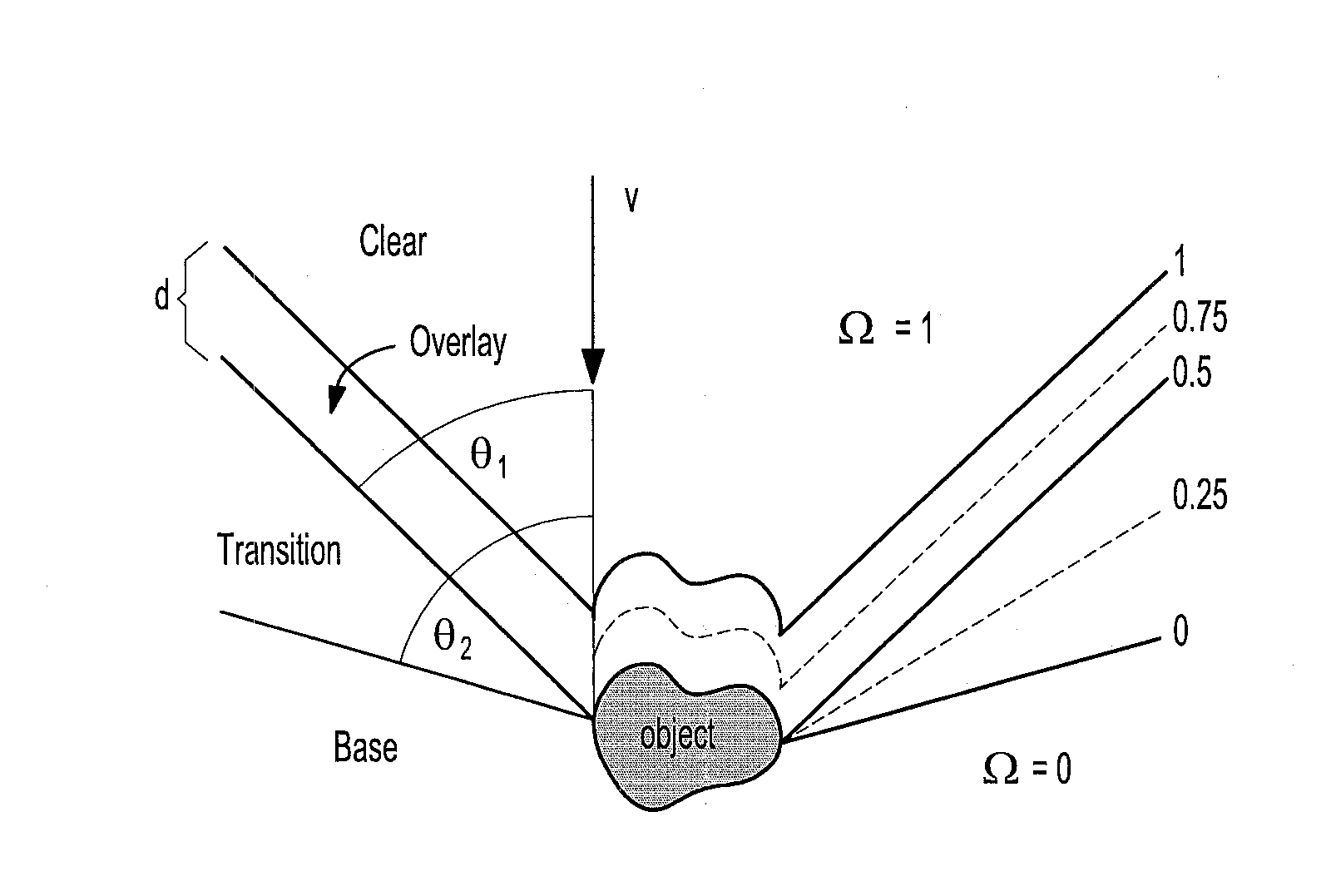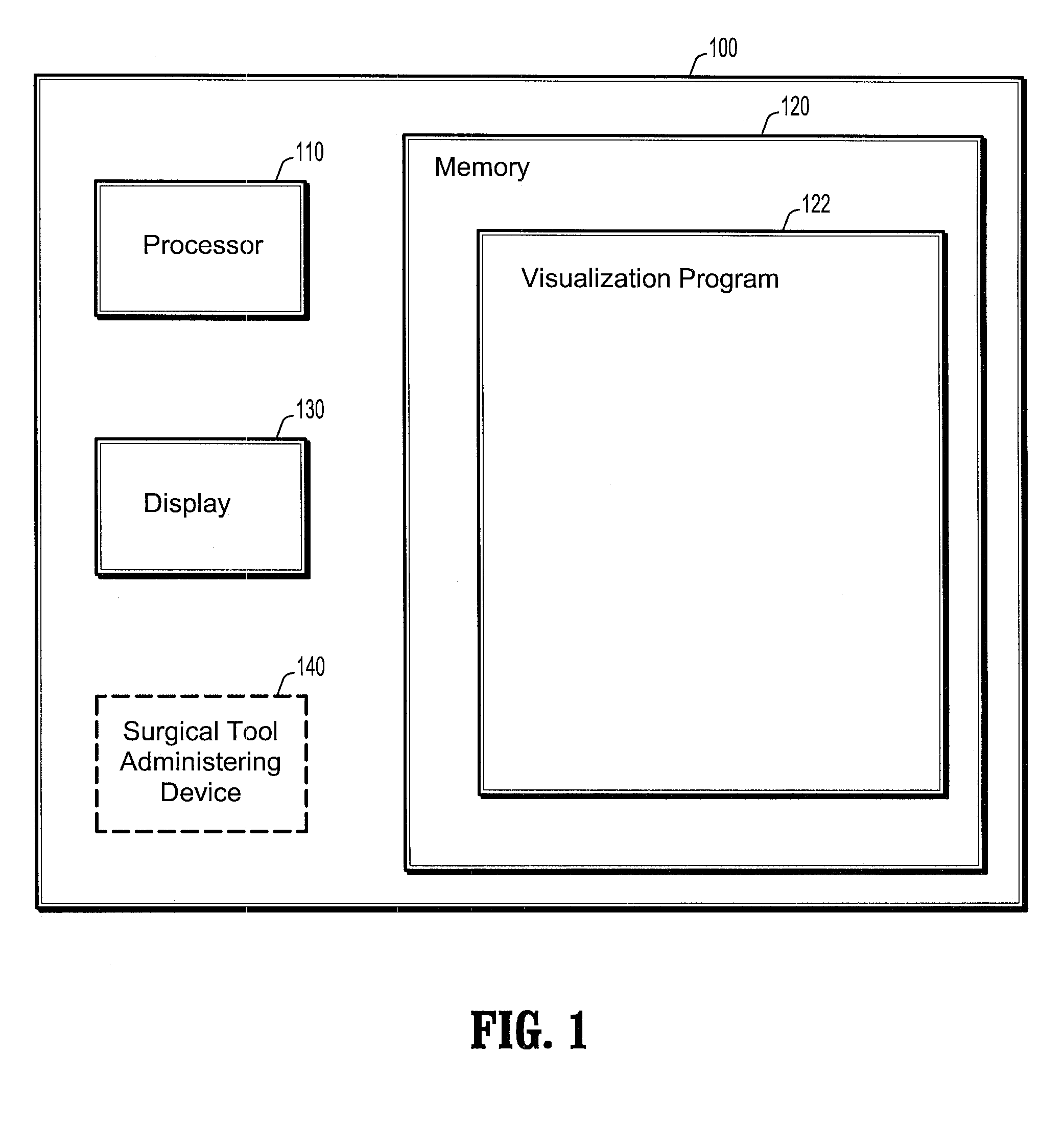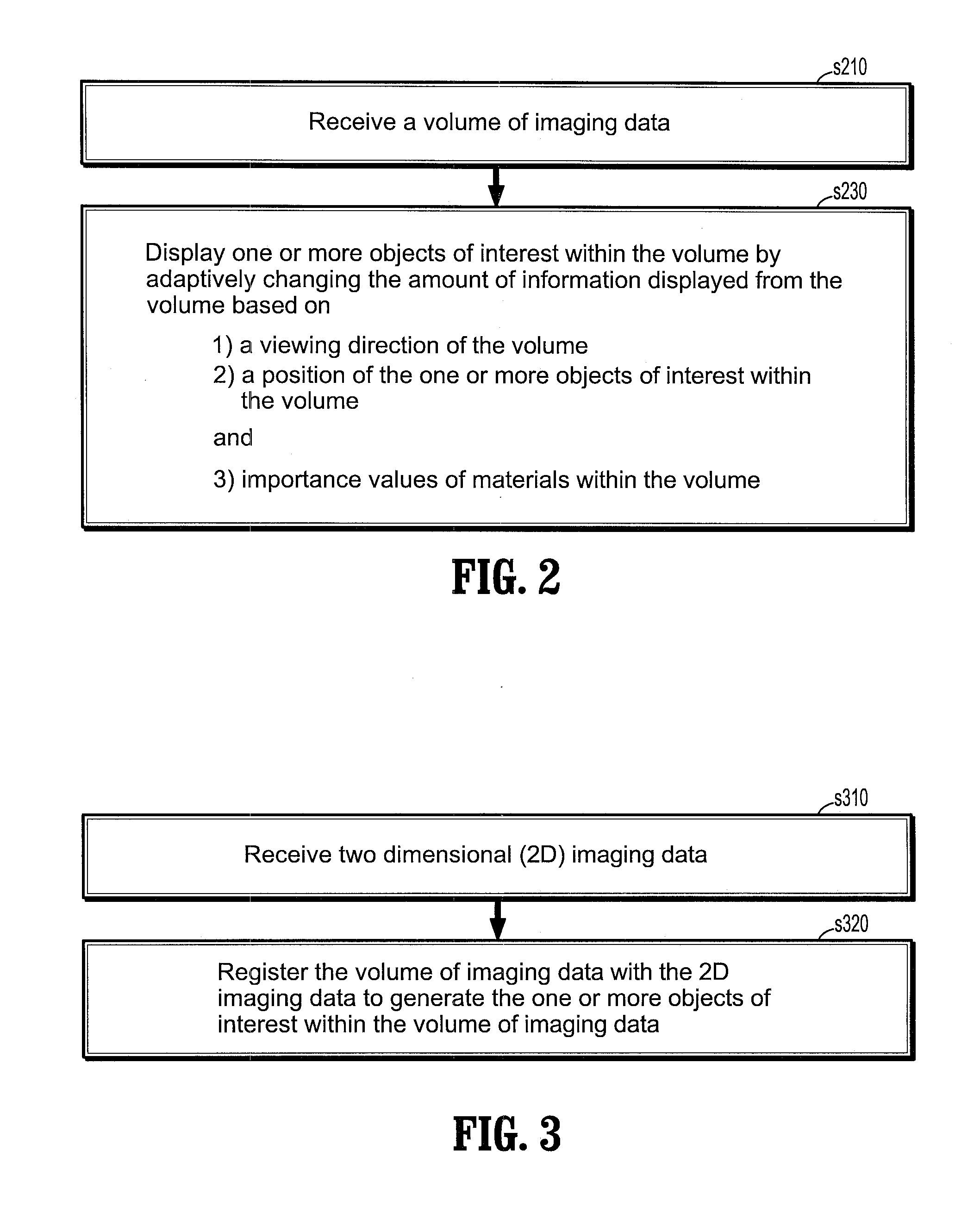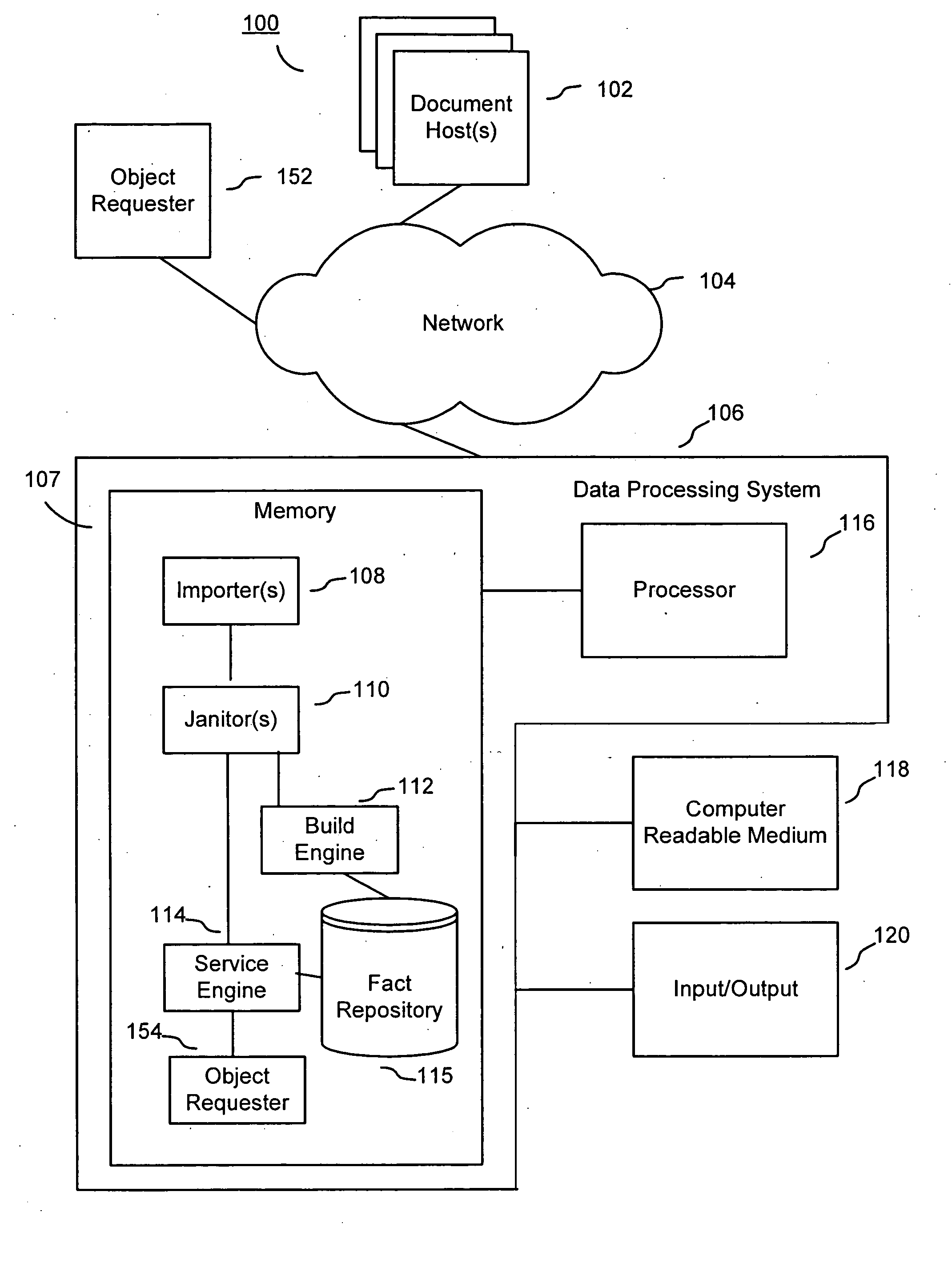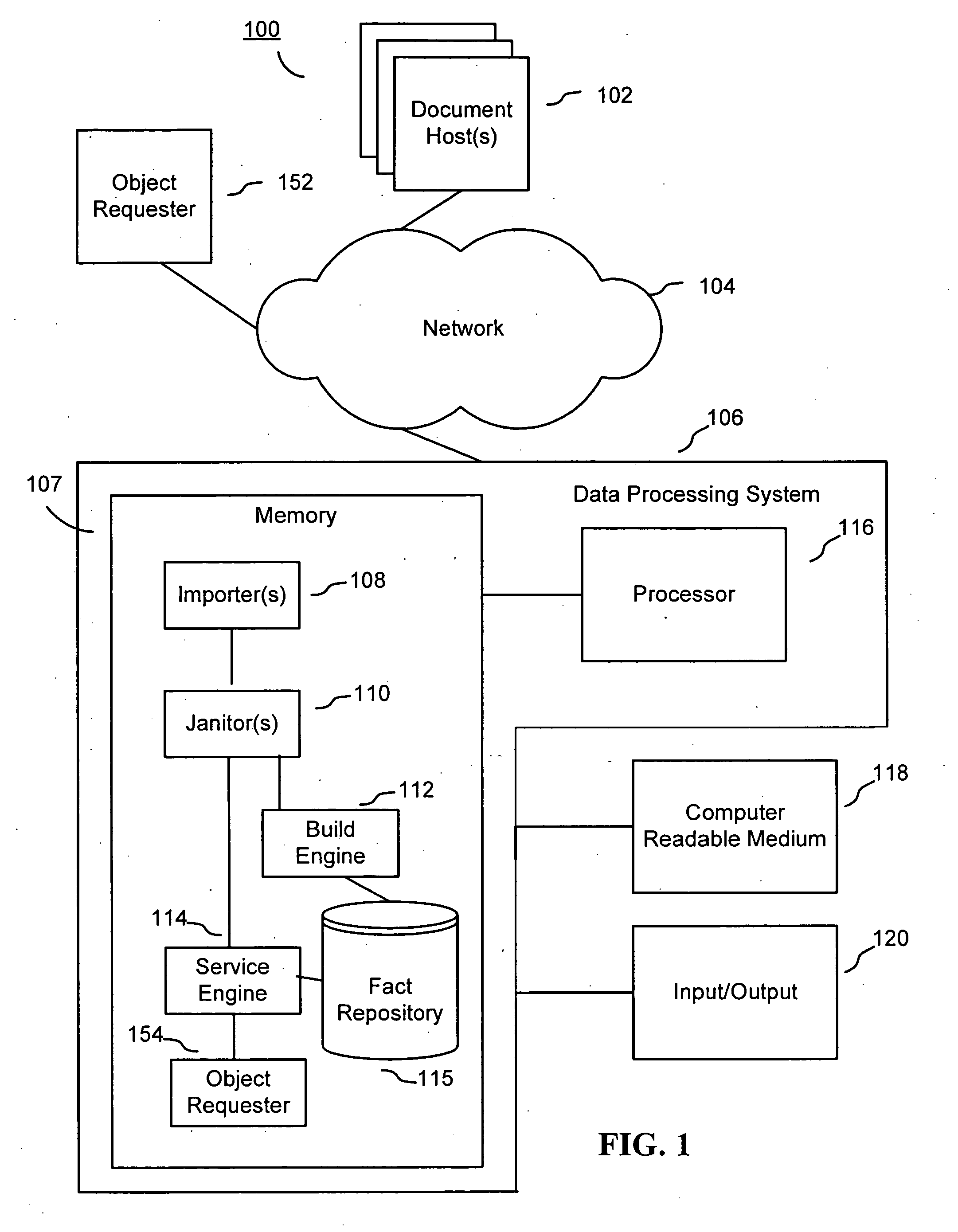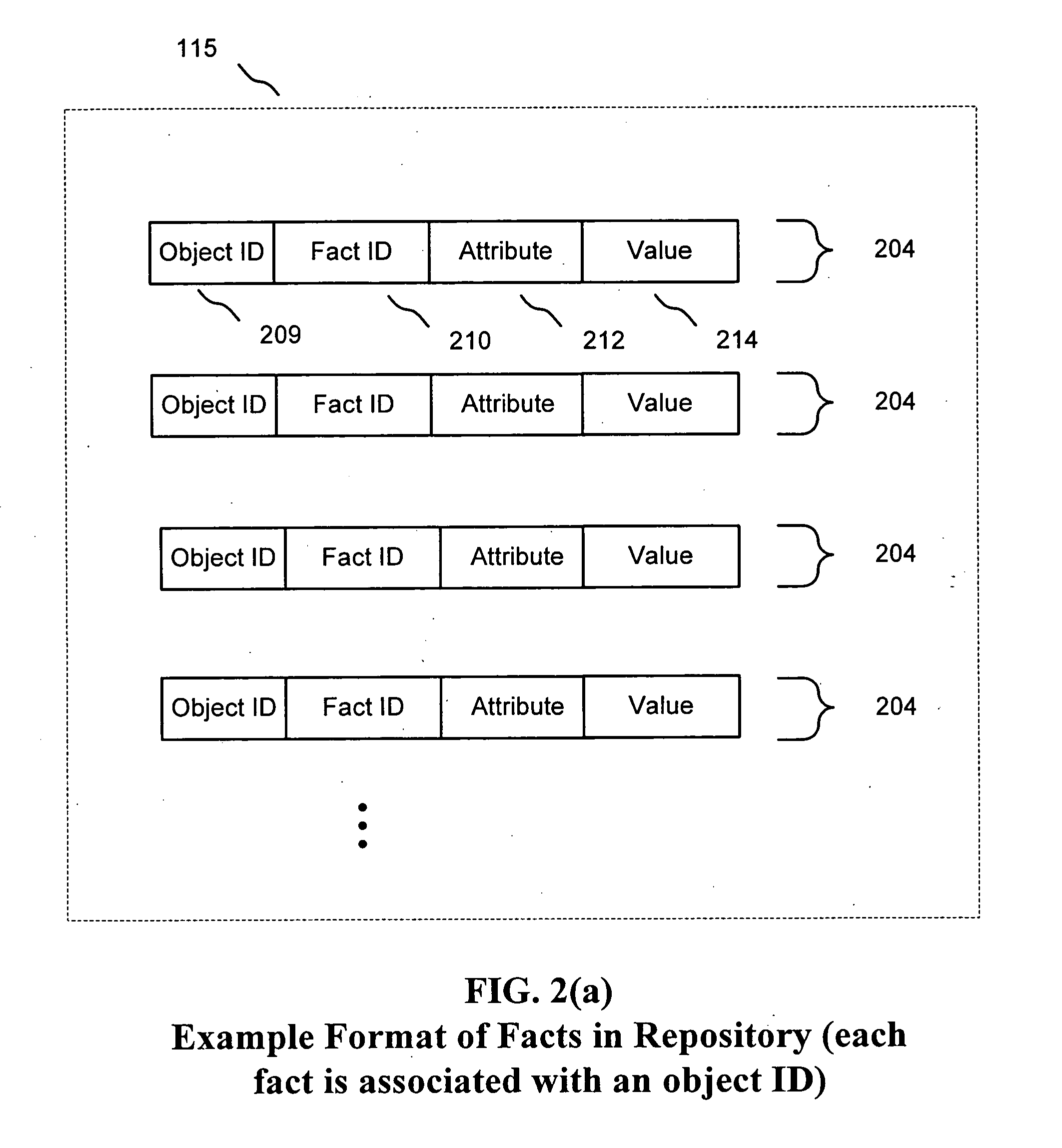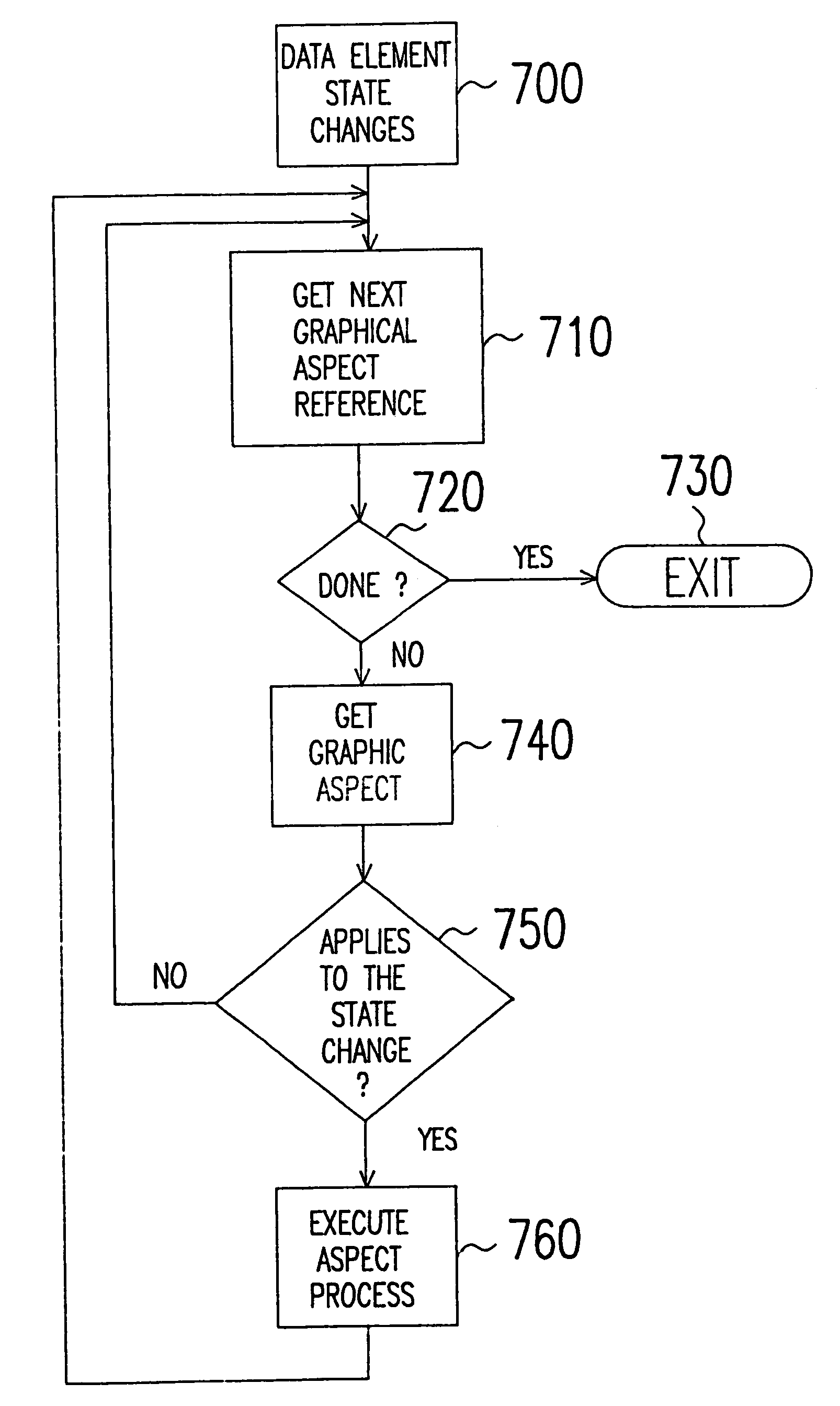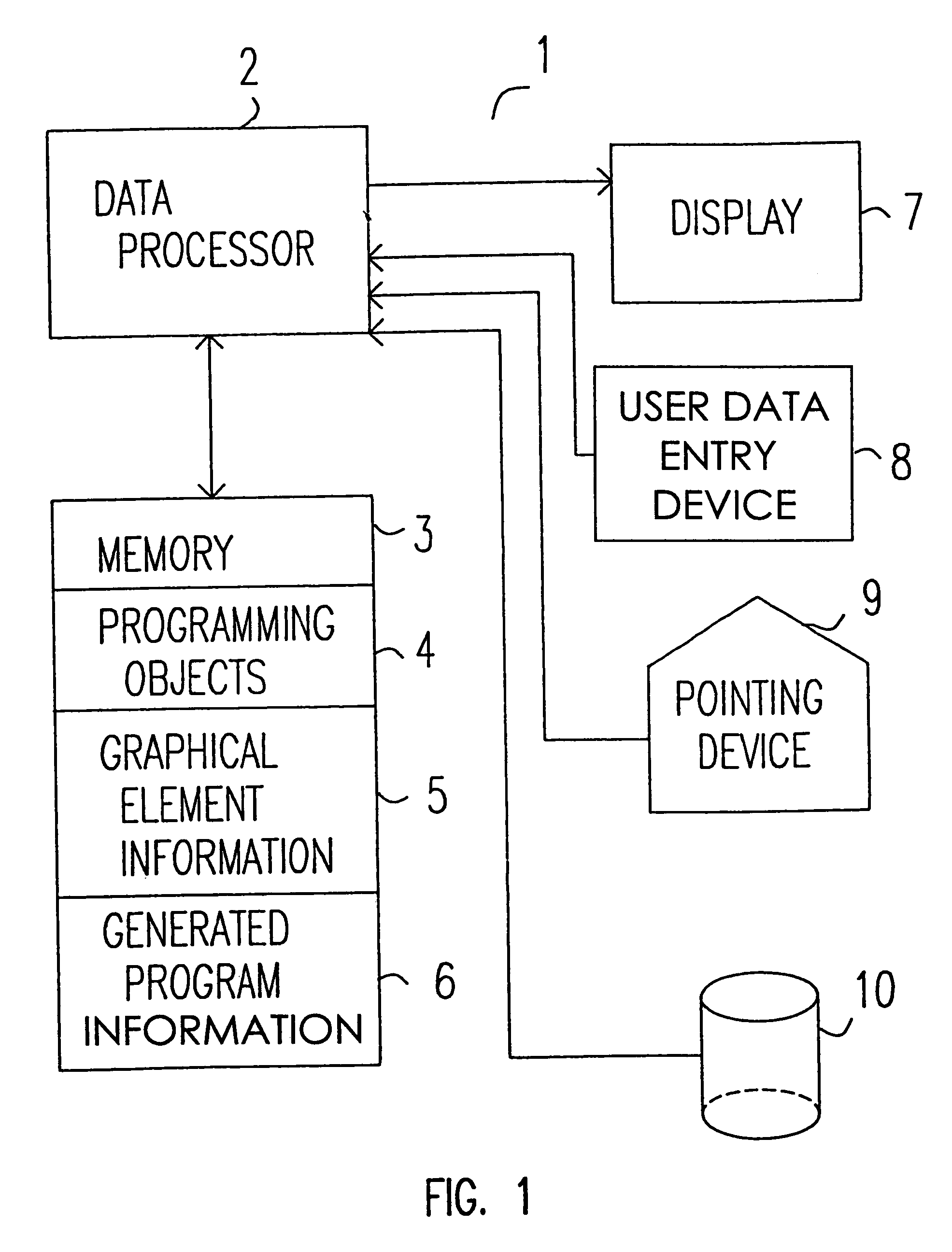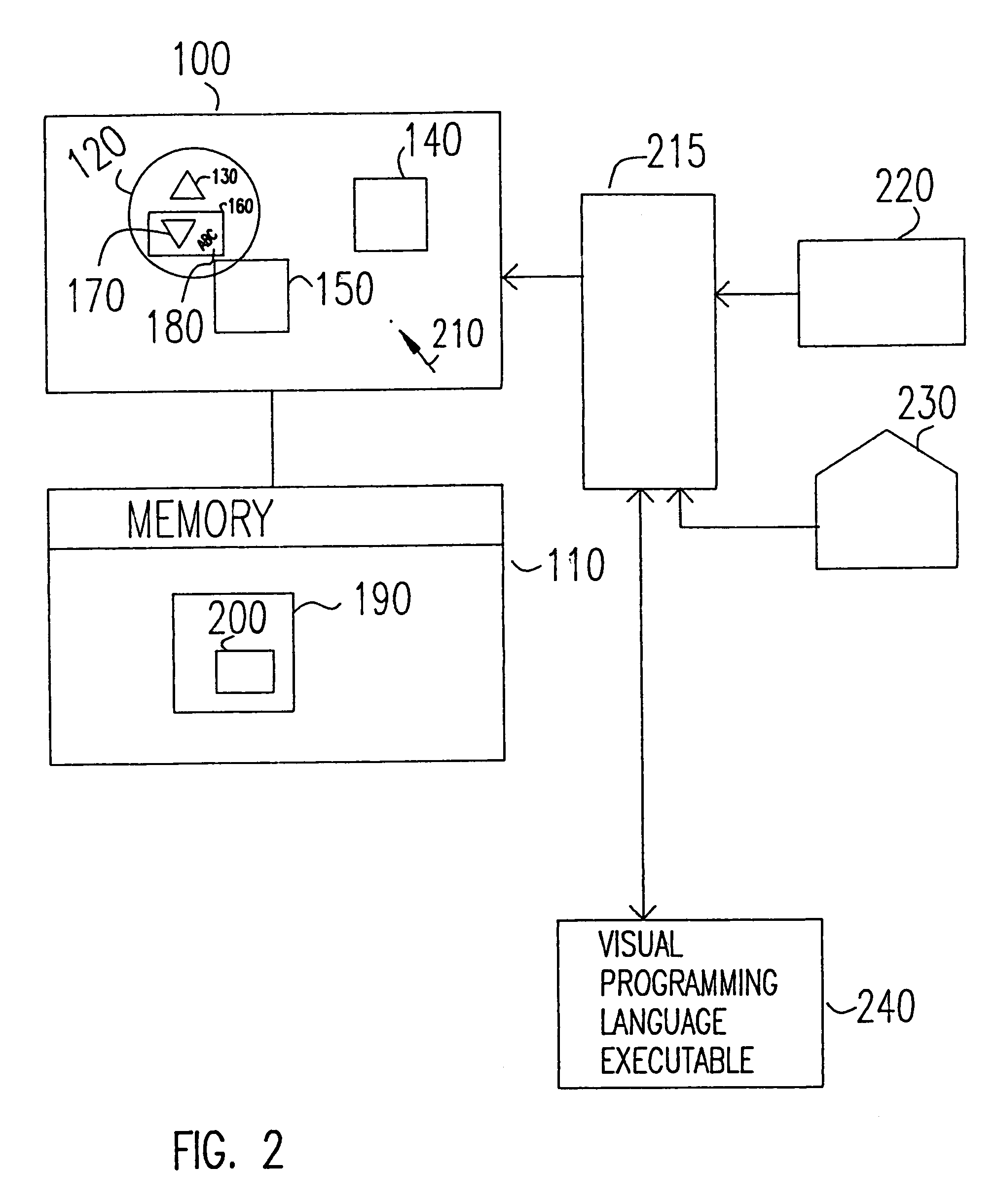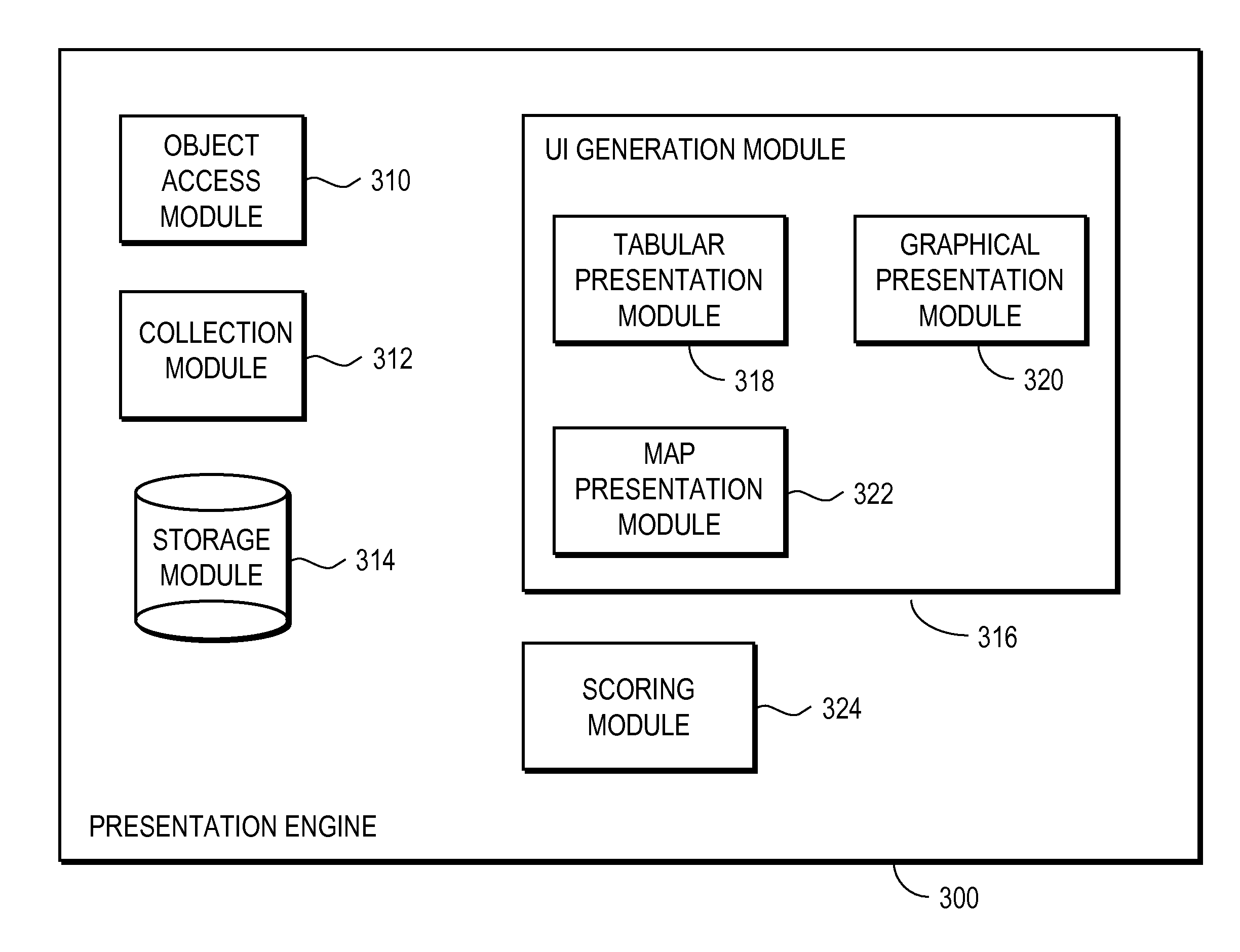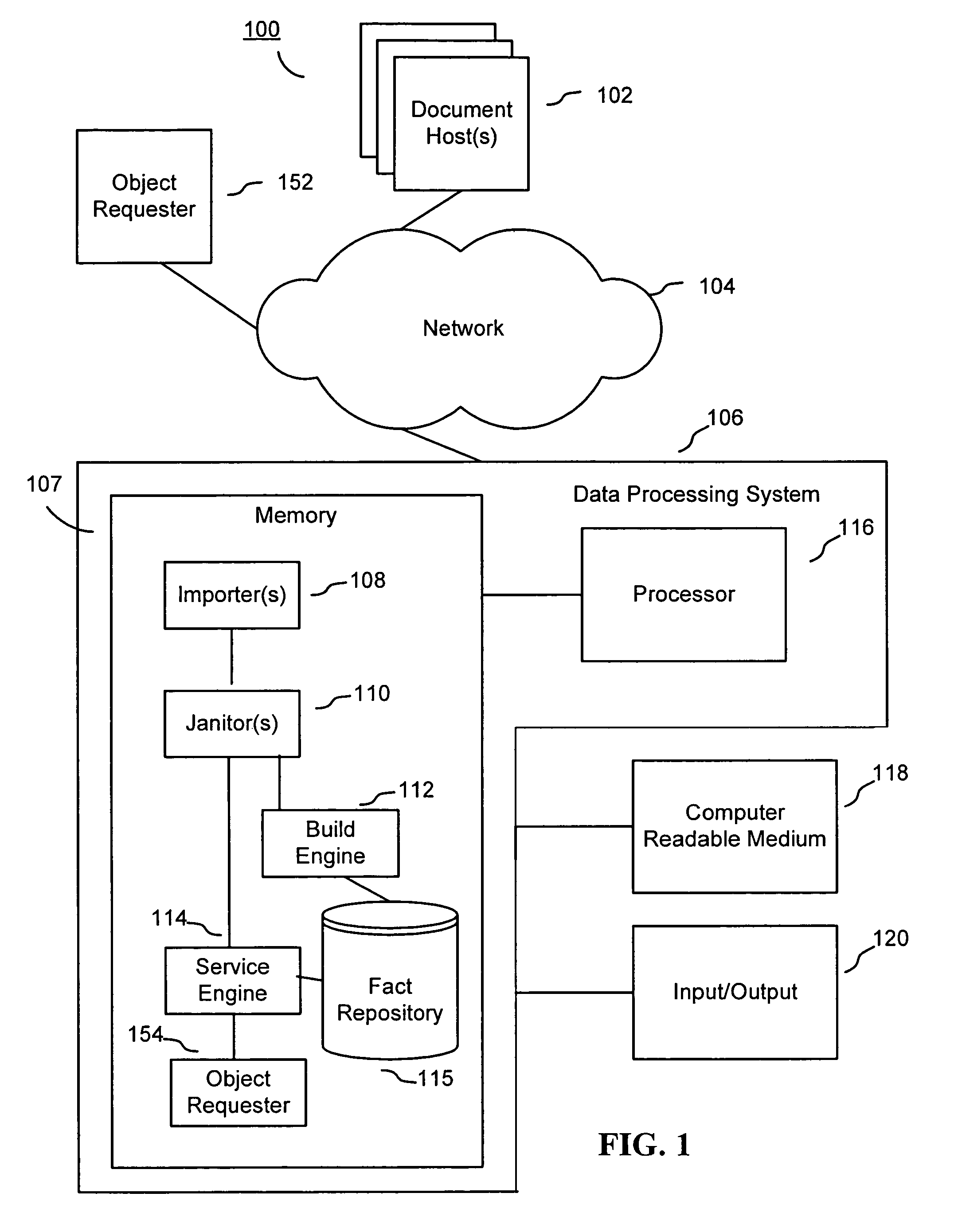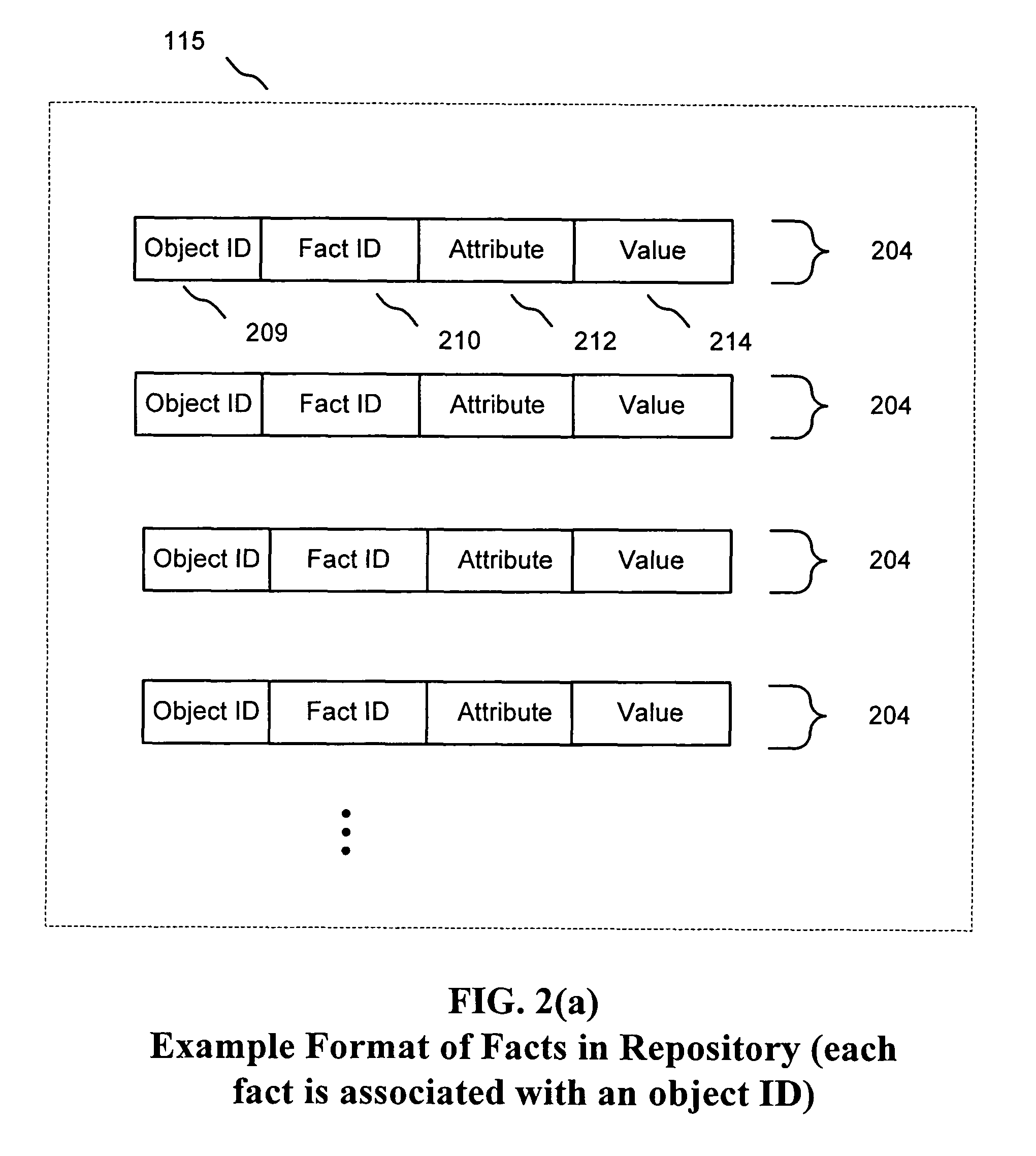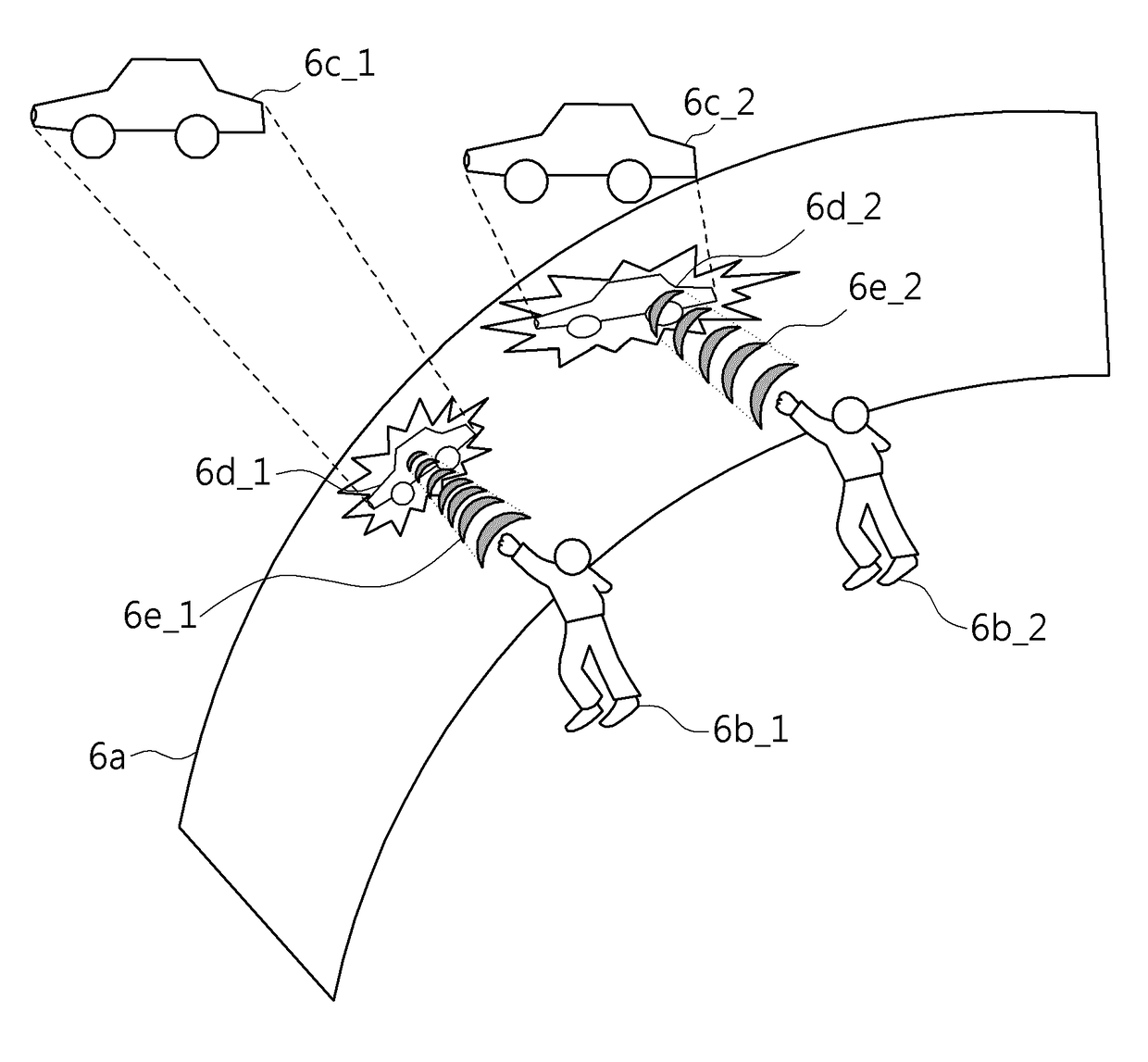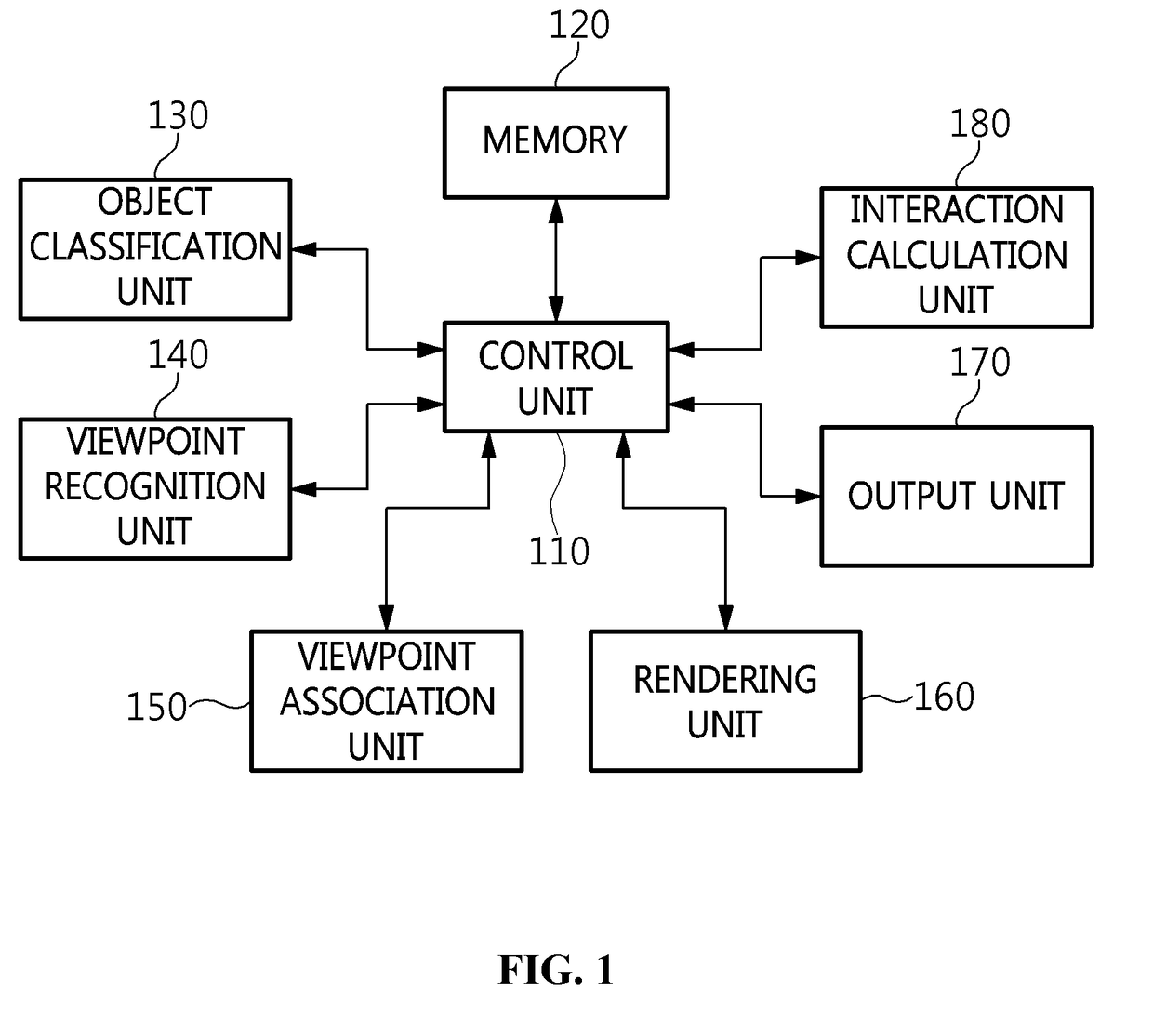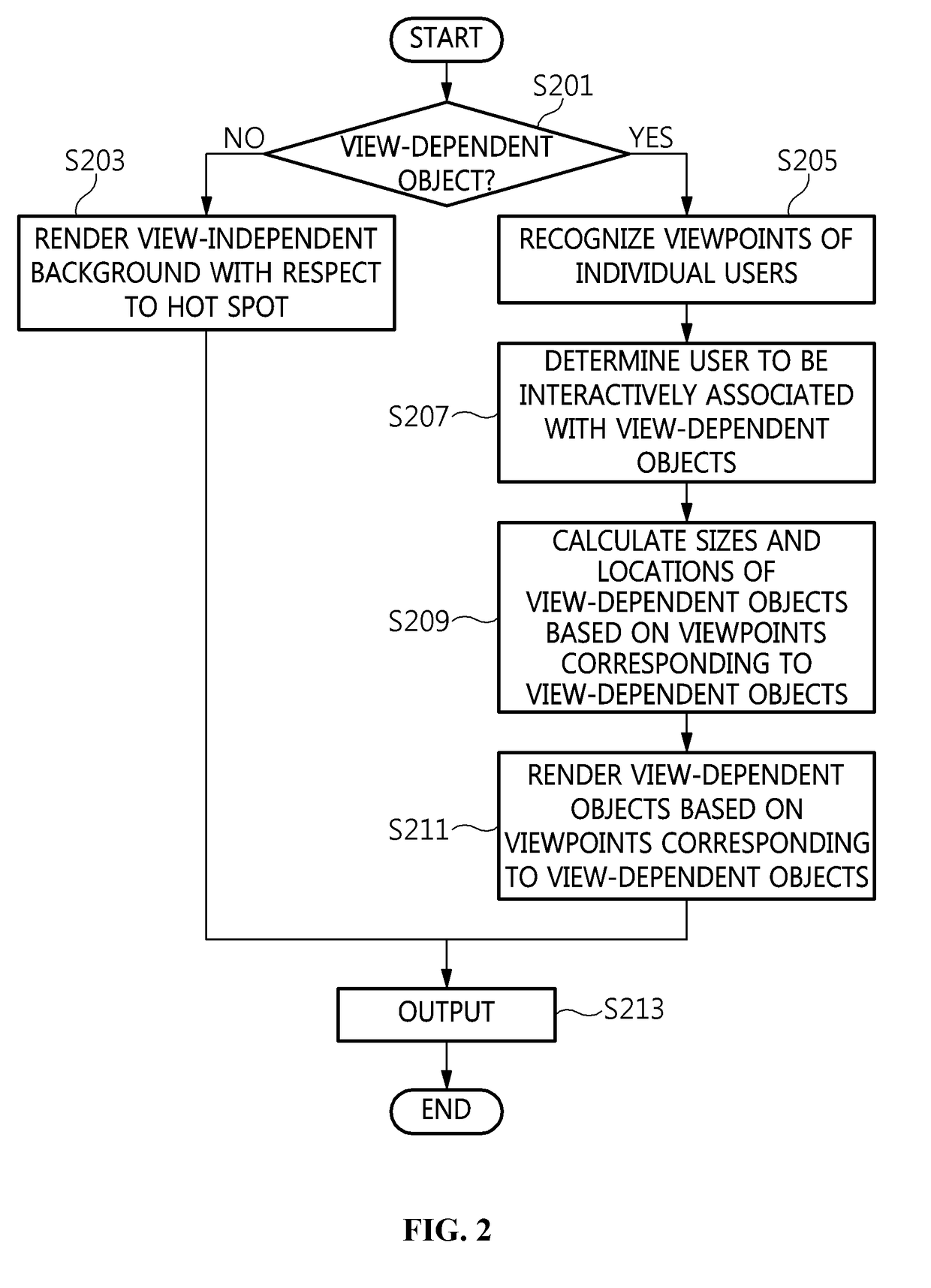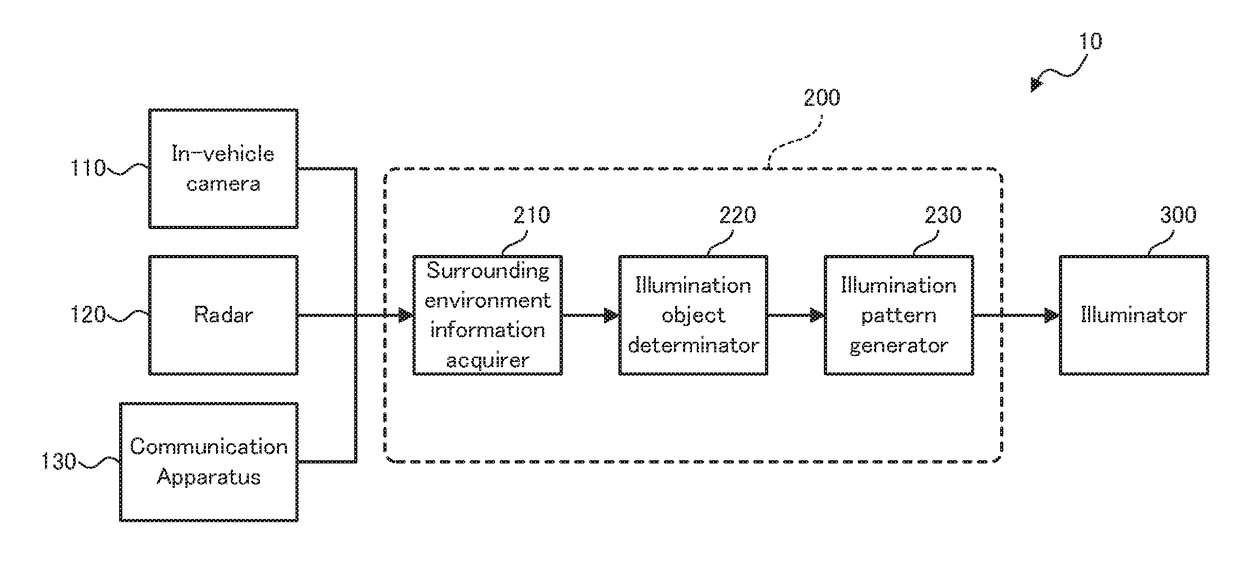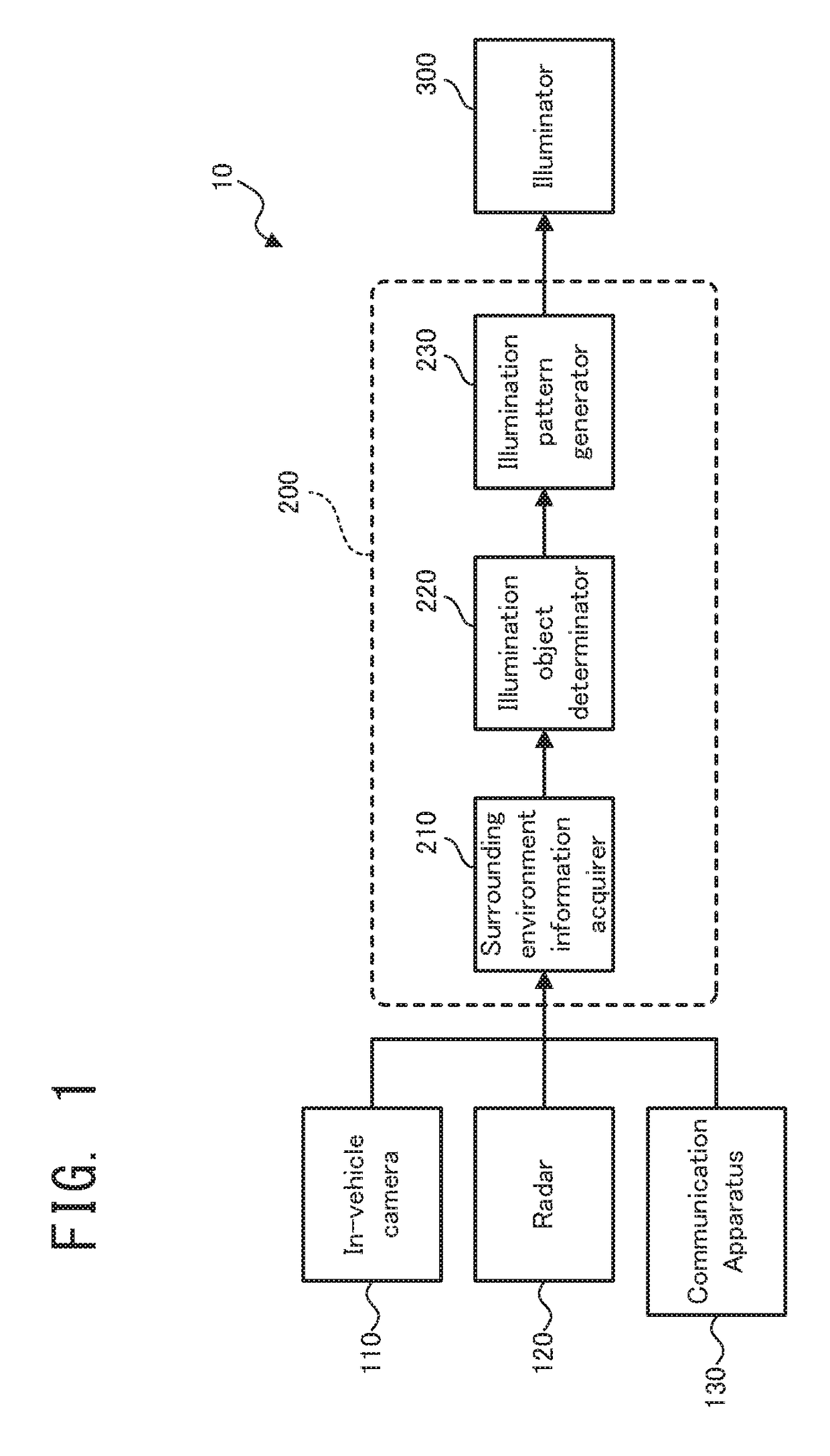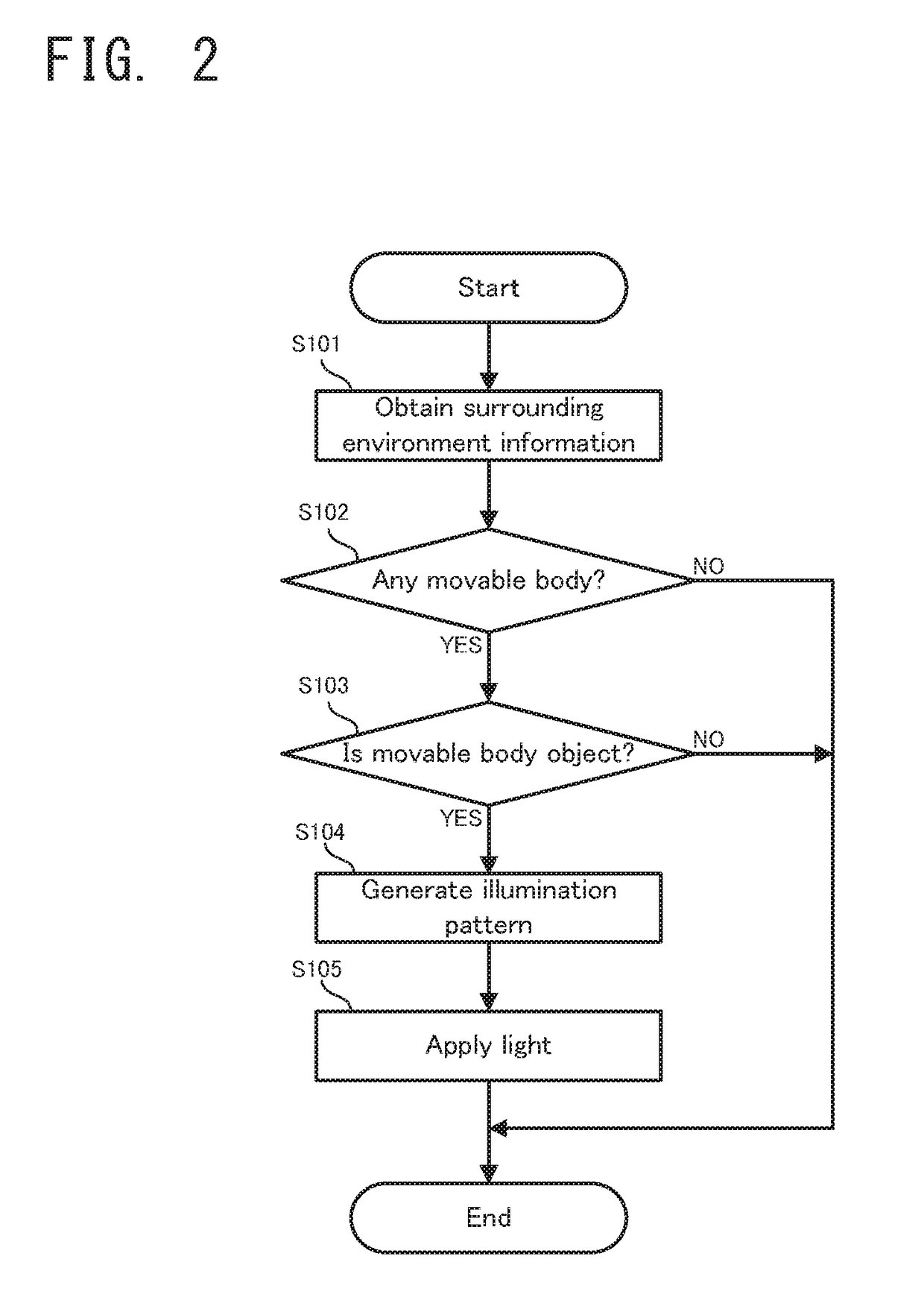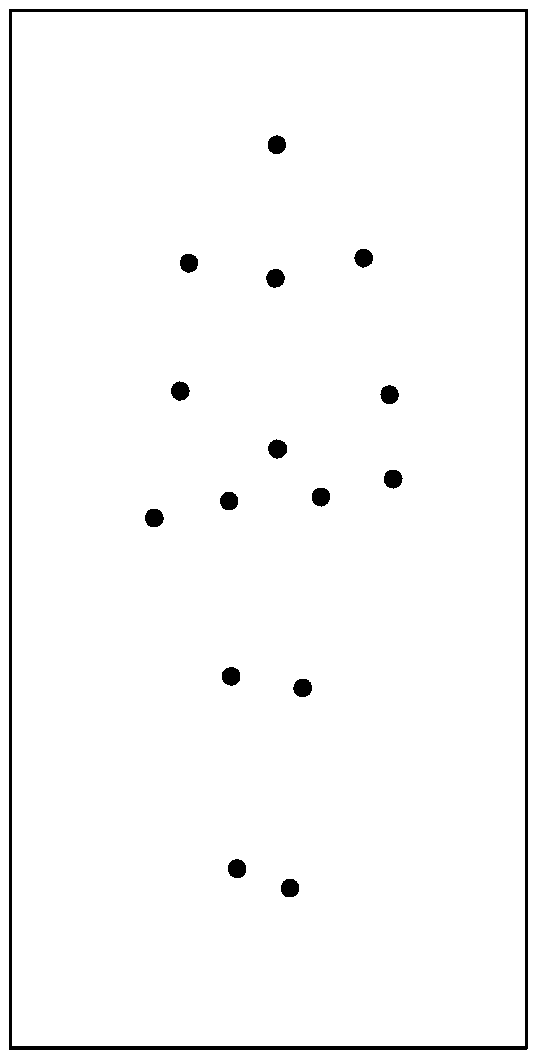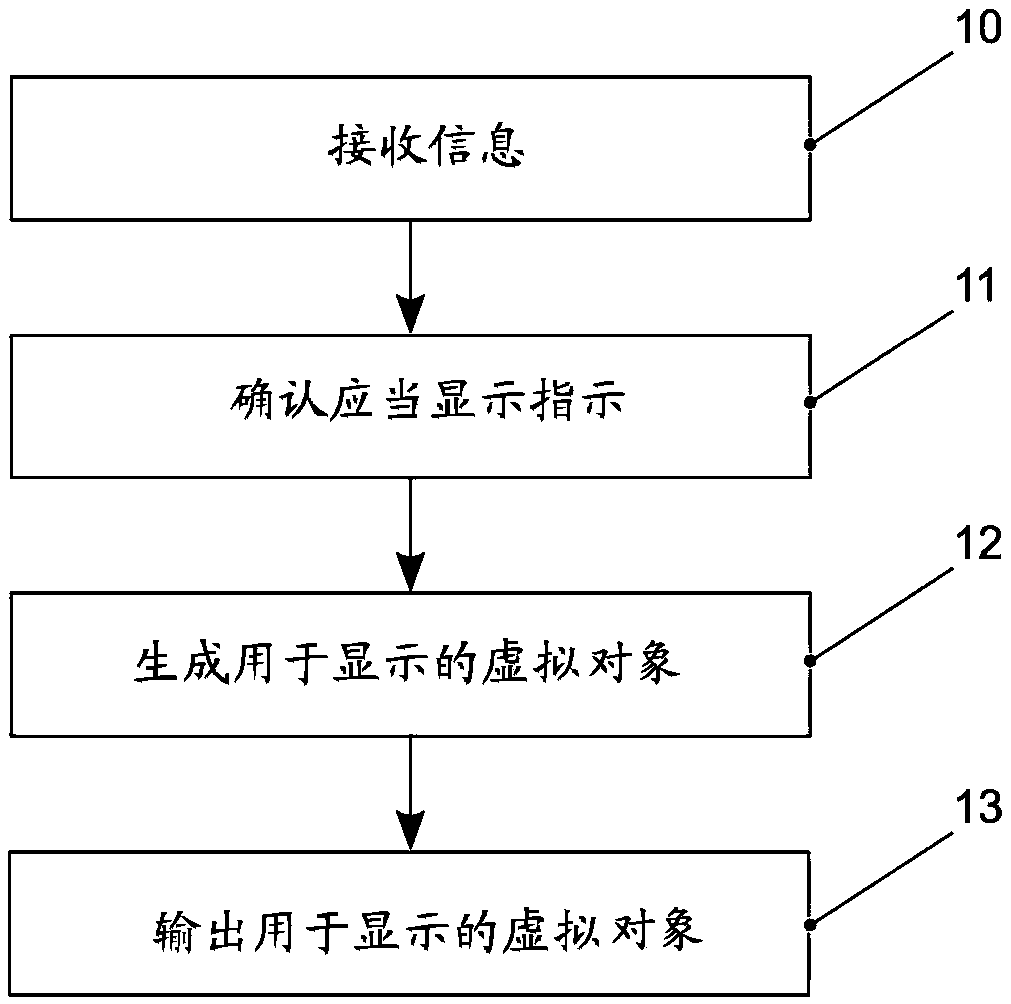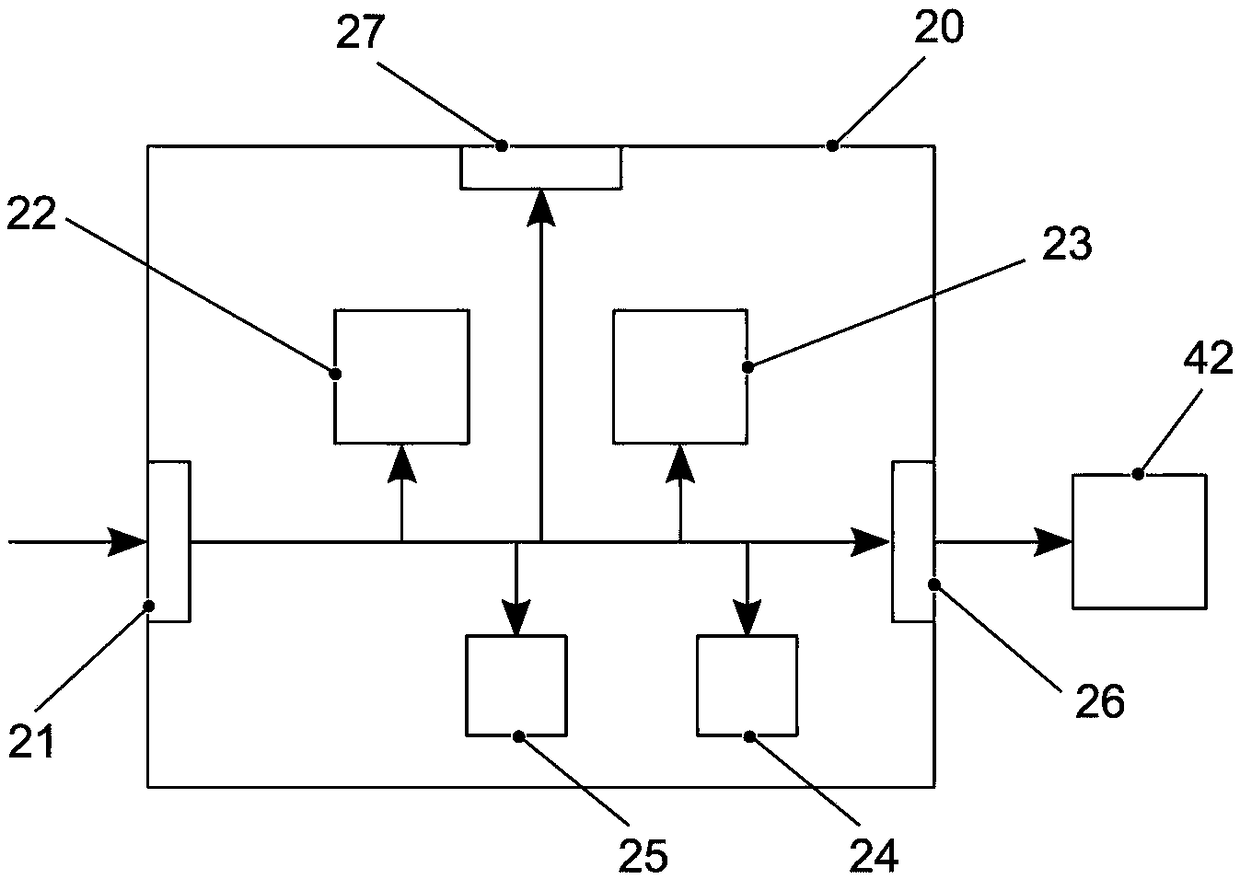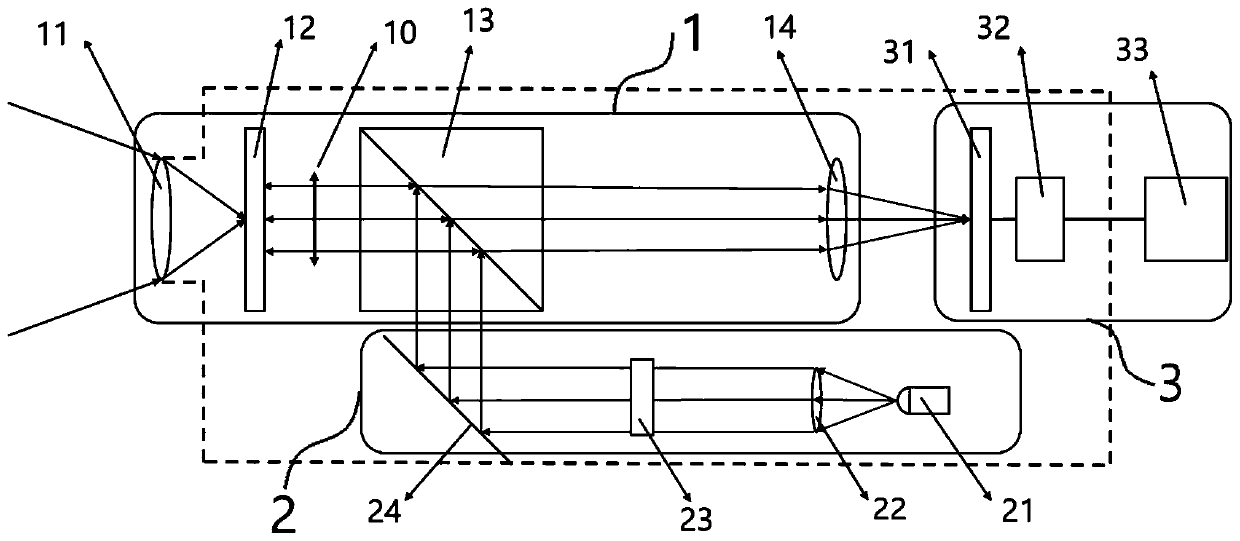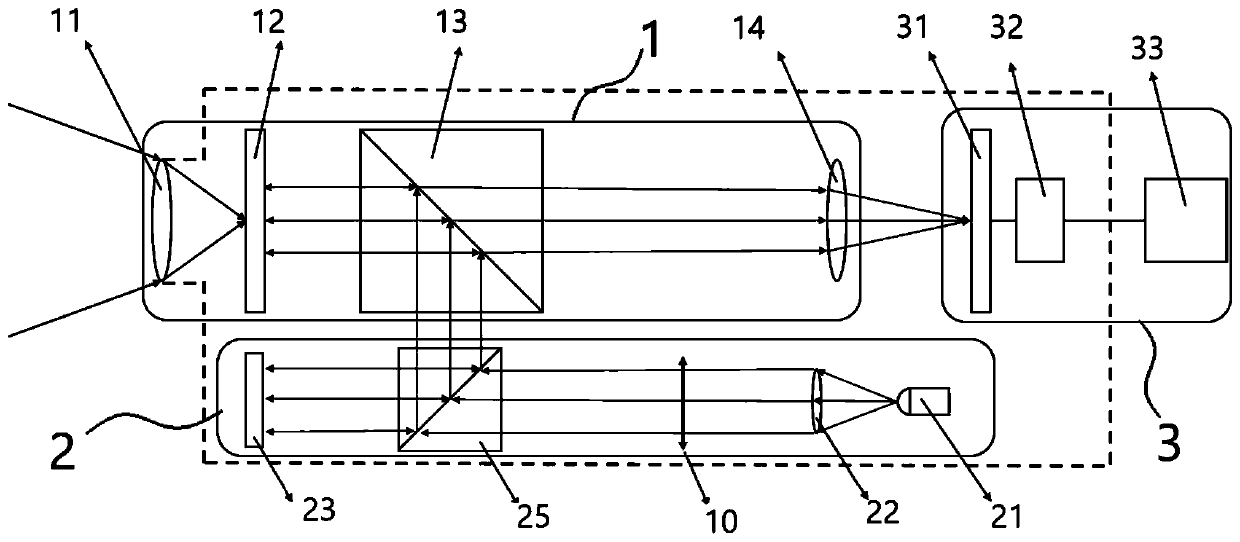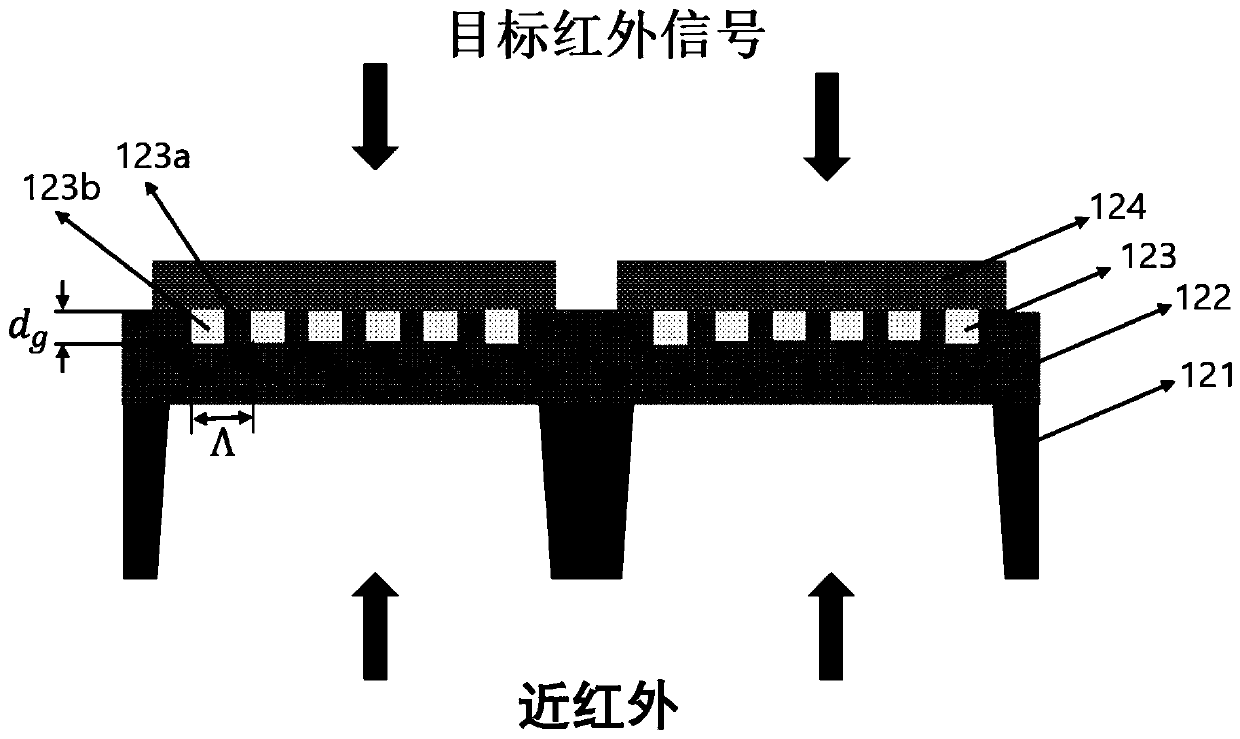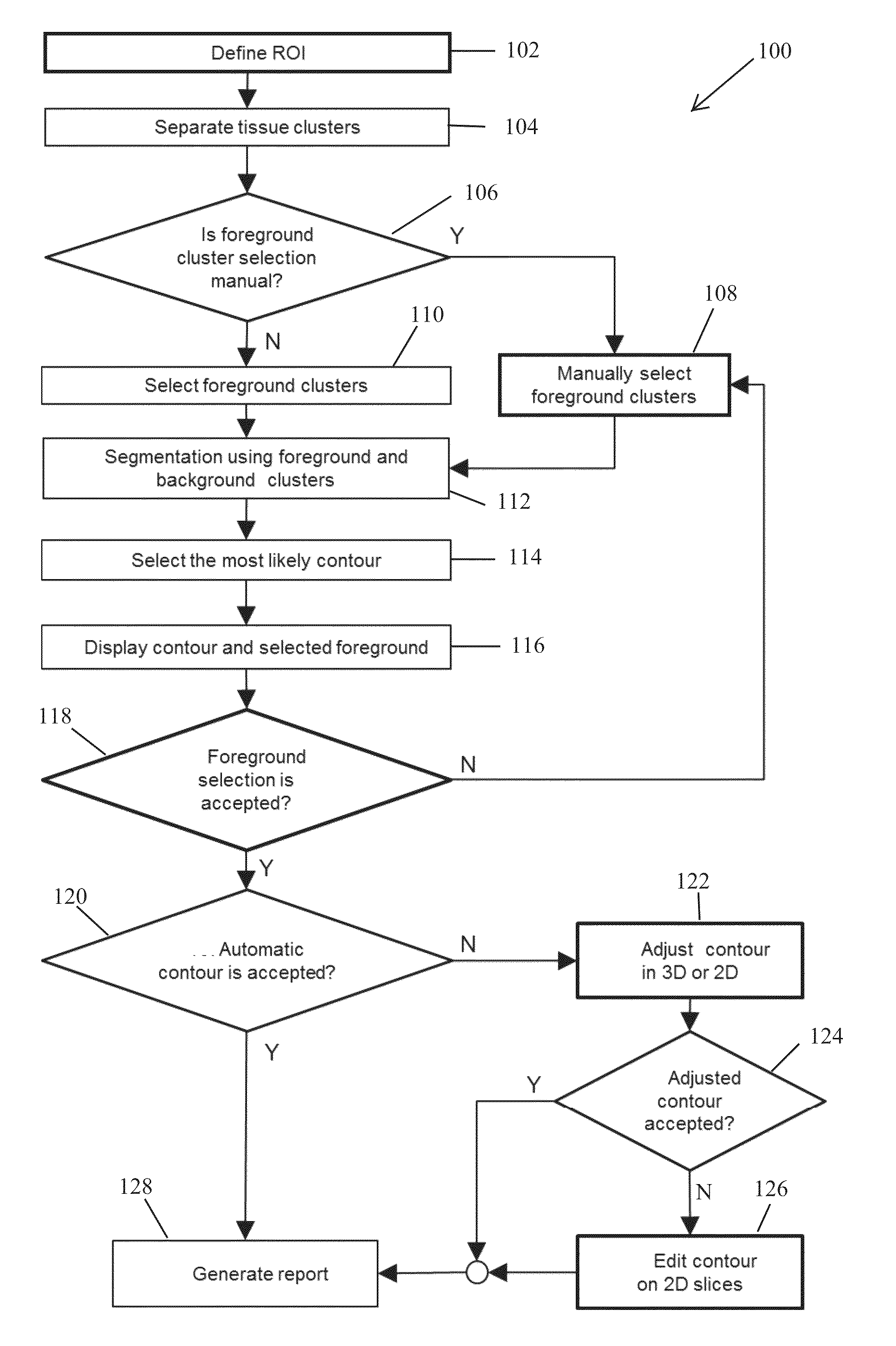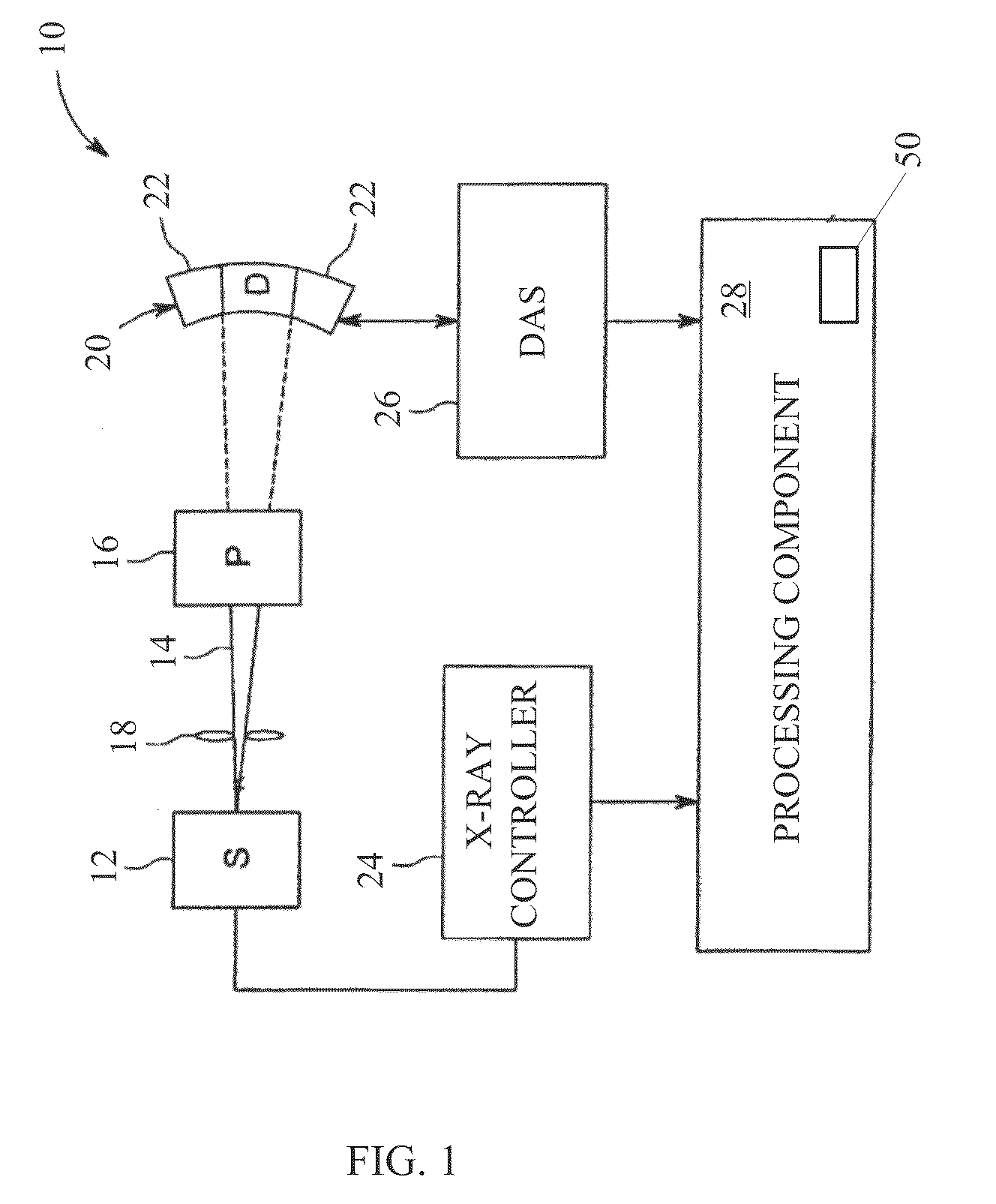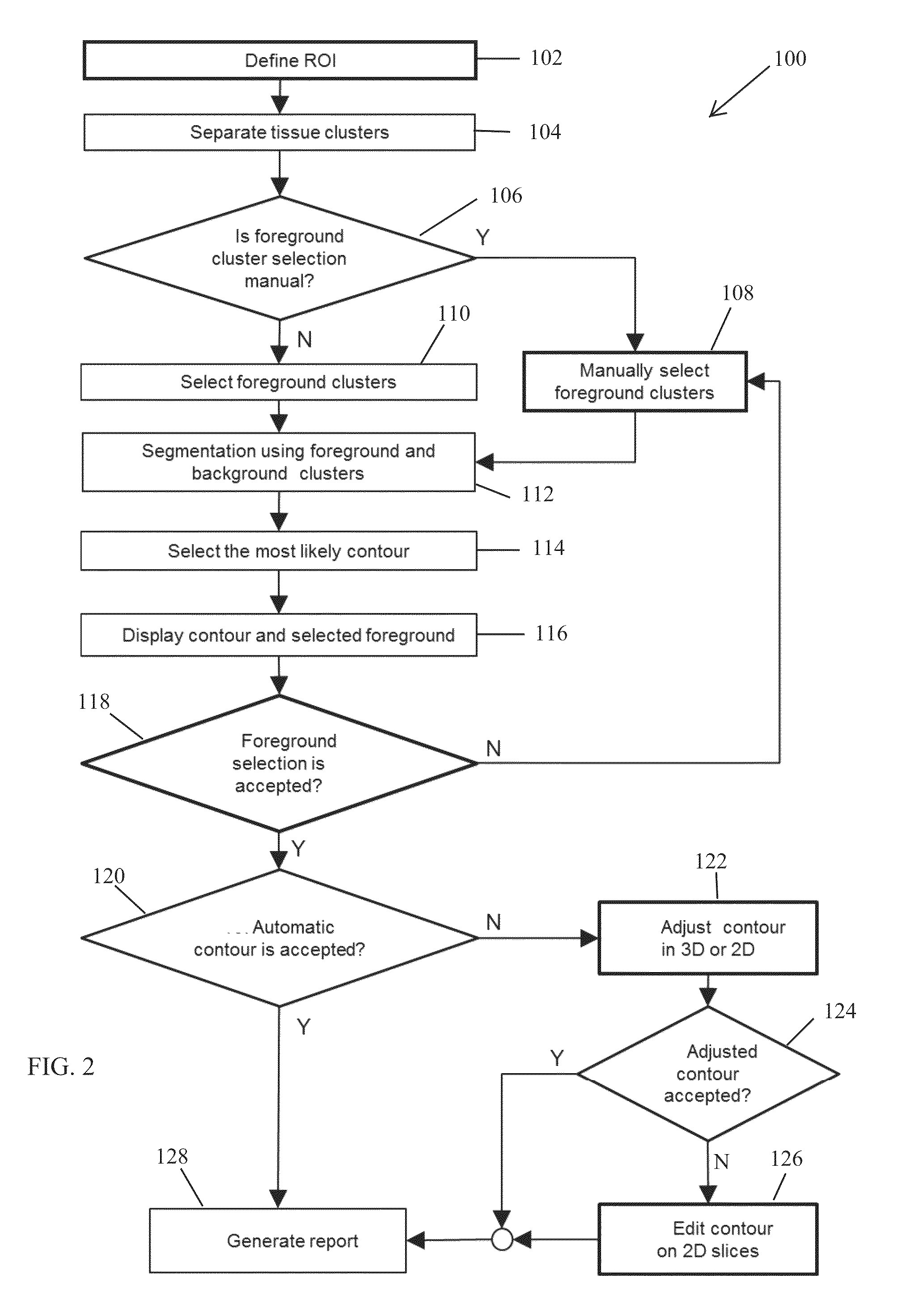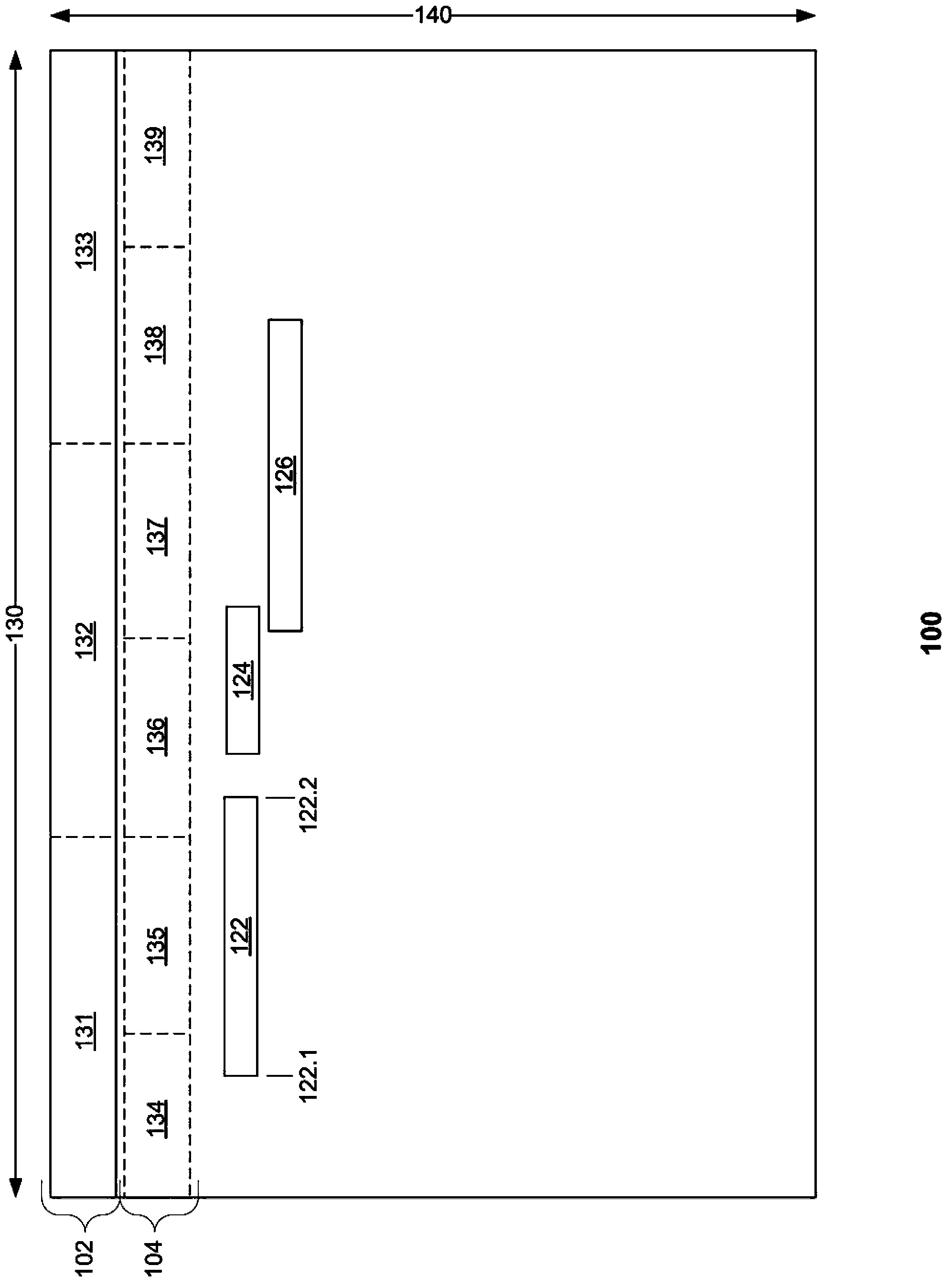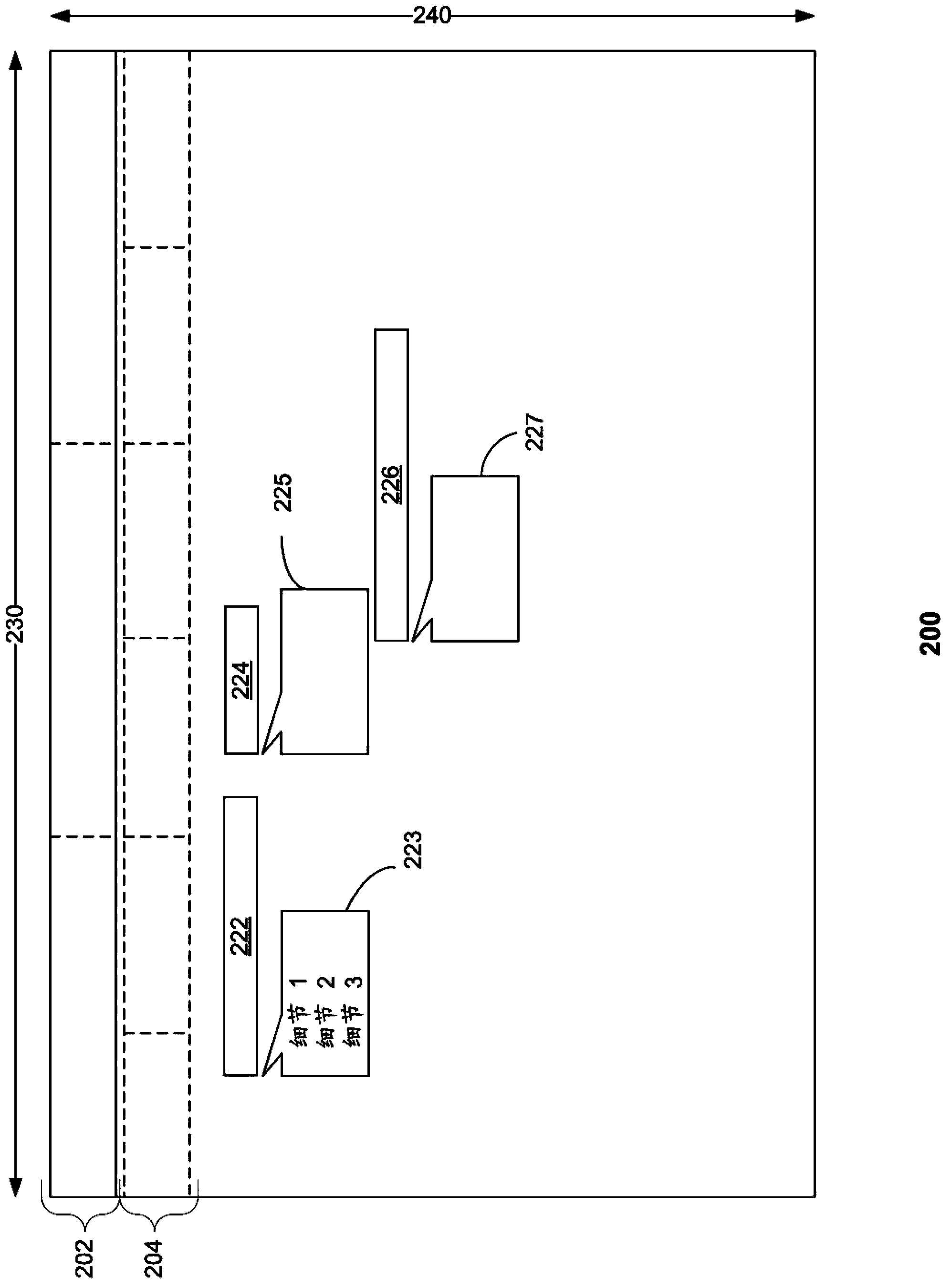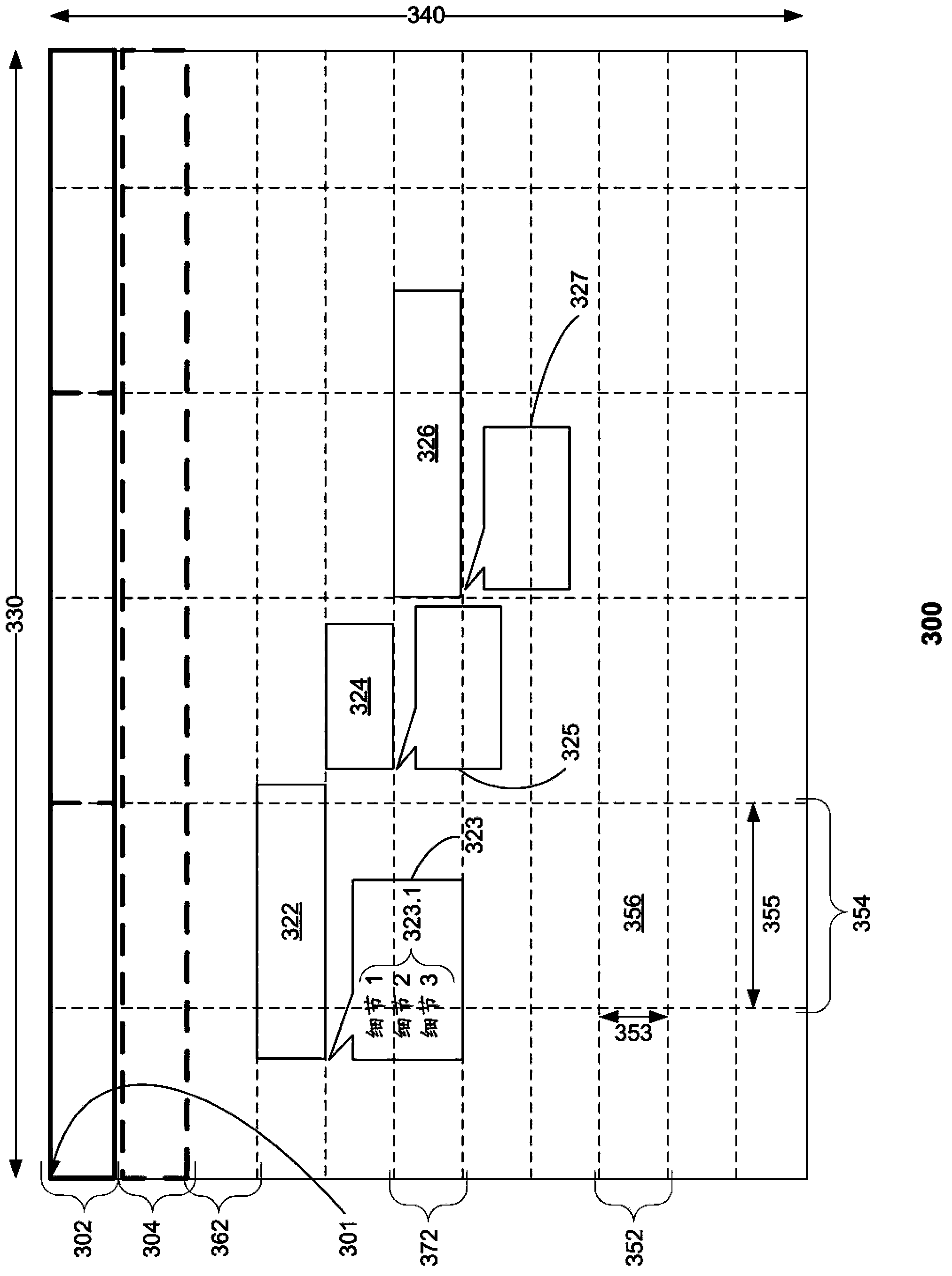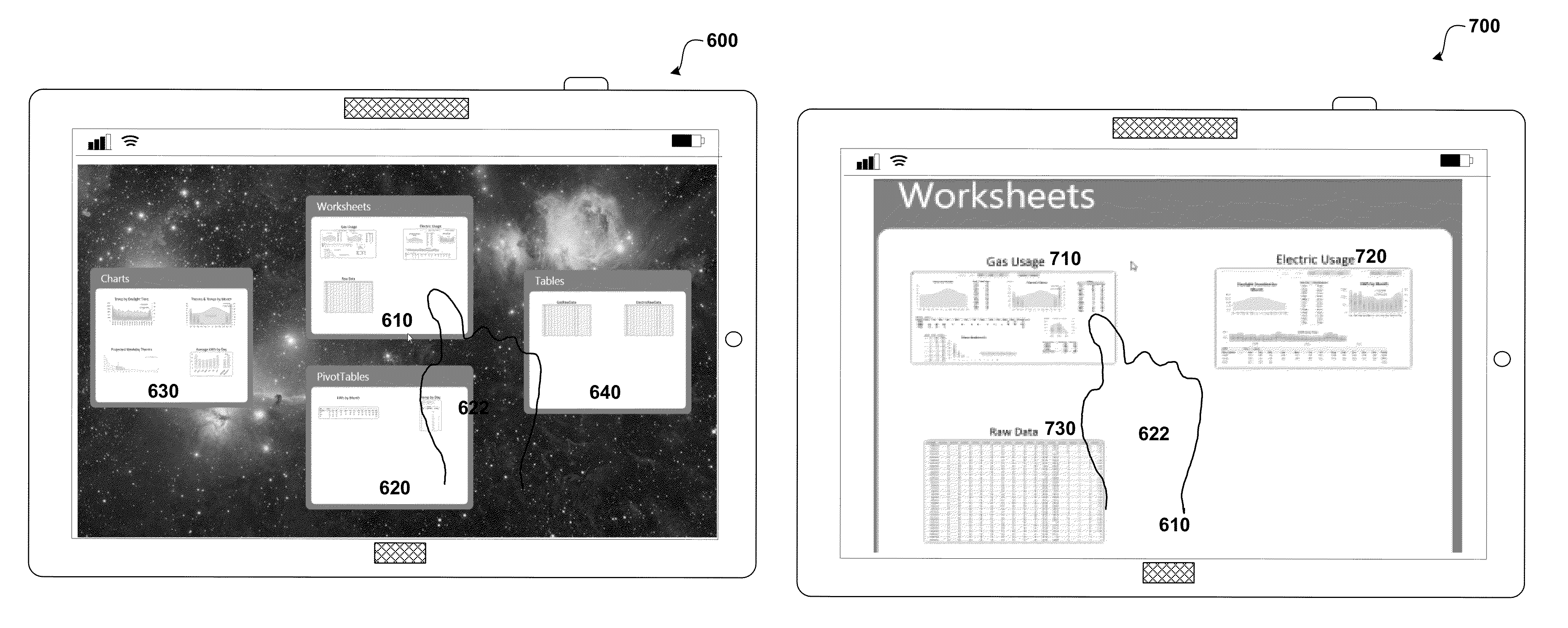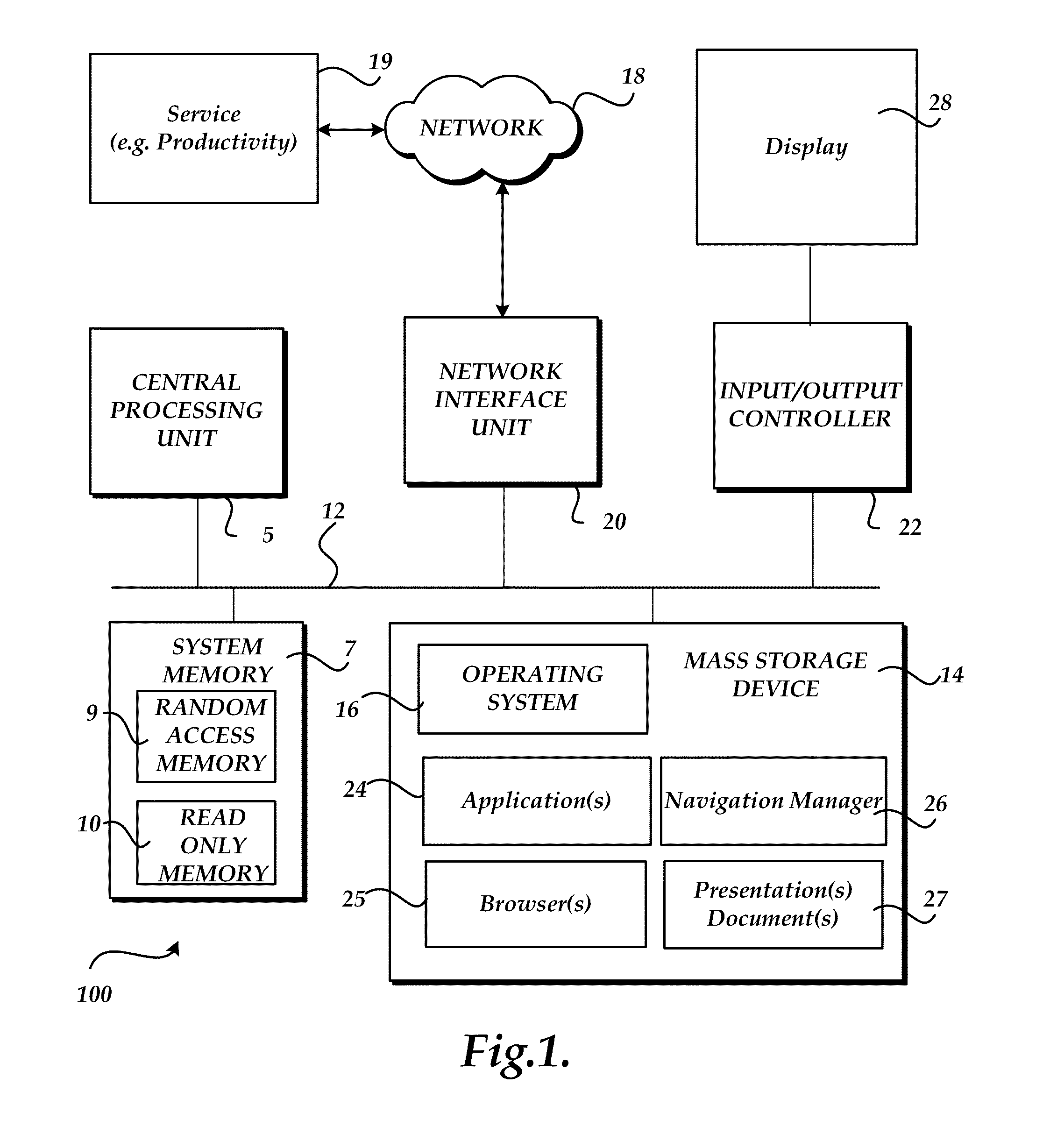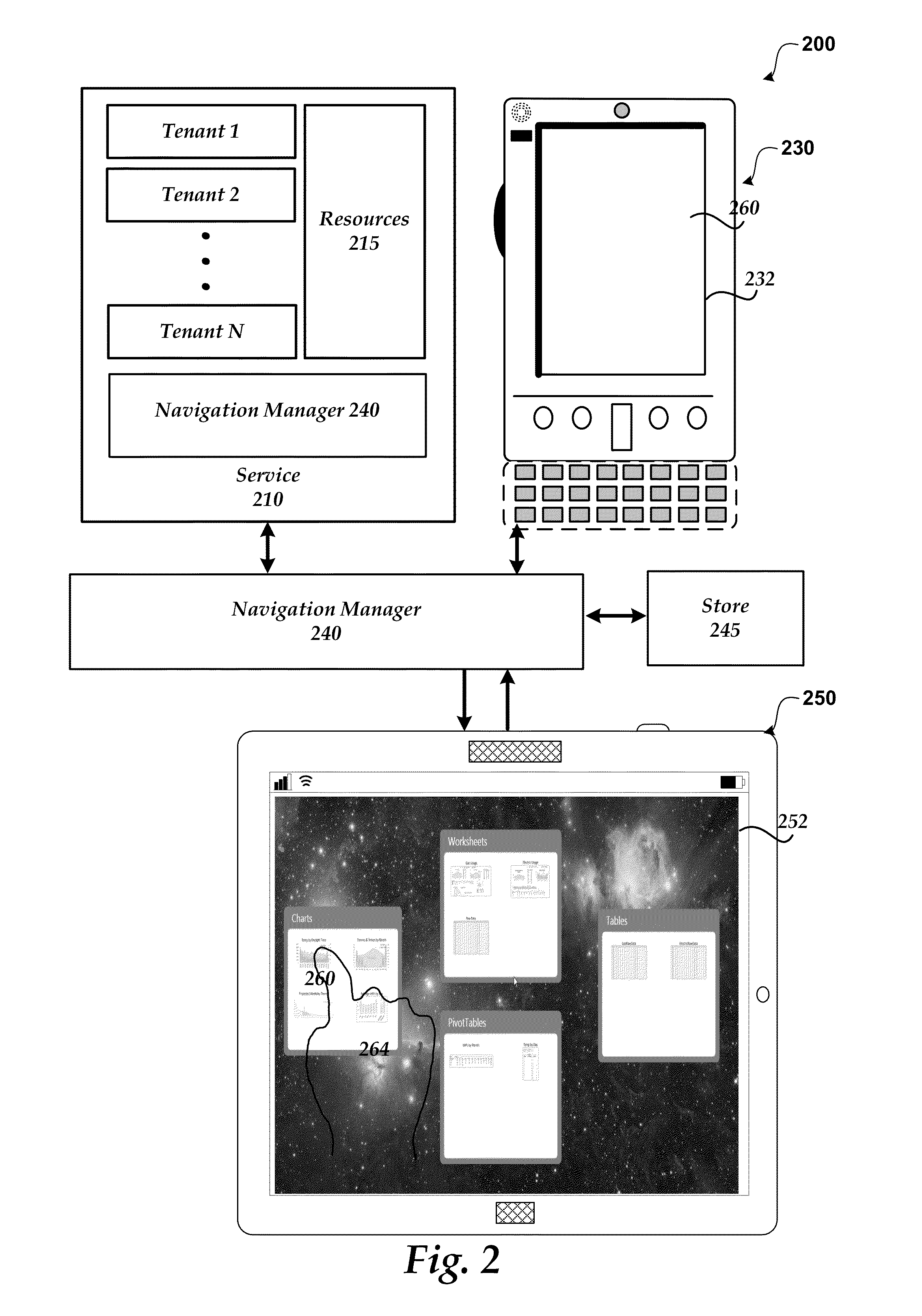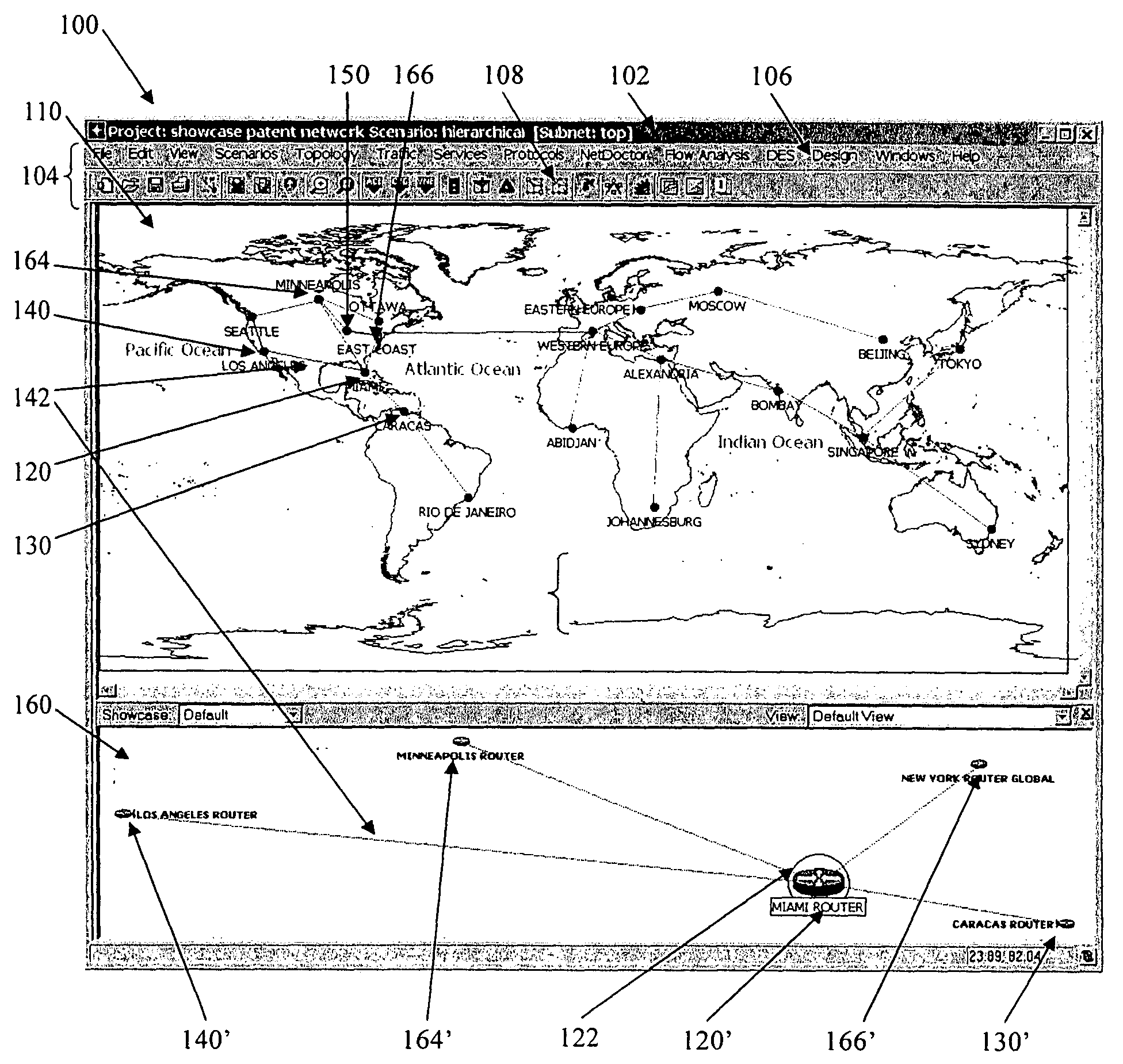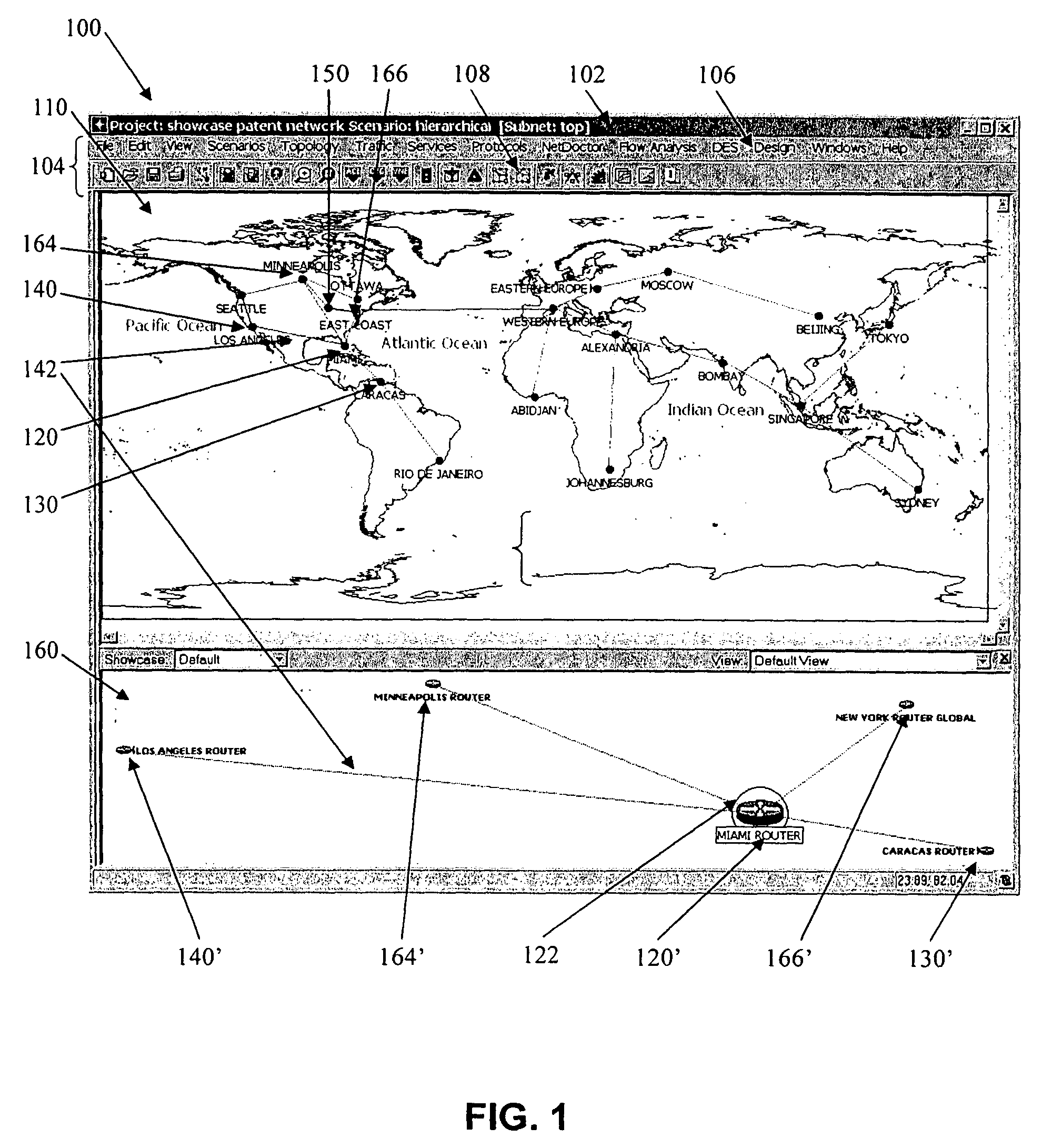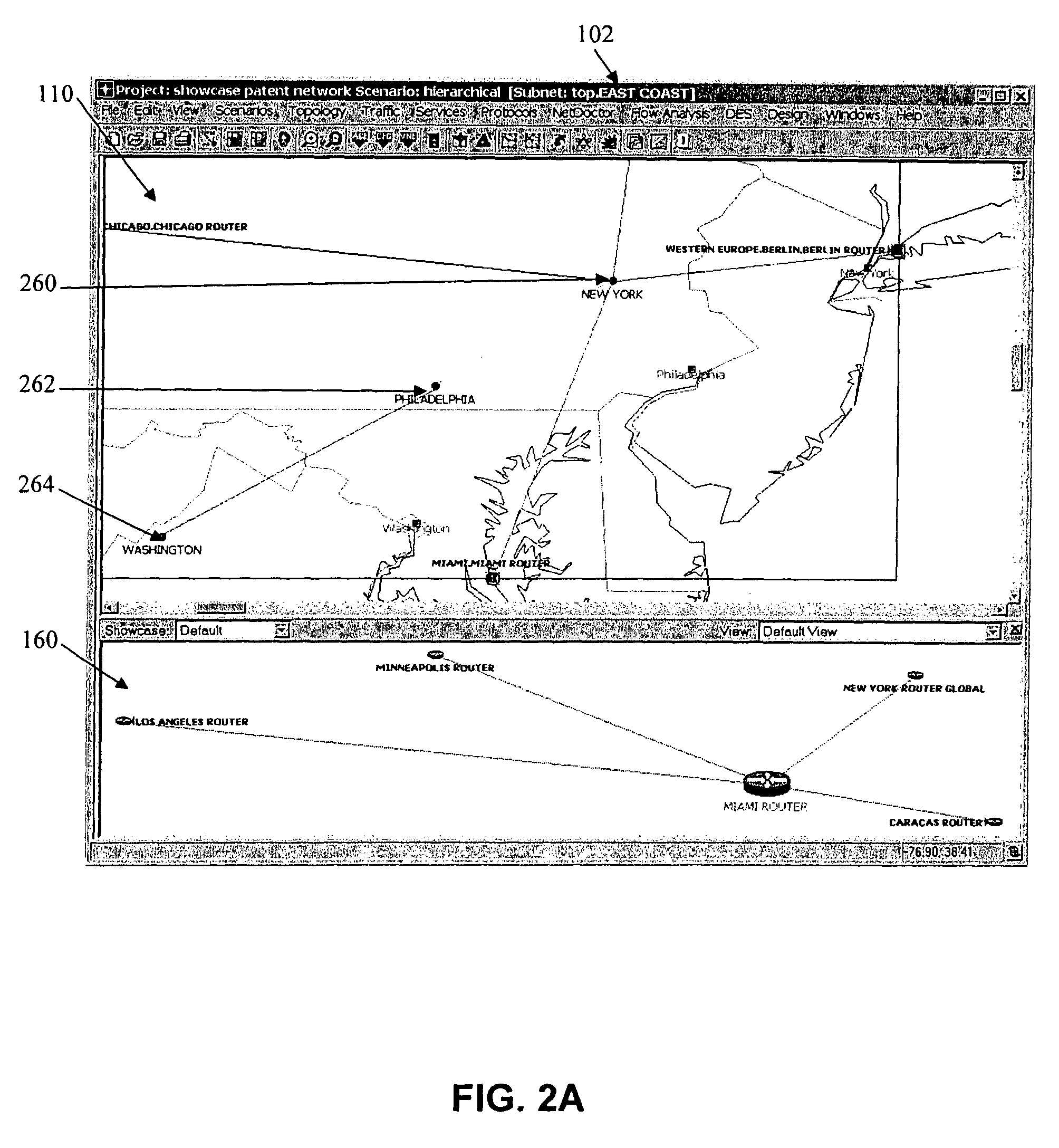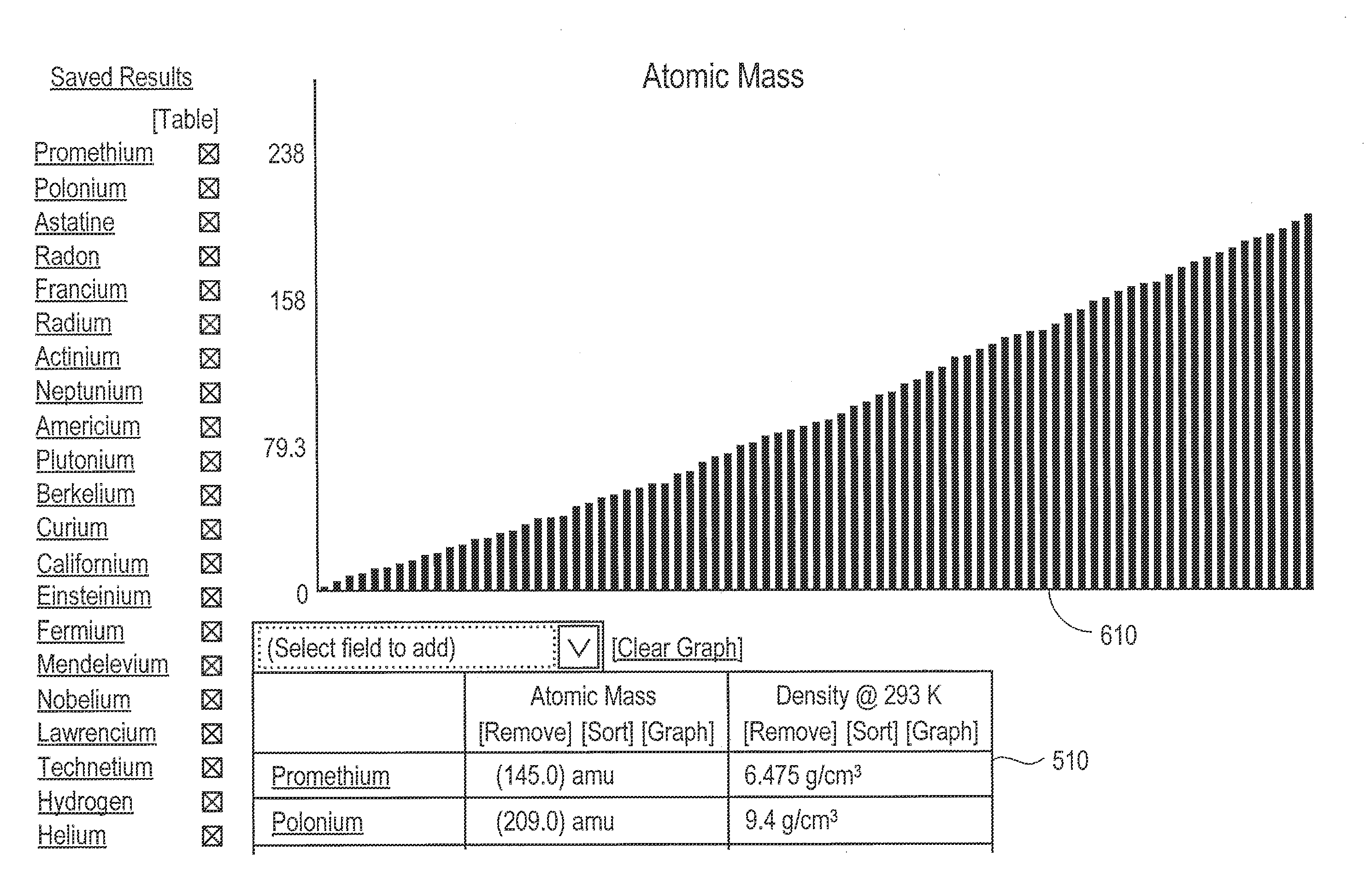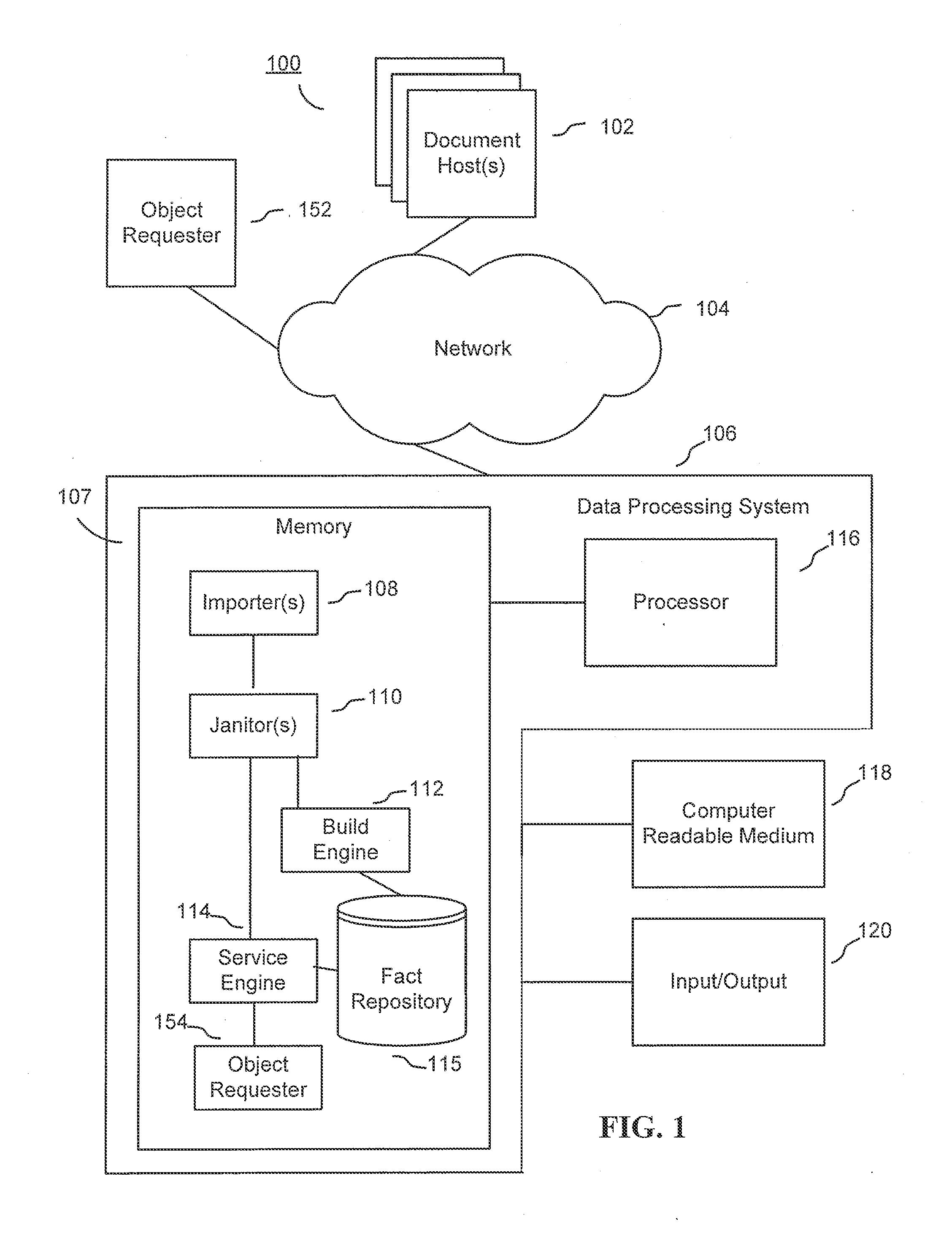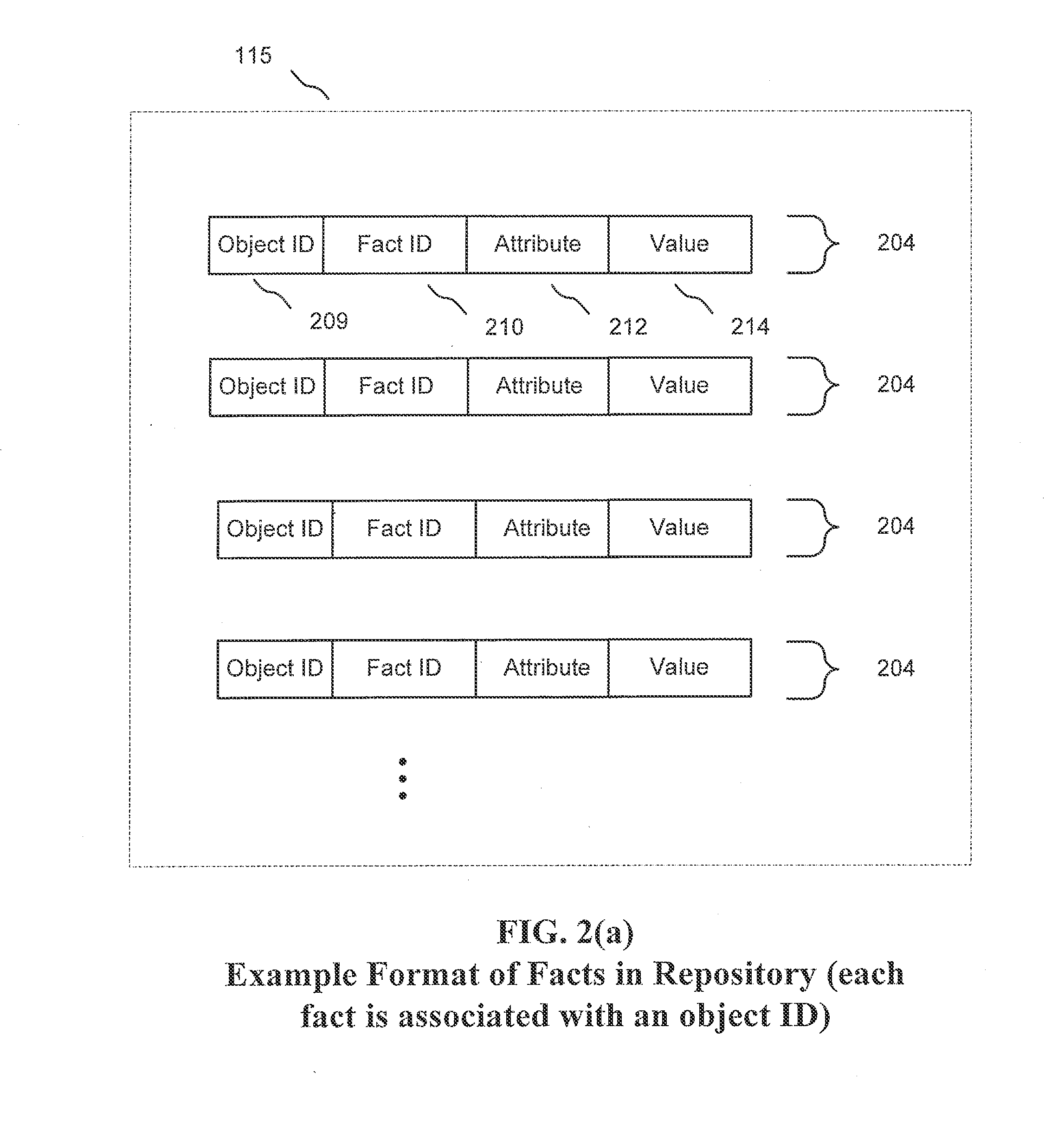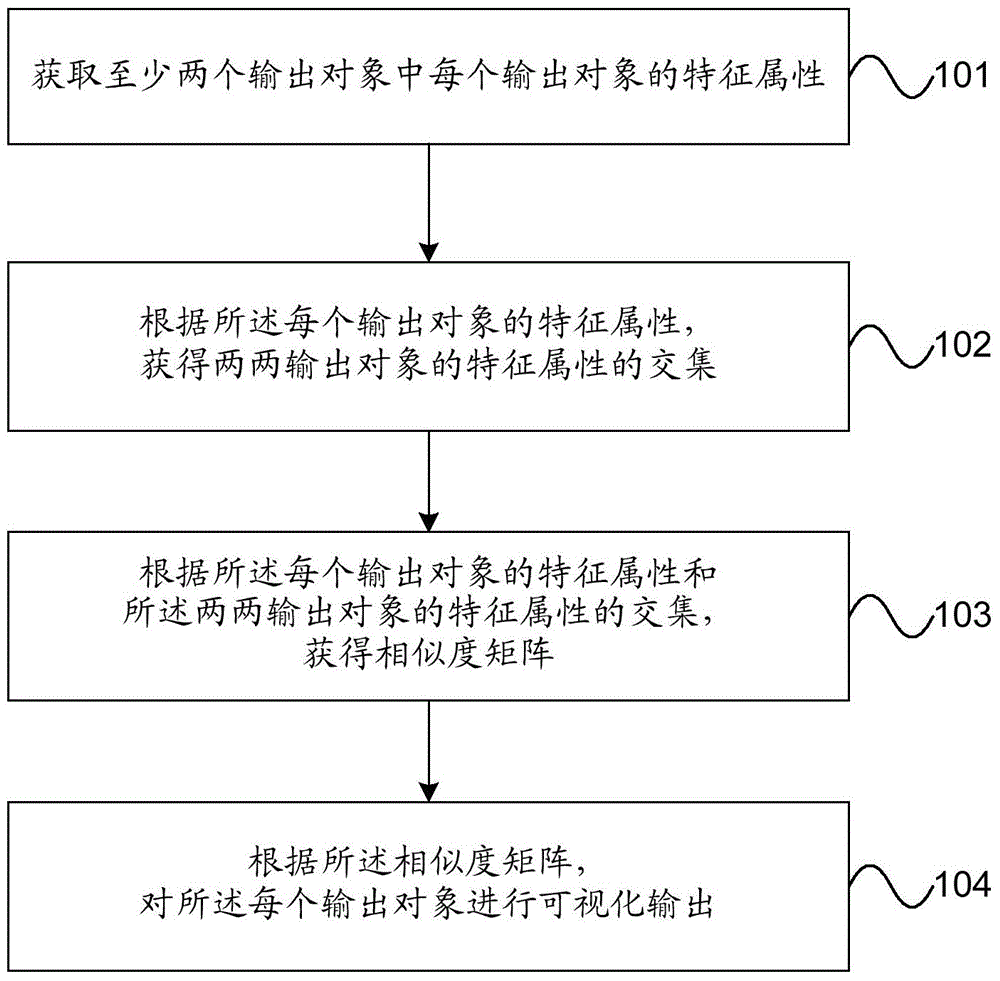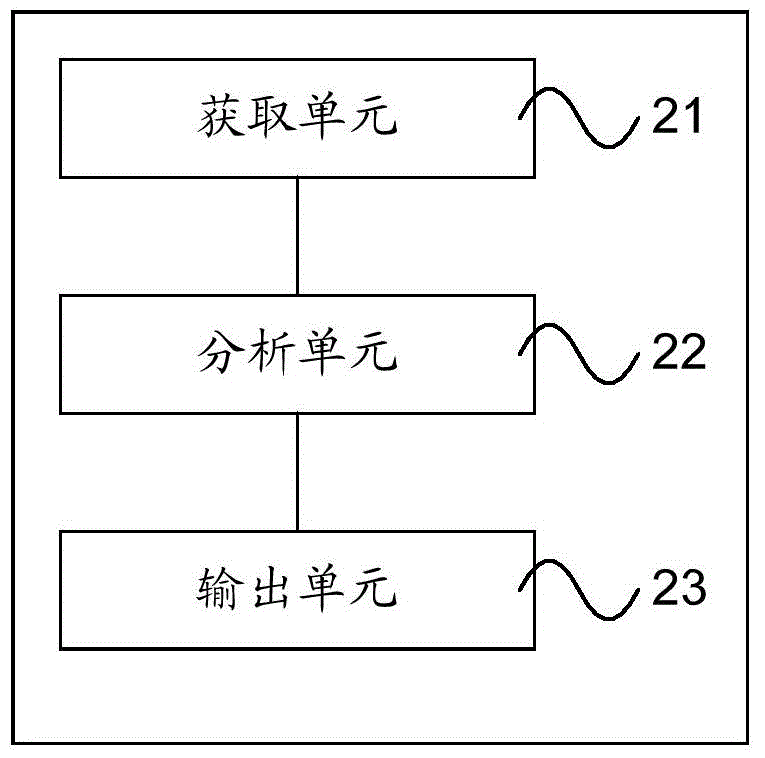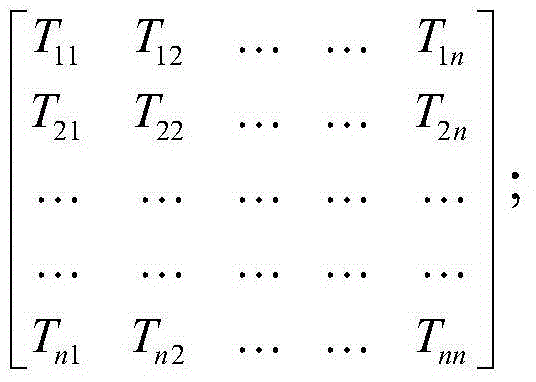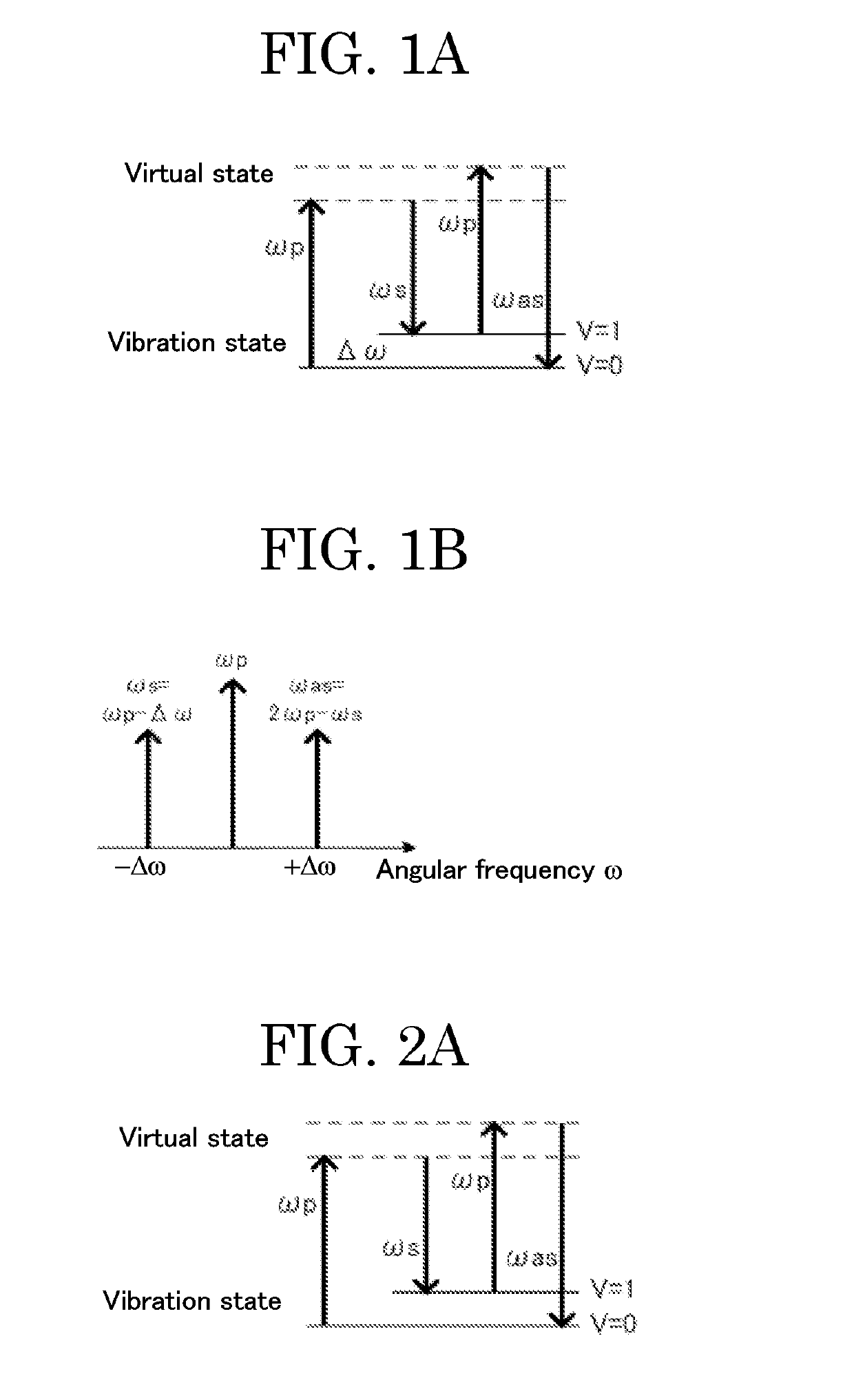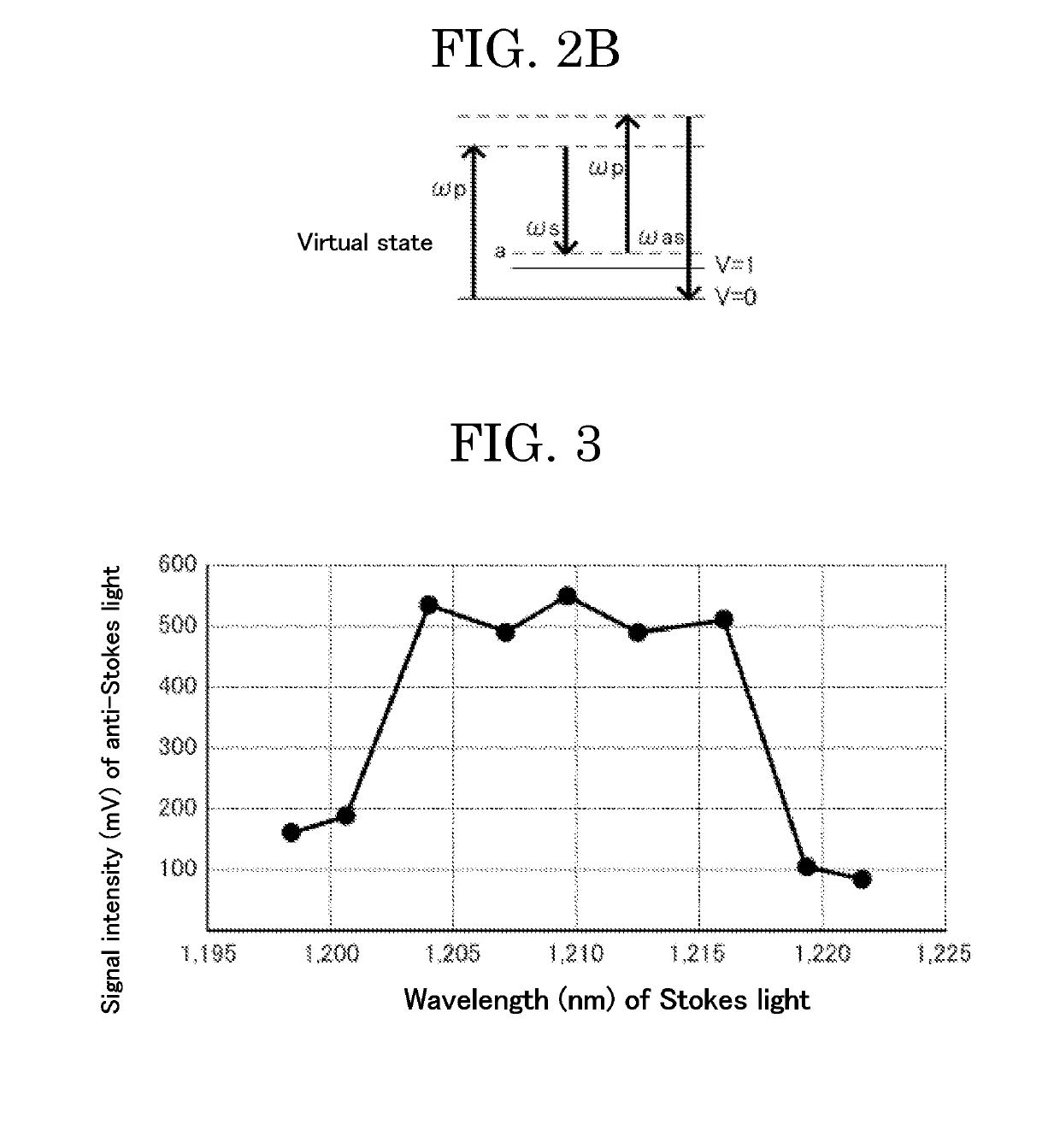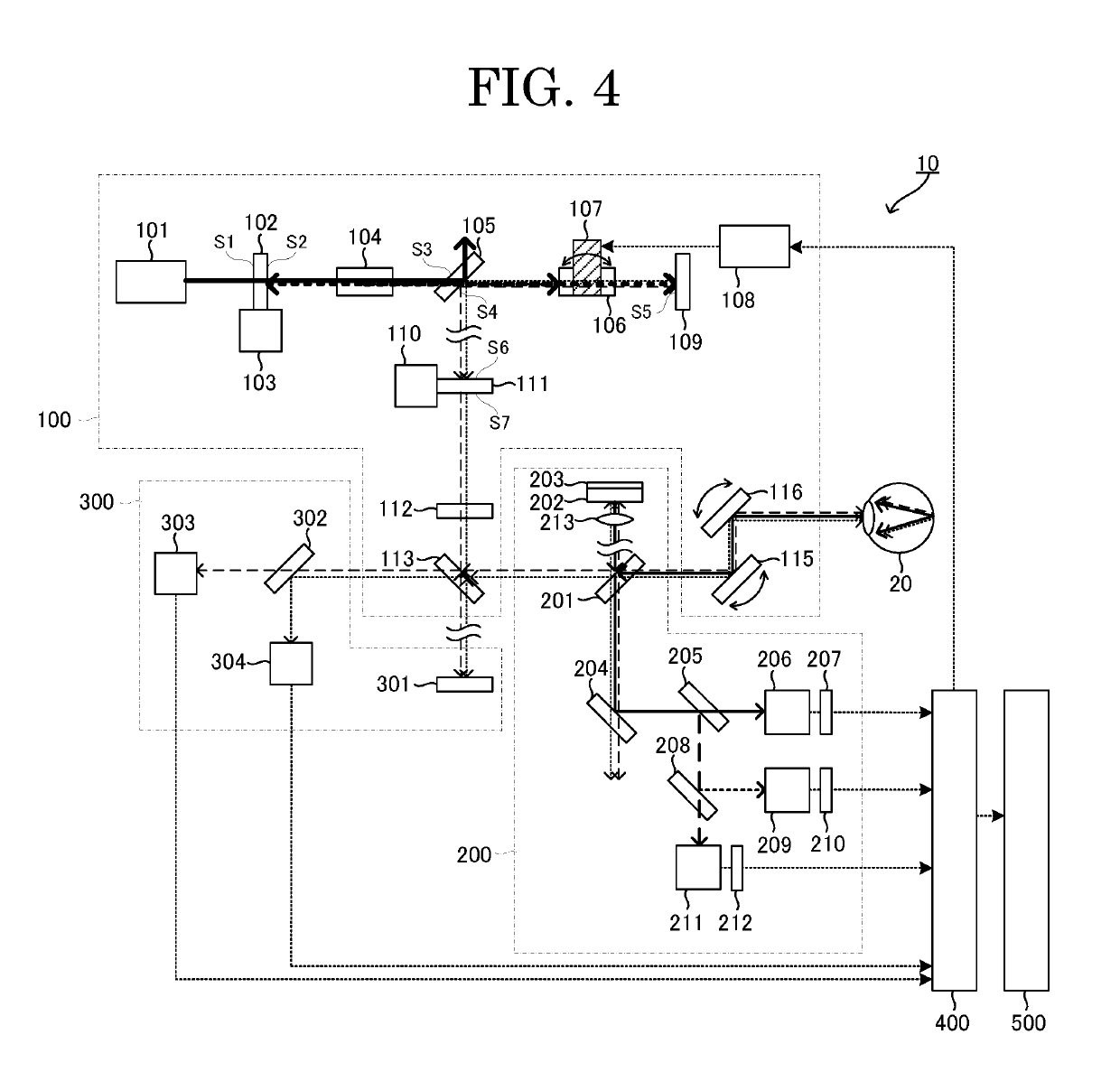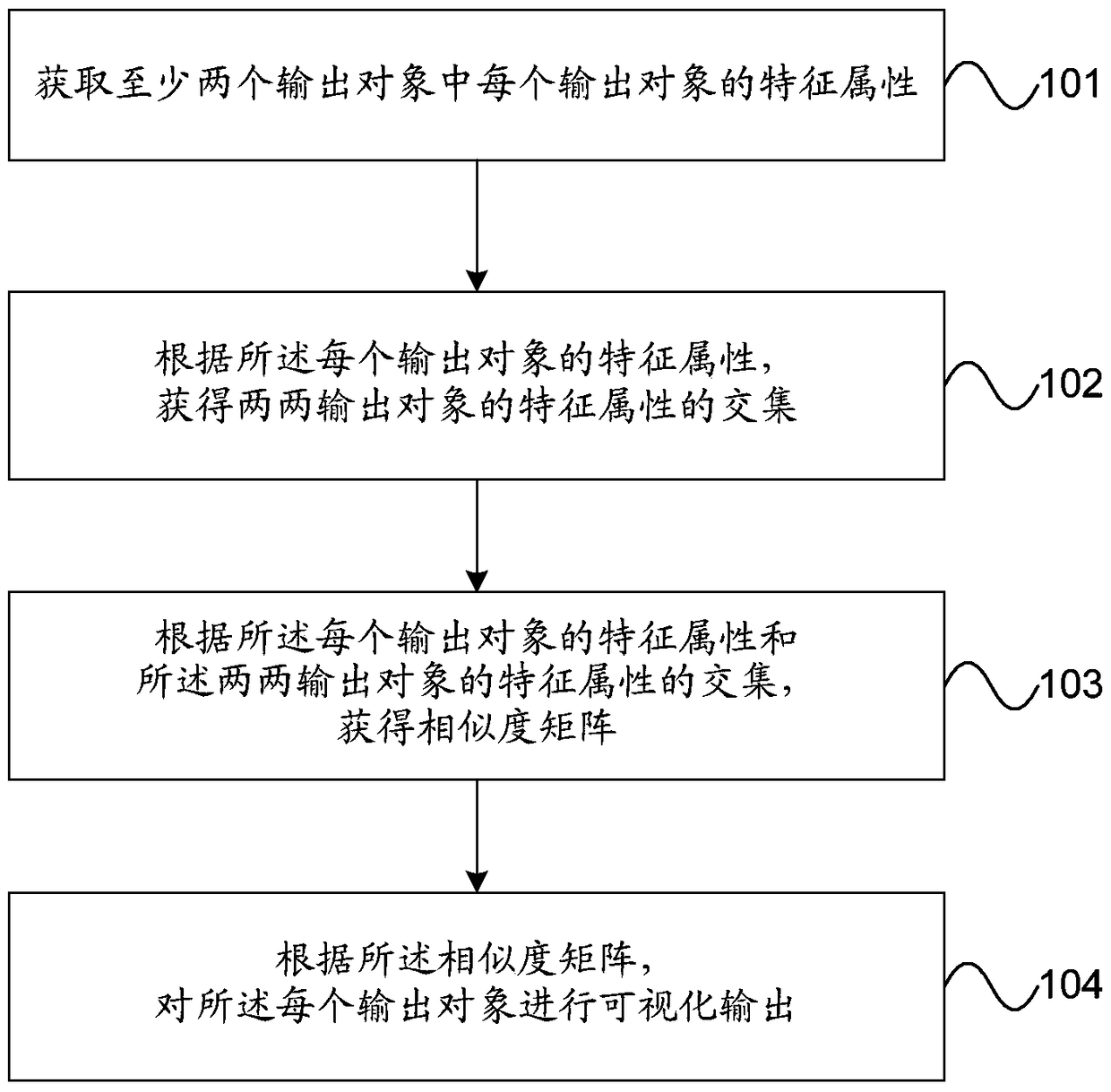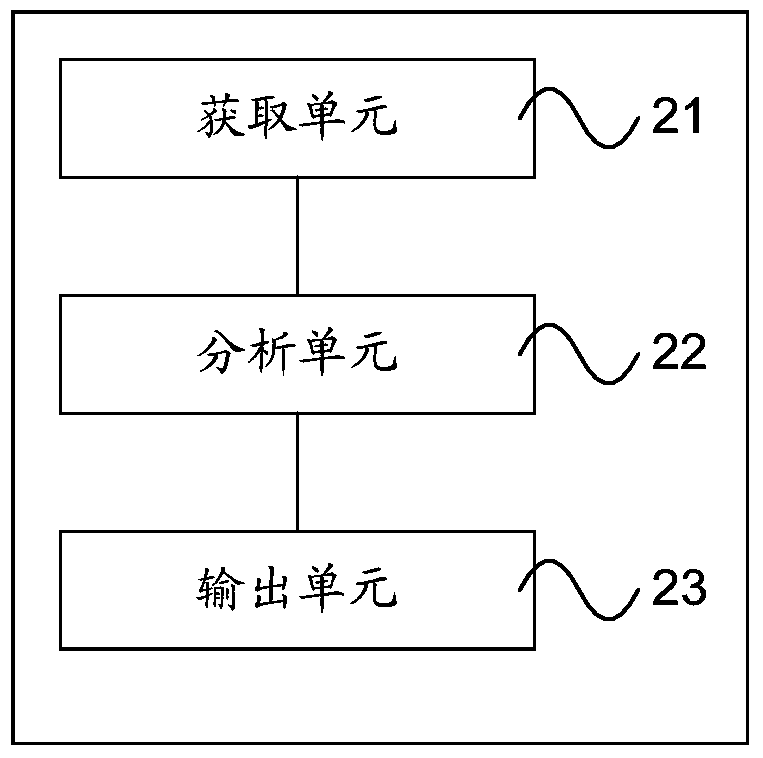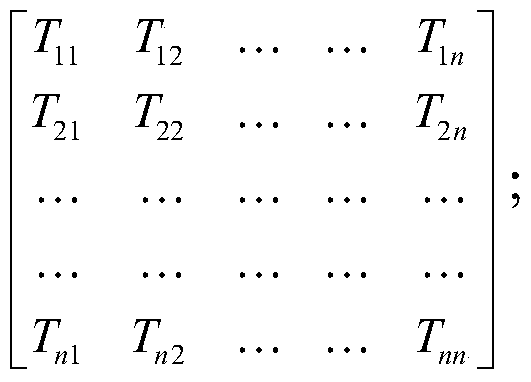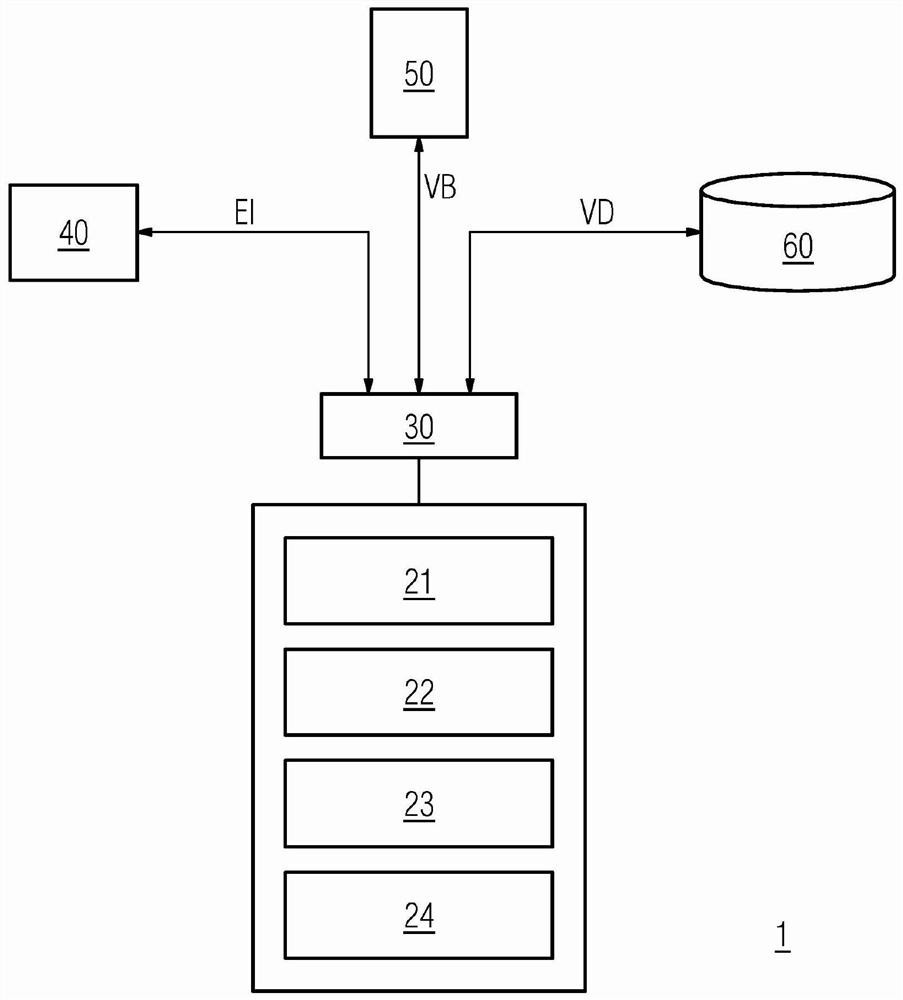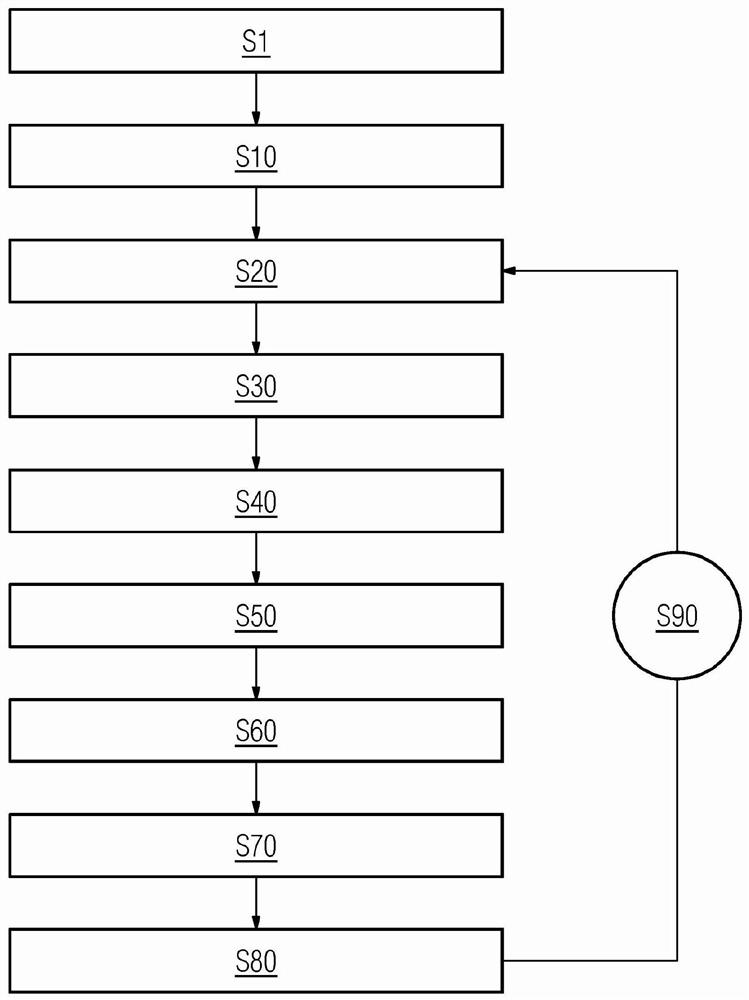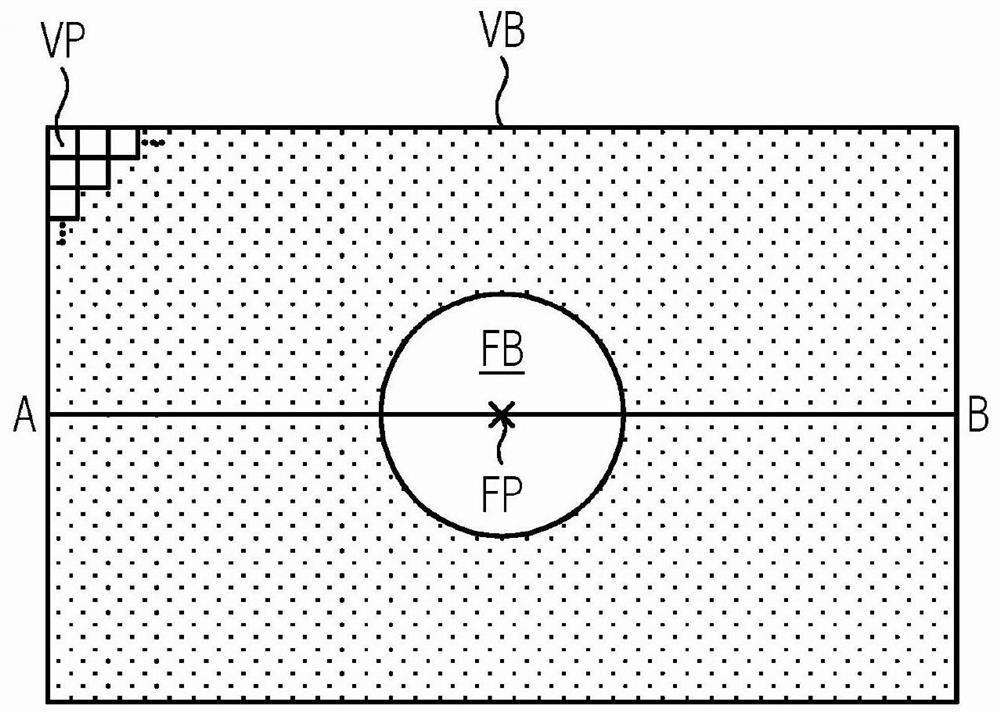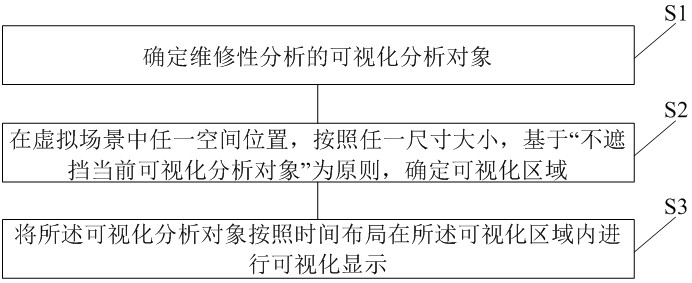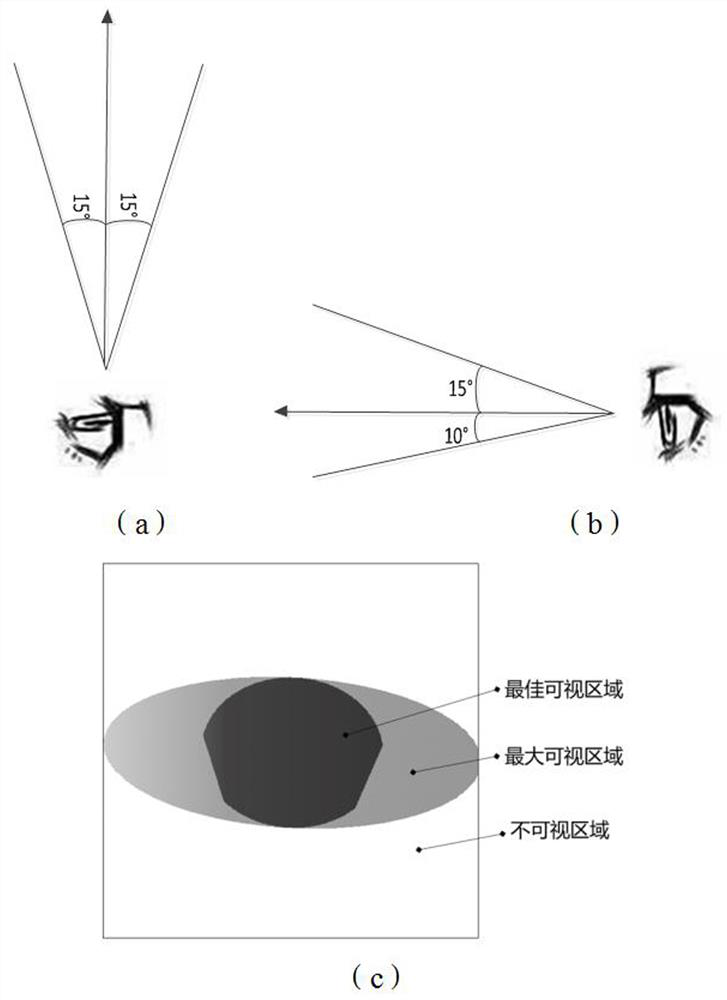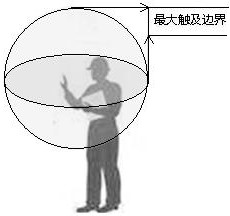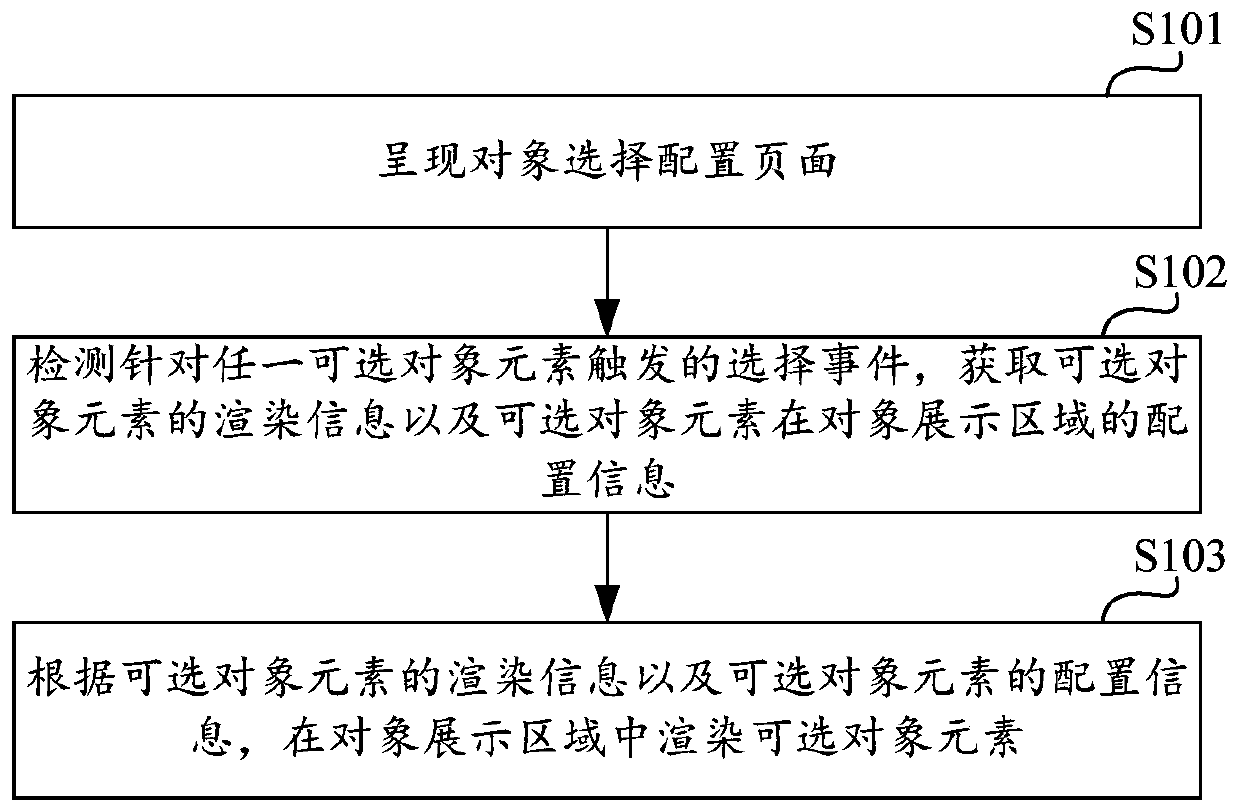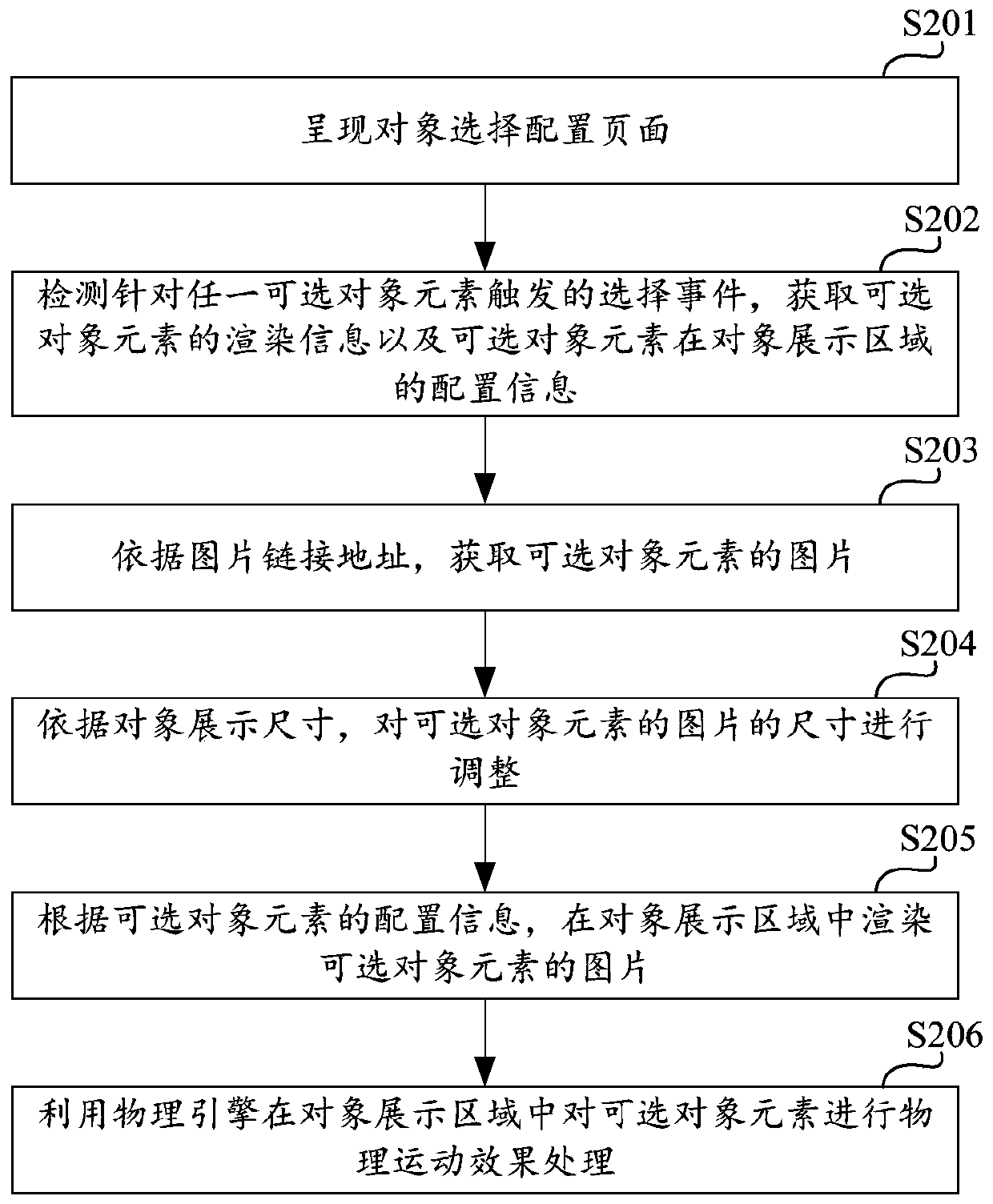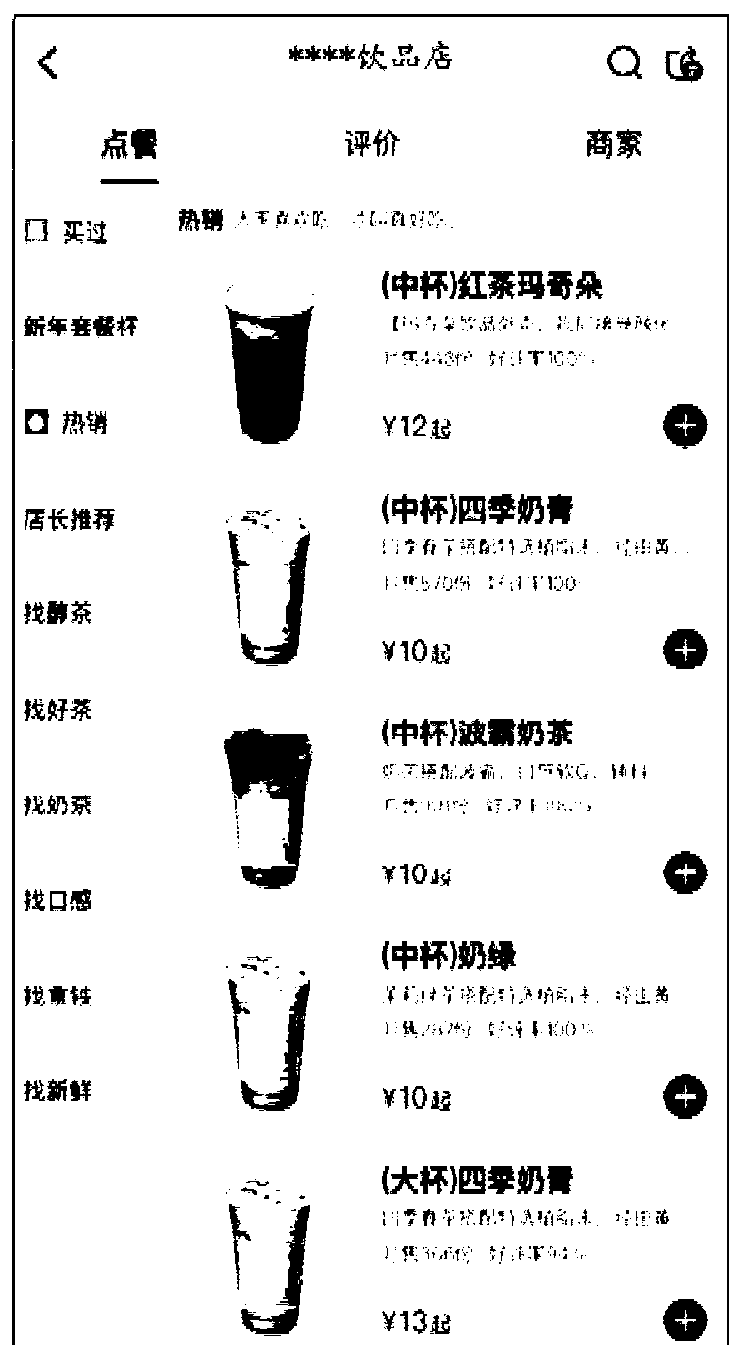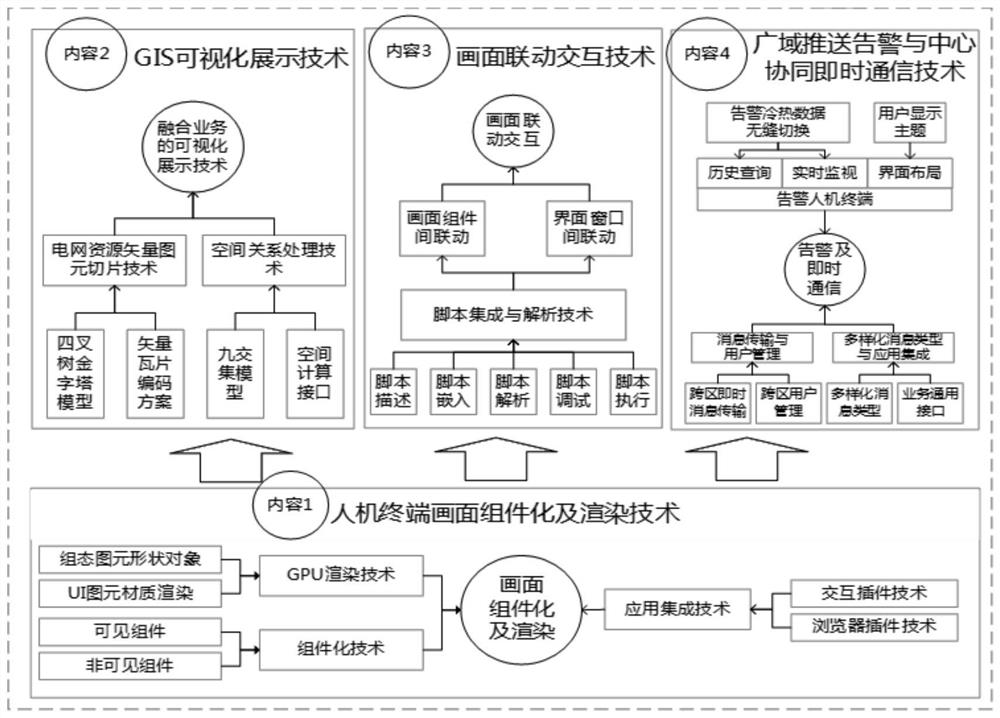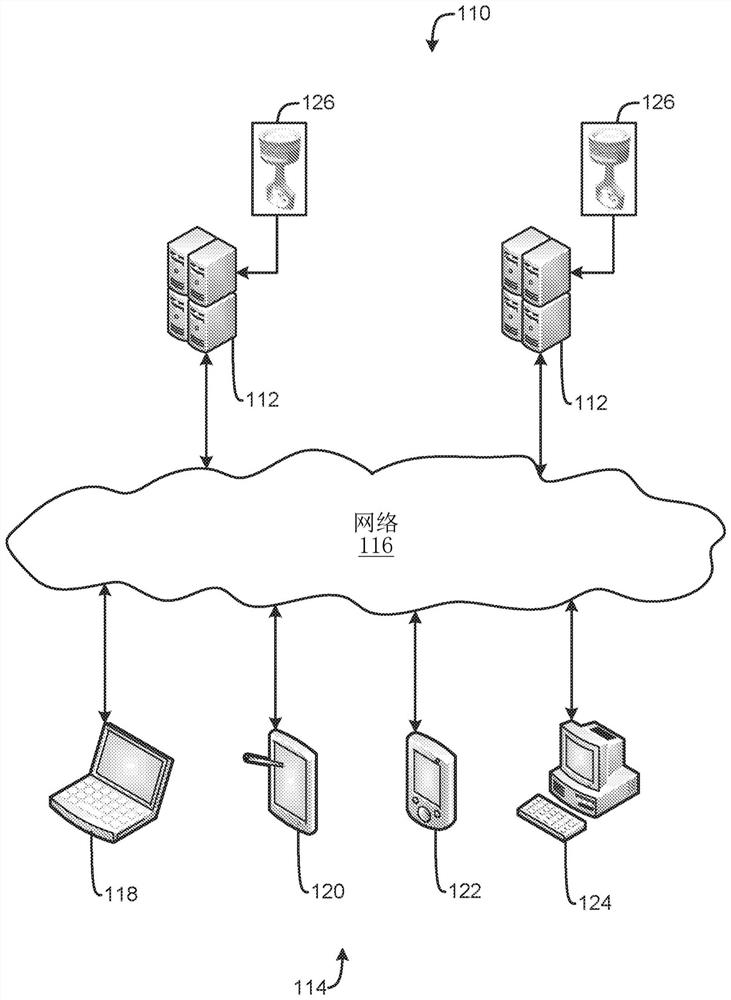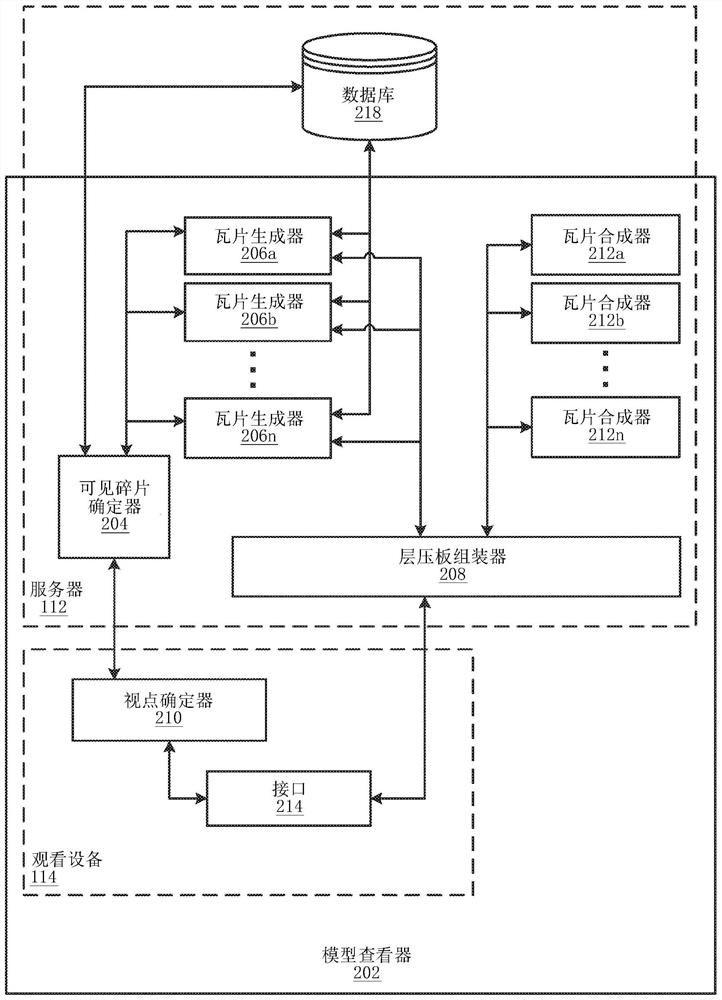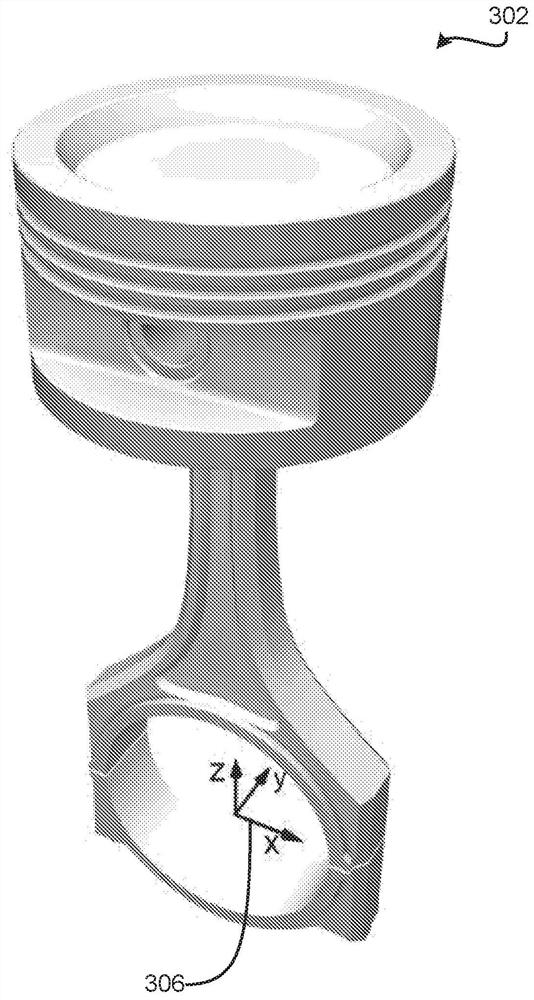Patents
Literature
36 results about "Object visualization" patented technology
Efficacy Topic
Property
Owner
Technical Advancement
Application Domain
Technology Topic
Technology Field Word
Patent Country/Region
Patent Type
Patent Status
Application Year
Inventor
Media frame object visualization system
ActiveUS7117453B2Facilitating browsing and clustering and sortingThe process is convenient and fastMetadata audio data retrievalData processing applicationsMetadata annotationNew media
The present invention provides a unique system and method for facilitating browsing, sorting, clustering, and filtering any number of media objects grouped together in a quick and easy manner. In particular, the invention involves annotating the media objects, which have been clustered, sorted, and / or filtered en masse rather than individually, with metadata. The media objects may be selected by a user and annotated with a plurality of metadata as desired by a user in order to optimize utilization of the media objects. The media objects may also be combined and / or mixed in any number of ways to create new media objects. Media objects may include an audio component, a visual component, a portion thereof, and / or any combination thereof.
Owner:MICROSOFT TECH LICENSING LLC
Media frame object visualization system
InactiveUS20060161867A1The process is convenient and fastRapid metadata annotationMetadata audio data retrievalData processing applicationsNew mediaMetadata
The present invention provides a unique system and method for facilitating browsing, sorting, clustering, and filtering any number of media objects grouped together in a quick and easy manner. In particular, the invention involves annotating the media objects, which have been clustered, sorted, and / or filtered en masse rather than individually, with metadata. The media objects may be selected by a user and annotated with a plurality of metadata as desired by a user in order to optimize utilization of the media objects. The media objects may also be combined and / or mixed in any number of ways to create new media objects. Media objects may include an audio component, a visual component, a portion thereof, and / or any combination thereof.
Owner:MICROSOFT TECH LICENSING LLC
Visualizing a complex network based on a set of objects of interest
A user interface of a device for displaying a representation of a network of objects wherein a plurality of selectable objects are rendered, and each of the plurality of selectable objects are rendered having a given positioning relative to each other of the plurality of selectable objects. One or more edges are rendered interconnecting the plurality of selectable objects within a first region of the user interface. A second region is rendered in response to one or more of the selectable objects of the first region being selected. Objects corresponding to the selected objects are depicted in the second region while maintaining the given relative positioning. A number of additional objects may be retrieved from a database that indicates objects that are adjoining the corresponding objects. The adjoining objects are positioned in the second region and are interconnected to the corresponding objects by one or more additional edges.
Owner:RIVERBED TECH LLC +1
Data object visualization
ActiveUS20070203867A1Knowledge representationSpecial data processing applicationsGraphicsData mining
A fact repository stores objects. Each object includes a collection of facts, where a fact comprises an attribute and a value. A set of objects from the fact repository are designated for analysis. The presentation engine presents the facts of the objects in a user interface (UI) having a table. Through manipulation of the UI, an end-user can add or remove facts from the table, and sort the table based on the values of particular facts. The presentation engine also presents the facts of the objects in a UI having a graph. Through manipulation of the UI, the end-user can add or remove facts from the graph, and can sort the facts shown in the graph based on values that are shown, or not shown, in the graph. The presentation engine can further present the facts of the objects in UIs including maps and timelines.
Owner:GOOGLE LLC
Object Visualization System
A method and apparatus for visually querying an aircraft. A model is identified for the aircraft. Sections of the aircraft are displayed in a graphical user interface on a display device. The sections correspond to sections as manufactured for assembly of the aircraft. The sections are selectable.
Owner:THE BOEING CO
Integration of User Interface Design and Model Driven Development
InactiveUS20090083697A1Easy to captureSimple working processModel driven codeSpecific program execution arrangementsModel driven developmentDisplay device
A system for creating a user interface is disclosed herein. The system comprises (a) a display for viewing a visual representation of the user interface being created, (b) a processor, (c) data storage, and (d) program code stored in the data storage and executable by the processor to (i) implement a UML model explorer that communicates with a model driven design tool to access one or more UML models, (ii) implement a rule-based object visual creation system that is operable to map UML elements to corresponding user interface objects, (iii) in response to input from a user, add corresponding user interface objects to the visual representation, and (iv) implement a model generator that is operable to generate a UML model based on the visual representation of the user interface, wherein the UML model can be executed to create an instance of the user interface on a display.
Owner:HONEYWELL INT INC
Data object visualization using graphs
InactiveUS20070185870A1Easy to understandData processing applicationsDigital data information retrievalGraphicsData mining
A presentation engine presents facts in a UI having a graph. Through manipulation of the UI, an end-user can add or remove facts from the graph, and can sort the facts shown in the graph based on values that are shown, or not shown, in the graph. The presentation engine determines a graph type that best facilitates interpretation of the facts by the end-user and automatically creates a graph of that type. Possible graph types include bar graphs, scatter plots, timelines, and maps.
Owner:GOOGLE LLC
Data object visualization
Owner:GOOGLE LLC
Feature emphasis and contextual cutaways for image visualization
InactiveUS20080167551A1Ultrasonic/sonic/infrasonic diagnosticsSurgical navigation systemsComputer graphics (images)Radiology
A method for visualizing one or more objects of interest within a volume of imaging data includes the steps of receiving a volume of imaging data and displaying the one or more objects of interest within the volume by adaptively changing the amount of information displayed from the volume based on (1) a viewing direction of the volume, (2) a position of the one or more objects of interest within the volume, and (3) importance values of materials within the volume.
Owner:SIEMENS MEDICAL SOLUTIONS USA INC
Data object visualization using maps
A fact repository stores objects. Each object includes a collection of facts, where a fact comprises an attribute and a value. A set of objects from the fact repository are designated for analysis. The presentation engine presents the facts of the objects in a user interface (UI) having a table. Through manipulation of the UI, an end-user can add or remove facts from the table, and sort the table based on the values of particular facts. The presentation engine also presents the facts of the objects in a UI having a graph. Through manipulation of the UI, the end-user can add or remove facts from the graph, and can sort the facts shown in the graph based on values that are shown, or not shown, in the graph. The presentation engine can further present the facts of the objects in UIs including maps and timelines.
Owner:GOOGLE LLC
Utilizing programming object visual representation for state reflection
InactiveUS6973649B1Multiprogramming arrangementsVisual/graphical programmingObject structureGraphics
A method and apparatus for utilizing graphical representations of programming objects to reflect the state of programming objects. State reflection is unique in that it reflects the state of programming objects at the time of programming, rather than during execution, in a visual programming language. The visual programming language comprises a set of graphic aspects which are associated with data element states via a set of graphic aspect references. Each programming object used in the visual programming language comprises a set of data elements. The programming objects may be related via super and subclass objects structures. The method detects when a data element has changed its state and reflects that state change in the visual representation of the programming objects and their respective graphic aspects. A list of graphic aspect references points to a number of graphic aspects which may or may not be applicable to the detected state change. All applicable graphic aspects are applied to the visual representation of the data element whose state has changed. As other data element state changes occur, the applicable graphical aspects are applied accordingly.
Owner:IBM CORP
Data object visualization using maps
A fact repository stores objects. Each object includes a collection of facts, where a fact comprises an attribute and a value. A set of objects from the fact repository are designated for analysis. The presentation engine presents the facts of the objects in a user interface (UI) having a table. Through manipulation of the UI, an end-user can add or remove facts from the table, and sort the table based on the values of particular facts. The presentation engine also presents the facts of the objects in a UI having a graph. Through manipulation of the UI, the end-user can add or remove facts from the graph, and can sort the facts shown in the graph based on values that are shown, or not shown, in the graph. The presentation engine can further present the facts of the objects in UIs including maps and timelines.
Owner:GOOGLE LLC
Apparatus and method for providing interactive content
InactiveUS20180322687A1Improve satisfactionMaximizes experienceInput/output for user-computer interactionImage enhancementObject basedViewpoints
Disclosed herein are an apparatus and method for providing interactive content. The apparatus for providing interactive content includes an object classification unit for classifying content to be output into a view-independent background and view-dependent objects, a viewpoint association unit for determining viewpoints of users who are to be interactively associated with respective view-dependent objects and interactively associating the viewpoints of the users with the view-dependent objects, a rendering unit for generating a background-visualized image by rendering the view-independent background with respect to a hot spot, and generating object-visualized images by rendering the view-dependent objects based on the viewpoints interactively associated with respective view-dependent objects, and an output unit for outputting the background-visualized image and the object-visualized images.
Owner:ELECTRONICS & TELECOMM RES INST
Vehicular lighting apparatus
A vehicular lighting apparatus is provided with: a detector configured to detect a movable body around a self-vehicle; a deteminator configured to determine whether or not the movable body is an object whose attention is to be called; and a projector configured to project predetermined visual information by using illumination light in a predetermined range around the object if it is determined by the determinator that the movable body is the object. The predetermined visual information includes first information to be presented to a driver of the self-vehicle and second information to be presented to the object. The predetermined visual information is visualized as the first information by the driver of the self-vehicle and is visualized as the second information by the object, depending on a viewpoint difference between the driver of the self-vehicle and the object.
Owner:TOYOTA JIDOSHA KK
Method, device and storage medium for controlling display of augmented reality display device
The present invention relates to a method, a device, and a computer readable storage medium with instructions, the method, the device, and the computer-readable storage medium with instructions for controlling a display of an augmented reality display device for a motor vehicle. In a first step, the presence of a driving situation is determined (11) in which an indication for a driver of the motorvehicle is to be displayed. Thereafter, a virtual object is generated for display by the augmented reality display device (12). The virtual object visualizes possible upcoming events, actions or dangerous situations. In this case, the virtual object has moving graphic elements that simulate a movement of the virtual object. The generated virtual object is finally output for display by the augmented reality display device (13).
Owner:VOLKSWAGEN AG
Infrared focal plane array and infrared thermal imaging system based on infrared focal plane array
ActiveCN110307905ARealize visualizationReduce difficultyPyrometry using electric radation detectorsGratingFocal Plane Arrays
The invention discloses an infrared focal plane array and an infrared thermal imaging system based on the infrared focal plane array, and belongs to the field of the infrared thermal imaging. The infrared focal plane array comprises a plurality of array units in periodical arrangement, each array unit comprises a substrate, an insulation support layer, a sub-wavelength grating structure and an infrared absorbing layer; the infrared thermal imaging system based on the infrared focal plane array comprises a wavelength conversion module, a read-out signal production module and an imaging displaymodule; a core element of the wavelength conversion module is the infrared focal plane array; the infrared radiation from a target is focused on the focal plane, the infrared image information of thetarget is converted into the temperature distribution information on the focal plane array; the read-out signal production module is used for producing linear polarization narrow-band near infrared ray and enabling the linear polarization narrow-band near infrared ray to enter the imaging display module after being reflected by the infrared focal plane array, thereby realizing target object visualization. The system disclosed by the invention realizes large-area array, high-pixel, low-cost and quick-response thermal imaging system design.
Owner:UNIV OF ELECTRONICS SCI & TECH OF CHINA
Systems and methods for performing segmentation and visualization of images
A method for visualizing an object of interest includes obtaining an image of an object of interest, automatically separating the image into tissue clusters, automatically selecting foreground clusters from the tissue clusters, automatically generating a contour based on the selected foreground clusters, and displaying an image of the object of interest including the foreground clusters and the contour. A system and non-transitory computer readable medium are also described herein.
Owner:GENERAL ELECTRIC CO
Business object representations and detail boxes display
The present invention relates to business object representations and detail boxes display. A reference point on a graphical user interface may be determined. The reference point may be represented by a plurality of coordinates. The graphical user interface may be divided into tile map entities. Information about the tile map entities may be stored into a cache. The stored information may include an origin and dimensions of each tile map entity, and the origin may be represented relative to the reference point. Information needed to position a business object visual representation may be retrieved from the cache. The business object visual representation may be drawn on the graphical user interface based on the retrieved information needed to position the business object visual representation.
Owner:SAP AG
Visual navigation of documents by object
A navigable view of objects (e.g. charts, tables, graphs, data sources, individual sheets of a workbook, . . .) that are obtained from one or more electronic object sources are displayed as graphical objects. The objects may be automatically / manually organized within the navigable display (e.g. by type, by sheet, by relationship, by data source, . . .). A user may navigate through the displayed objects. For example, a user may zoom in on an object to see a full screen version of the object. When zoomed in on an object, the navigable display may be panned (e.g. left, right, up or down) to see adjacent objects. From one object, the user may explore related elements using the same shared data (e.g. exploring a table object also shows a data source element). A user may also perform supported operations on the objects (e.g. sort / filter / drill down / drill up) that affect a display of the related objects.
Owner:MICROSOFT TECH LICENSING LLC
Visualizing a complex network based on a set of objects of interest
A user interface of a device for displaying a representation of a network of objects wherein a plurality of selectable objects are rendered, and each of the plurality of selectable objects are rendered having a given positioning relative to each other of the plurality of selectable objects. One or more edges are rendered interconnecting the plurality of selectable objects within a first region of the user interface. A second region is rendered in response to one or more of the selectable objects of the first region being selected. Objects corresponding to the selected objects are depicted in the second region while maintaining the given relative positioning. A number of additional objects may be retrieved from a database that indicates objects that are adjoining the corresponding objects. The adjoining objects are positioned in the second region and are interconnected to the corresponding objects by one or more additional edges.
Owner:RIVERBED TECH LLC +1
Data object visualization using graphs
ActiveUS20140320499A1Data processing applicationsDigital data information retrievalGraphicsData mining
A presentation engine presents facts in a UI having a graph. Through manipulation of the UI, an end-user can add or remove facts from the graph, and can sort the facts shown in the graph based on values that are shown, or not shown, in the graph. The presentation engine determines a graph type that best facilitates interpretation of the facts by the end-user and automatically creates a graph of that type. Possible graph types include bar graphs, scatter plots, timelines, and maps.
Owner:GOOGLE LLC
Data processing method and device for output objects
ActiveCN104951545AImprove reliabilityThe result is obviousWeb data indexingSpecial data processing applicationsPattern recognitionDependability
The invention provides a data processing method and device for output objects. According to the embodiment of the method, the characteristic attribute of each output object in at least two output objects is acquired, then an intersection set of every two output objects is obtained according to the characteristic attribute of each output object, a similarity matrix is obtained according to the characteristic attribute of each output object and the intersection set of every two output objects, and therefore each output object can be visually output according to the similarity matrix. Because the bidirectional relationship between every two output objects can be expressed through the similarity matrix obtained according to the characteristic attribute of each output object and the intersection set of every two output objects, the obtained similarity between every two output objects is the real similarity between the two output objects, and accordingly the reliability of visualization of the output objects is improved.
Owner:BAIDU ONLINE NETWORK TECH (BEIJIBG) CO LTD
Test object visualizing device
Provided is a test object visualizing device, including: light irradiating unit configured to make wavelength of at least any one of pump light and Stokes light generated on the same optical path variable per test position of test object, and irradiate test object with pump light and Stokes light; molecule distribution image generating unit configured to detect anti-Stokes light emitted from test object according to wavelength difference between pump light and Stokes light, and generate a molecule distribution image based on anti-Stokes light; tomographic image generating unit configured to detect at least any one of reflected light from test object when irradiated with pump light and reflected light from test object when irradiated with Stokes light, and generate a tomographic image of test object based on the reflected light detected; and image display unit configured to display at least any one of molecule distribution image and tomographic image generated.
Owner:SAITAMA MEDICAL UNIVERSITY
Data processing method and device for output object
ActiveCN104951545BImprove reliabilityThe result is obviousSpecial data processing applicationsPattern recognitionObject visualization
A data processing method, device and apparatus for an output object and a non-volatile computer storage medium. The method comprises: acquiring a feature property of each of at least two output objects (101); then acquiring, according to the feature property of each output object, the intersection of each pair of the output objects (102); acquiring, according to the feature property of each output object and the intersection of each pair of the output objects, a similarity matrix (103); and thereby, performing, according to the similarity matrix, visualized output for each output object (104). A bidirectional relationship between each pair of output objects can be represented by a similarity matrix obtained according to a feature property of each output object and the intersection of each pair of the output objects, and therefore obtained similarities between all pairs of the output objects are the real similarities of the pairs of the output objects, thus improving the reliability of visualization of the output objects.
Owner:BAIDU ONLINE NETWORK TECH (BEIJIBG) CO LTD
Method and device for visualization of three-dimensional objects
PendingCN114092626AImage enhancementNeural architecturesPattern recognitionComputer graphics (images)
A computer-implemented method is for visualization of a three-dimensional object represented by volume data (VD) for a user in the form of a two-dimensional visualization image (VB) including a plurality of visualization pixels (VP). The method includes: providing an image synthesis algorithm designed for visualization of the three-dimensional object by mapping the volume data onto the visualization pixels; detecting an instantaneous viewing direction of the user; determining a focus area (FB) defined as a region of the visualization image, upon which the user focuses based upon the instantaneous viewing direction; adjusting the image synthesis algorithm such that the computing effort required for the mapping for visualization pixels outside of the focus area is lower than for visualization pixels inside of the focus area; and mapping volume data onto the visualization pixels with the adjusted image synthesis algorithm.
Owner:SIEMENS HEALTHCARE GMBH
Maintainability analysis visual display method and system
ActiveCN112667185AImprove experienceVisualization shows real-time synchronizationImage data processingDigital output to display deviceReal time analysisComputer vision
The invention provides a maintainability analysis visual display method and system. The maintainability analysis visual display method comprises the steps: determining a maintainability analysis visual analysis object, wherein the visual analysis object comprises a product body, a maintainability factor real-time analysis process, a maintainability weak link and maintainability improvement suggestions; determining a visual area at any spatial position in the virtual scene according to any size based on the principle of not shielding the current visual analysis object; and finally, visually displaying the visual analysis object in the visual area according to the time layout. The maintainability analysis is synchronously and visually displayed in real time, so that the whole process is displayed more visually, and the user experience is further improved.
Owner:郑州水石信息科技有限公司
Method, device and storage medium for controlling display of augmented reality display device
The invention relates to a method, a device and a computer-readable storage medium with instructions for controlling a A display of an augmented reality display device. In a first step, it is determined ( 11 ) that a driving situation exists in which an indication is to be displayed to the driver of the motor vehicle. A virtual object displayed by the augmented reality display device is then generated (12). Events, actions or dangerous situations that may be faced are visualized through the virtual objects. The virtual object has moving graphic elements which simulate the movement of the virtual object. The generated virtual object is finally output (13) to be displayed by an augmented reality display device.
Owner:VOLKSWAGEN AG
Object visualization processing method and device
ActiveCN111506372AGood choiceShorten the timeExecution for user interfacesPattern recognitionComputer graphics (images)
The invention discloses an object visualization processing method and device, and the method comprises the steps: presenting an object selection configuration page which comprises an object display region and at least one selectable object element; detecting a selection event triggered for any selectable object element, and obtaining rendering information of the selectable object element and configuration information of the selectable object element in the object display area; and rendering the selectable object elements in the object display area according to the rendering information of theselectable object elements and the configuration information of the selectable object elements. According to the technical scheme provided by the invention, the selectable object elements to be addedcan be conveniently displayed in the corresponding areas in a picture visualization manner in real time according to the rendering information and the configuration information, so that the display effect is optimized, and a user can visually determine the final selection result through the picture.
Owner:KOUBEI SHANGHAI INFORMATION TECH CO LTD
Lightweight man-machine interaction terminal system
PendingCN114579226ARealize linkage interactionAchieve acquisitionData processing applicationsStill image data browsing/visualisationMan machineEngineering
The invention discloses a lightweight man-machine interaction terminal system, which overcomes the defects in the prior art, and comprises a lightweight man-machine terminal picture component rendering module, which is used for converting basic primitives and electrical primitives into shape objects; the GIS visual display module is used for drawing point, line and surface primitive layers, expanding styles and opening interfaces; the man-machine terminal picture linkage module is used for integrating and analyzing picture scripts; the wide area push alarm analysis module is used for analyzing and processing the acquired information; the lightweight man-machine terminal picture component rendering module is connected with the GIS visual display module, the man-machine terminal picture linkage module and the wide-area push alarm analysis module at the same time, and the GIS visual display module, the man-machine terminal picture linkage module and the wide-area push alarm analysis module are connected with the interaction client.
Owner:NINGBO POWER SUPPLY COMPANY STATE GRID ZHEJIANG ELECTRIC POWER +1
Methods and apparatus to facilitate 3D object visualization and manipulation across multiple devices
PendingCN111937039AImage analysisGeometric image transformationComputer graphics (images)Engineering
Methods and apparatus to facilitate 3D object visualization and manipulation across multiple devices are disclosed. Example apparatus disclosed herein include a viewpoint determiner, a visible shard determiner, and a laminate assembler. The viewpoint determiner determines a viewpoint location of a viewpoint corresponding to a viewing device, the viewpoint location being in a reference frame of a three-dimensional (3D) model. The visible shard determiner determines a visible shard set of the 3D model based on the viewpoint location. The laminate assembler generates a two-dimensional (2D) imageof the visible shard set.
Owner:베르텍스소프트웨어엘엘씨
Features
- R&D
- Intellectual Property
- Life Sciences
- Materials
- Tech Scout
Why Patsnap Eureka
- Unparalleled Data Quality
- Higher Quality Content
- 60% Fewer Hallucinations
Social media
Patsnap Eureka Blog
Learn More Browse by: Latest US Patents, China's latest patents, Technical Efficacy Thesaurus, Application Domain, Technology Topic, Popular Technical Reports.
© 2025 PatSnap. All rights reserved.Legal|Privacy policy|Modern Slavery Act Transparency Statement|Sitemap|About US| Contact US: help@patsnap.com
